EXPLORING INTERESTS
IN PASSION POWER HOUR
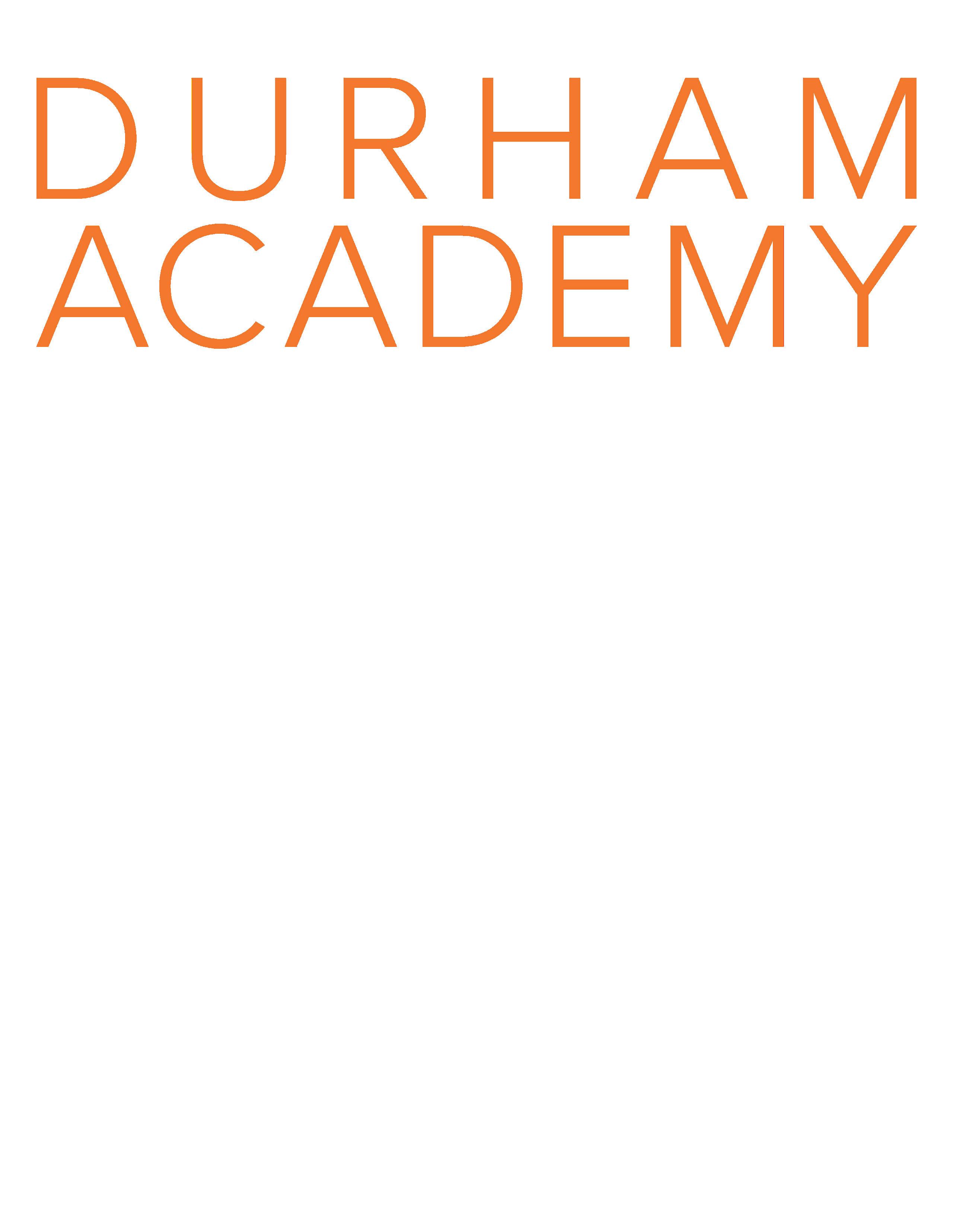

Scan to see the latest progress on the Middle School Gateway Center construction.



EXPLORING INTERESTS
IN PASSION POWER HOUR


Scan to see the latest progress on the Middle School Gateway Center construction.


Facebook: facebook.com/DurhamAcademy
Alumni on Facebook: facebook.com/DACavsAlumni
Twitter: twitter.com/DurhamAcademy
Alumni on Twitter: twitter.com/DurhamAcademyAl
Vimeo: bit.ly/DAcavsvimeo
LinkedIn: bit.ly/LinkedInDAAlumni
Instagram: instagram.com/DurhamAcademy
Alumni on Instagram: instagram.com/DACavsAlumni
SmugMug: url.da.org/smugmug



View the magazine online at da.org/magazine
The Durham Academy App is available in the Apple App Store.
14 — RESISTING A RETURN TO ‘NORMAL,’ SENIORS ARE READY TO LIGHT THE WORLD AFIRE
Commencement speaker Gabriel Bump urged the Class of 2022 to nurture the friendships that will support them in times both good and tough.
Helping Chart the Course:
24 — STUDENTS HELP SHAPE DA’S STRATEGIC VISION
Pre-kindergartners’ to seniors’ feedback has been immediately incorporated into the process to chart the course of Durham Academy.
Through the Passion Power Hour program, second-graders are given the freedom and support to design projects based on topics that interest them.
34 — THINKING OUTSIDE THE BOX, WITH THE FUNDS TO BACK IT UP
The use of augmented reality for world language students and a more intentional structure for environmental sustainability were among the first grants approved by the new Innovation Journey Fund.
36 — INDEPENDENT STUDIES: A WORLD OF POSSIBILITIES
Participation in the Independent Learning Program has increased exponentially in the last couple of years, as students explore interests in everything from the art of conducting to helping classmates with learning differences.
40 — PARENT AFFINITY GROUPS CREATE COMMUNITY AND CONNECTION
Groups create spaces for caregivers to get to know others with a shared religion, race, ethnicity or family makeup, or whose children have shared experiences.

On the Cover: Eric, a student in Ann Laros’ second-grade class, puts the finishing touches on his Passion Power Hour project, a model Tesla made of cardboard. As part of his project, Eric learned how real-life electric cars work. Learn more about Passion Power Hour on page 26.
Moral, Happy, Productive
8 — KENNEDY TURNER ’23
She’s shining a spotlight on some of Durham Academy’s unsung heroes.
Faculty Spotlight: Upper School English Teacher
12 — DR. LAUREN GARRETT
Storytelling and imagination have been integral to her life from the start.
18 — 15 SENIORS COMMIT TO COLLEGE ATHLETICS
DA student-athletes will compete at the Division I and III levels in baseball, cross-country, field hockey, lacrosse, soccer, track and field, and volleyball.
Little Bodies, Big Feelings
32 — NEW PRESCHOOL COUNSELOR HELPS STUDENTS, TEACHERS AND PARENTS
Dr. Megan Klenk is a dedicated resource for social emotional learning.
42 — THE MAGIC OF ‘IN REAL LIFE’
Beloved activities and traditions — put on pause due to COVID-19 — are returning.
46 — DARC SIDE ROBOTICS TEAM RETURNS TO COMPETITION
With the program on pause for two years, most Upper School students who built this year’s robot were new to the process.
Uniquely Knowing and Applauding Each Student
48 — TEACHERS’ LETTER-WRITING TO EIGHTH-GRADERS HAS BECOME A CHERISHED TRADITION
Faculty members have written personal notes to each member of the class for the last nine years.
52 — LEARNING SPECIALIST DR. CINDY MOORE IS HONORED WITH DISTINGUISHED FACULTY AWARD
She is known as one of students’ most enthusiastic cheerleaders.
59 — AT LAST: TOGETHER ONCE AGAIN
Alumni Spotlight
62 — TARA NAGAR ’14
64 — ALUMNI GATHER TO CELEBRATE
DR. BRADLEY HARDY ’98 AND RANDY BAKER
66 — REFLECTIONS ON 43 YEARS IN GREEN AND WHITE
Alumni Spotlight
68 — DR. KAMERON KOOSHESH ’12
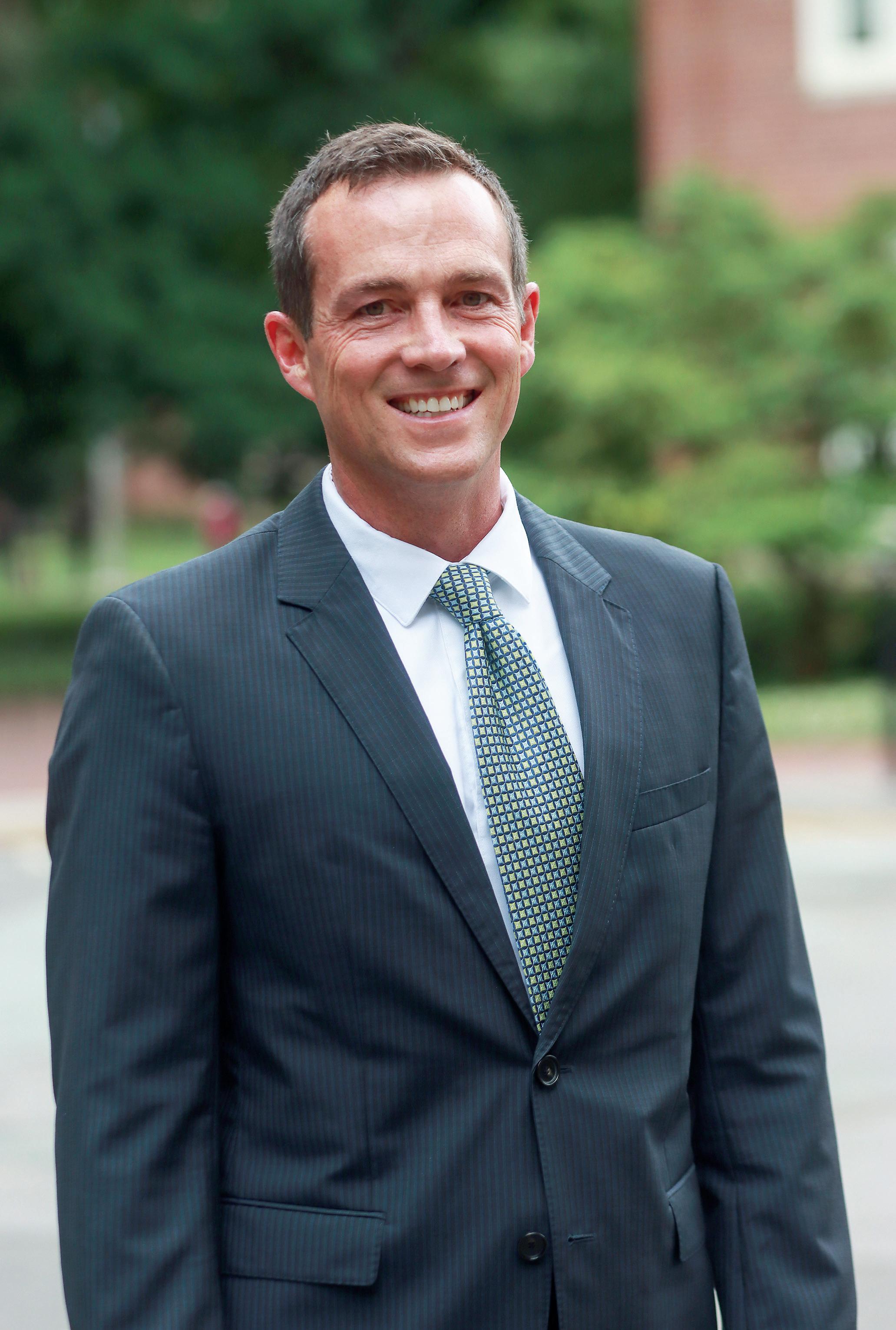
by
The past three years have provided the ultimate strategic exercise throwing our assumptions into the air, forcing us to answer old questions in new ways, emboldening us to jettison useless habits, and revealing our deepest values and aspirations.
We have not yet conquered COVID-19. We have, however, reclaimed the habits that matter most to us, restored the rituals that nourish our community and reinvented all kinds of programs and processes this year.
We have also valued our campus more dearly than ever. A roaring crowd in the CavDome, bursts of giggles at a Middle School dance, children singing at Grandfriends Day, waves of laughter from the audience at the winter musical these are the sounds we’ve relished this year among the many pleasures of belonging, among the many treasures of a place-based community that we’ll never again take for granted.
In similar ways, we’ve recognized just how much our missional roots matter. Since 1933, our school has expected extraordinary intellectual growth. Since 1970, Durham Academy’s mission statement has compelled us to prepare students to live moral, happy, productive lives. In the years before our safety, health and wellness were so broadly threatened and stressed, happiness may have seemed more like pretty ornamentation and less like a fundamental building block of student learning and human thriving. Now, we know better.
Now, we are working with unprecedented focus on understanding, tracking and nurturing happiness in our students and community. This effort has been accelerated by our participation in the “Design for Community Problem Solving” workshop offered by the Stanford University School of Design’s K12 Lab. In and beyond this workshop, teams of DA teachers are identifying better ways to prepare students for life, to meet the needs of each individual learner, and to help every single community member feel welcomed, empowered, responsible and safe. Thanks to a series of surveys, feedback sessions and focus groups, we now have clear baselines and deep foundational data about who our students are, what drives and impedes their learning and happiness, and how they hope to learn in the future. All this has helped us move from strategic vision to strategic action this year. In this magazine, you’ll find dozens of specific examples.
As a former English teacher and unreformed etymology geek, I love that the word strategy comes from the ProtoIndo-European roots ster- (to spread) and ag- (to drive, draw out or forth, to move). Among the other etymological descendants of those roots are stretch, construction, active and agile. Each of those words are salient and timely as we stretch our students, construct new Middle and Upper School campuses, and activate our curriculum with more agile innovations.
It’s easy to forget that Durham Academy has always been an innovative school. Teaching Spanish from Preschool forward; creating a Technology, Engineering and Design Lab in the Lower School; launching a Middle School STEAM by Design course (years before most people knew what a makerspace was); sustaining the Upper School’s partnership with Special Olympics; and the iconic Senior Challenge all these were once unproven, unconventional, disruptive innovations. Now they are part of the soil of DA.
And now we are seeding, watering and harvesting the most strategic, student-centered, mission-aligned innovations we can think of. At the same time, we are also weeding out less effective ideas, habits and lessons. While this process of creative destruction is not natural for us educators (we chose this profession to protect and preserve the lessons of the past while nurturing and supporting every single student), we are getting better at distinguishing what is core and what is extraneous. We are gaining momentum as we discern what matters most to the moral, happy, productive futures of our students.
These words from novelist Arundhati Roy offer a useful perspective on the effects and opportunities of the pandemic:
“Historically, pandemics have forced humans to break with the past and imagine their world anew. This one is no different. It is a portal, a gateway between one world and the next. We can choose to walk through it, dragging the carcasses of our prejudice and hatred, our avarice, our data banks and dead ideas, our dead rivers and smoky skies behind us. Or we can walk through lightly, with little luggage, ready to imagine another world.”
Thank you for walking with us through this portal going healthily back to school, staying happily rooted in our mission and moving strategically forward to the future.
Michael Ulku-Steiner Head of School @MrUlkuSteiner
The list of scholarships earned by members of Durham Academy’s Class of 2022 is long, including several all-expenses-covered awards.
• Maya Caldwell ’22 has been named a John B. Ervin Scholar at Washington University in St. Louis, which comes with an annually renewable full-tuition scholarship and $2,500 stipend.
• Mukta Dharmapurikar ’22 is among 150 Coca-Cola Scholars selected nationwide from an initial pool of more than 68,000 applicants. Dharmapurikar will apply the $20,000 scholarship to her studies at Harvard University.
• Molly Hunter ’22 has been selected for the Forty Acres Scholarship Program, the premier full-ride, merit-based scholarship for the University of Texas at Austin.
• Mirella Kades ’22 has been selected for the Stamps President’s Scholarship at the Georgia Institute of Technology. Covering the entire cost of attendance for four years, it is the top undergraduate scholarship offered at Georgia Tech.
• Charles McCain ’22 was awarded the Morehead-Cain Scholarship, which covers all expenses for four years of undergraduate study at UNC-Chapel Hill, as well as a distinctive program of summer enrichment experiences.
• Zoe Sinclair ’22 is the recipient of a Light on the Hill Society Scholarship at UNC-Chapel Hill. Four $2,000 Light on the Hill scholarships are awarded each year, and they are renewable for up to three years.
Senior Avery Davidson, who played the role of Orsino in Durham Academy Upper School’s winter musical production of Twelfth Night, was among 20 area high schoolers selected as finalists in the best actress and actor category of the 2022 Triangle Rising Stars Awards. The program, which is open to central North Carolina high schoolers, serves as the qualifying competition for the National High School Musical Theatre Awards (the Jimmy Awards), each summer in New York City. Davidson and the other Triangle Rising Stars finalists performed onstage at the Durham Performing Arts Center on May 11 in a showcase event. Jordan High School’s production of Bright Star won awards for both Best Student Orchestra and Best Musical — which was meaningful for Davidson, who as an aspiring conductor, conducted the Jordan orchestra when judges were present (learn more about Davidson’s independent study on conducting on page 38).
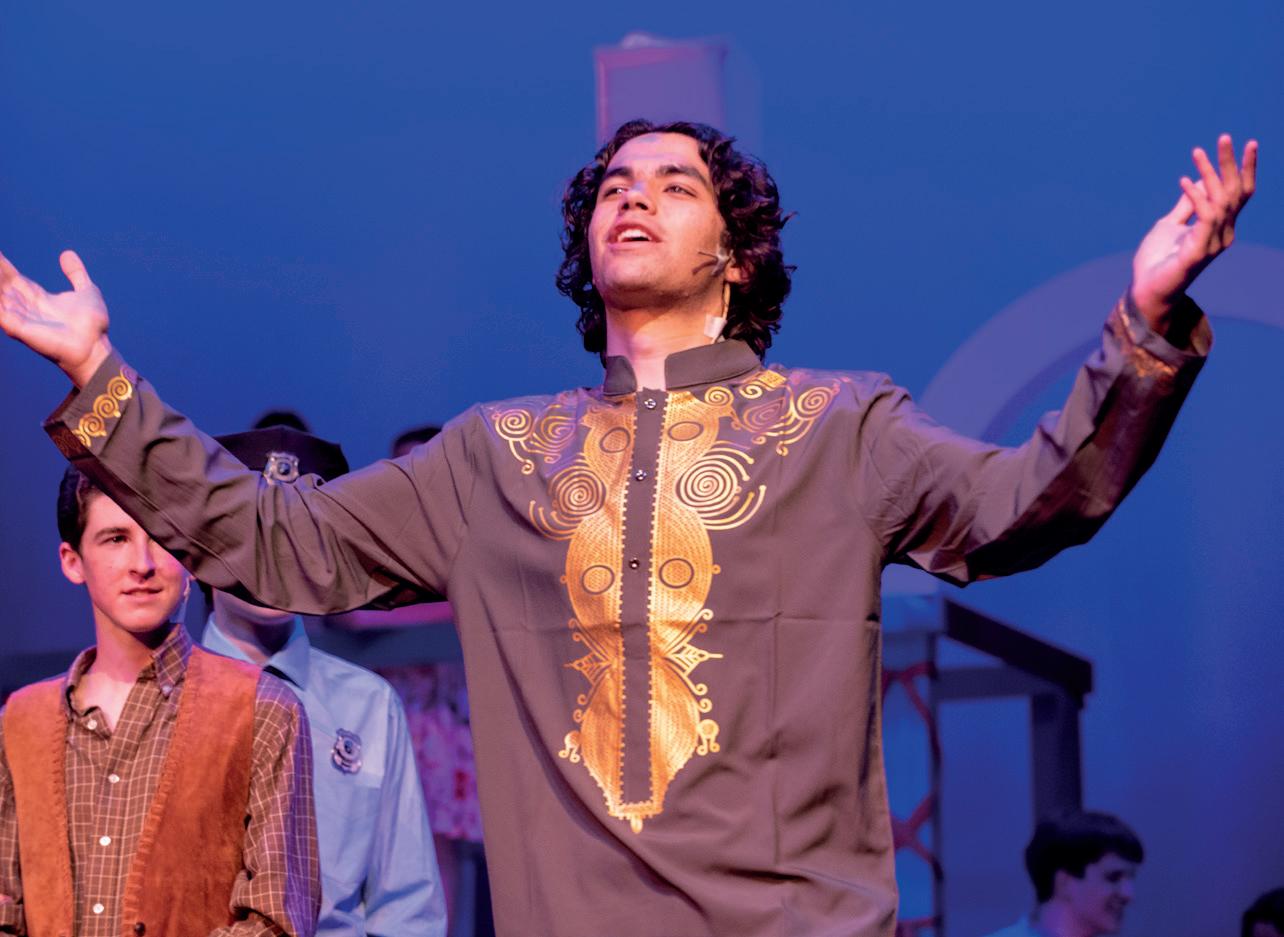

Asha Kumar ’25 placed first in the 2022 Kasparov Chess Foundation All-Girls National Championships in Chicago in April, competing in the 16-and-under category. Meanwhile, her sister, Arya Kumar ’23, tied for fifth in the 18-and-under category.
“The likelihood of having two sisters on board one in the last round of a national championship event is remote, to say the least,” said Durham Academy chess coach Craig Jones. Arya is the highest ranked female chess player in North Carolina history, and reached that feat by the age of 13 years and 4 months.
“Asha is a brilliant technician, meaning she can transfer one type of situation into another similar but different situation, which is very difficult to do, and few master this level of thinking,” Jones said.
Both Arya and Asha Kumar have been invited to represent the United States at the 2022 World Youth Chess Championships, scheduled for Sept. 15–18 in Mamaia, Romania. The sisters earned this honor by meeting the peak post-tournament rating and activity criteria in the girls under-18 and -16 divisions, respectively. Of the 160 youth players selected from across the U.S., Arya and Asha are two of three from North Carolina.

Durham Academy speech and debate coach Crawford Leavoy was named the 2022 Mildred Hussey Coach of the Year at the Tarheel Forensic League State Championship tournament in April.
This award is presented annually to a coach selected by their peers for their outstanding work both with their own team and in the greater North Carolina speech and debate community. This is the third Hussey Award for Leavoy, who previously won in 2018 and 2020. He joins only three other coaches in the history of North Carolina who have been recognized three times as Coach of the Year.
Leavoy was also recognized this year with the Jenny Cook Mentorship Award at NSU University School's Sunvitational tournament. This award is given to two deserving speech and debate coaches who dedicate countless hours to mentorship.
“I never set out to be a mentor to others, and I [am] certainly still shocked that some folks see me that way. …” Leavoy said. “I'm honored to be thought of as a mentor.”
Junior Ella Simmons ’23, a member of Durham Academy Upper School’s DARC SIDE robotics team, was named one of two area FIRST Dean’s List Finalists for robotics. FIRST (For Inspiration and Recognition of Science and Technology) is the leading, not-for-profit STEM engagement program for students worldwide. Similar to the National Merit Scholarship Award, the FIRST awards recognize student leaders who have led their teams to increase awareness for FIRST and its mission, and achieved personal technical expertise and accomplishment.

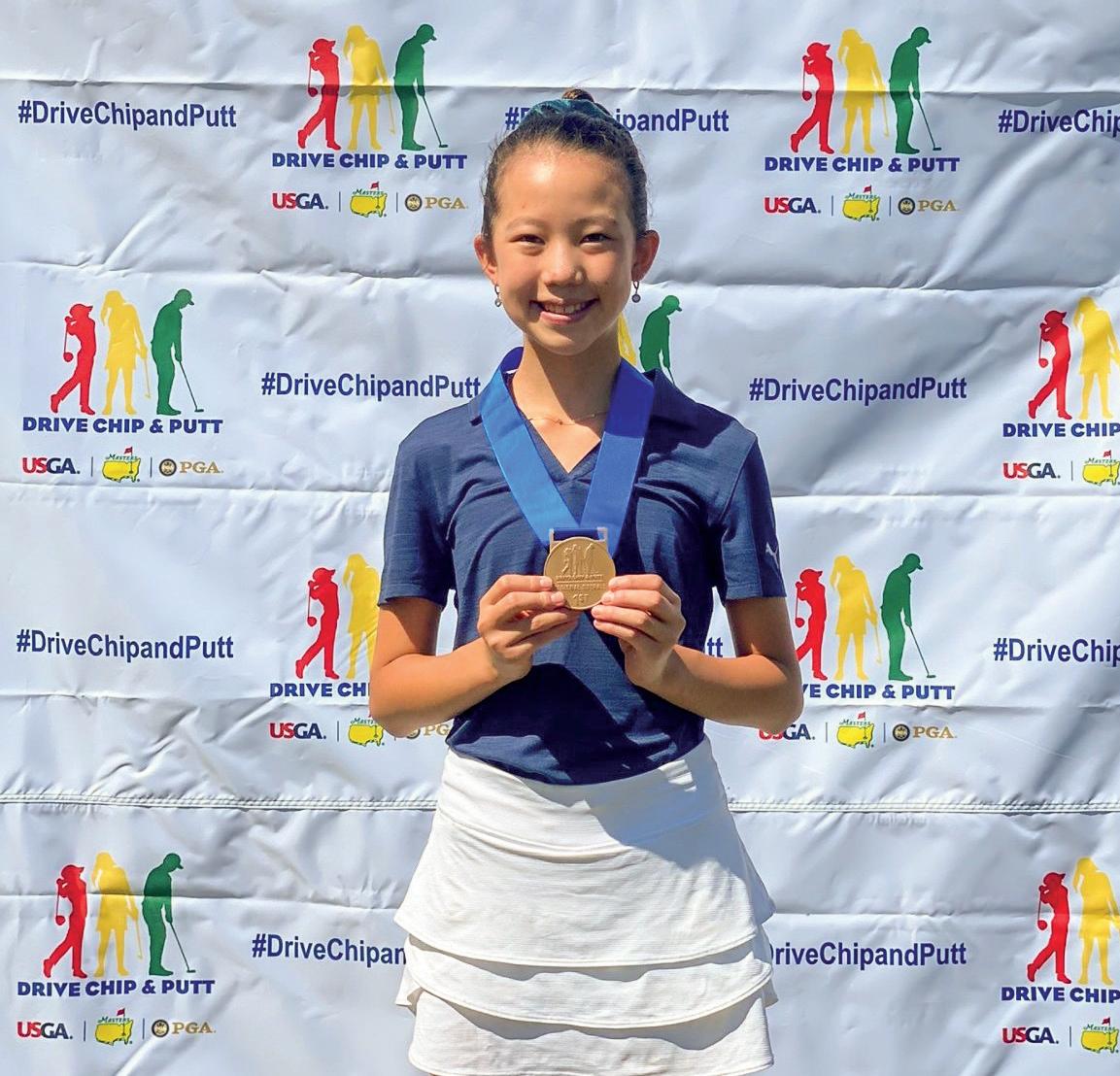
Academy seventh-grader
Jenna Kim placed first in her division of the Drive, Chip & Putt National Finals, hosted at Augusta National Golf Club in Georgia in April. Kim won the Girls 12–13 division of the nationwide skills competition, which is presented annually by the PGA of America, United States Golf Association and Augusta National. Drive, Chip & Putt competitors advance through local, sub-regional and regional qualifiers, culminating in the nationally televised National Finals at Augusta National the Sunday prior to the Masters Tournament.

Scan to see more from WTVD-ABC11.
One can see someone every day but never really know them. We might say hi, hold a door open for them, offer thanks for an act of kindness. But to truly build community, Kennedy Turner ’23 believes it’s most meaningful to really make an effort to get to know those people we see every day. To sit down with them, learn about their interests and families, maybe get beyond the small talk.
Over the course of the last year, Turner has made a concerted effort to do exactly that with some of the unsung heroes of the Durham Academy community — members of the maintenance and security teams. One by one, she and fellow members of the Upper School RAISE (Raising Awareness for Inclusion and Social Equity) Committee are interviewing as many of these often behind-the-scenes staff members as possible and sharing video recordings of their conversations with the Upper School community.
“One of the questions was ‘what do you most enjoy about DA,’ and all of them were like, ‘the students,’” Turner said. “And I thought that was just so nice to hear that — every single one of them said the students — and that definitely put into perspective how much they really care about us and our well being. But it made me sad for us, because we don't always really acknowledge them in the way that we should.”
The interviews are part of an initiative coined the “Gratitude Project,” which stemmed from conversations among RAISE members in spring 2021. Turner credits the COVID-19 pandemic with prompting them to think about people who impact their lives but whom they didn’t often see. Initially, Mariam Abdelbarr ’23 planned to take the lead on the project, but when she
Story and Photo by Melody Guyton Butts
transferred to N.C. School of Science and Mathematics for her junior year, Turner volunteered to spearhead the initiative.
“I was thinking about all the people who we see on campus every day, but we don't really know,” she recalled. “And I know that DA tries to make sure we're a community. But I feel like if we're not recognizing the people that we see every day, we’re not really the community we want to be.”
Turner has enjoyed having the opportunity to sit down and chat with the maintenance and security team members. In her recent conversation with maintenance team member Mac “Big Mac” McDonald, the interview that was scheduled to last five or 10 minutes stretched on for 45 minutes in the blink of an eye. They talked about their families and their shared experience of having grown up in Durham.
“It has just been nice getting to know them on a regular human level. Like Mr. Cleary, we talked in the spring, when we were just starting to film these videos in the spring of my sophomore year,” Turner said of Director of Security Jim Cleary. “Again, we were supposed to talk for 10, 20 minutes, and we ended up talking for almost an hour. Just about basketball, the college rivalry of UNC and Duke basketball. And while we did talk about his career, it was mainly just getting to know each other.”
The Gratitude Project has not only enabled Upper Schoolers to better get to know some of the familiar faces from around campus, but also to express their gratitude to them in an organized way. Around Thanksgiving 2021, RAISE shared the first video featuring Gratitude Project conversations, and Turner assigned each Upper School advisory group a maintenance or security team member so
that the students could create thankyou cards for them.
With the retirement of longtime maintenance foreman Randy Baker (see page 64 for more on Baker) looming near the end of the school year, Turner expanded on the Gratitude Project to ensure that he knew just how much he was appreciated by the entire school. This winter, she set up posters on the Middle and Upper School campuses so that faculty and staff could write notes of appreciation, and she worked with Preschool and Lower School teachers to create a video featuring well wishes from students and teachers.
“One of my first memories at DA was when I was 4 years old, watching Mr. Baker drive around on one of the golf carts. I remember him smiling and waving hello and always being busy helping other people,” Turner recalled of the longtime maintenance foreman in a speech at the Upper School’s Magnificent Community assembly in March. “From the time I started Preschool until my fourth-grade graduation, I saw Mr. Baker almost every day. Although I didn’t know the details of his job, it seemed like he was doing something new every day. As I got older, I realized he was actually doing something new every day.
“It’s his versatility and dependability that helps our school run. For as long as I can remember, any time a situation or problem occurred, my nosey child ears would hear, ‘call Randy, he can fix it.’ … My appreciation for Mr. Baker continues to grow each and every day.”

Scan to watch the Preschool/Lower School video created for Baker.
Scan to watch the Gratitude Project video featuring conversations with maintenance and security team members.


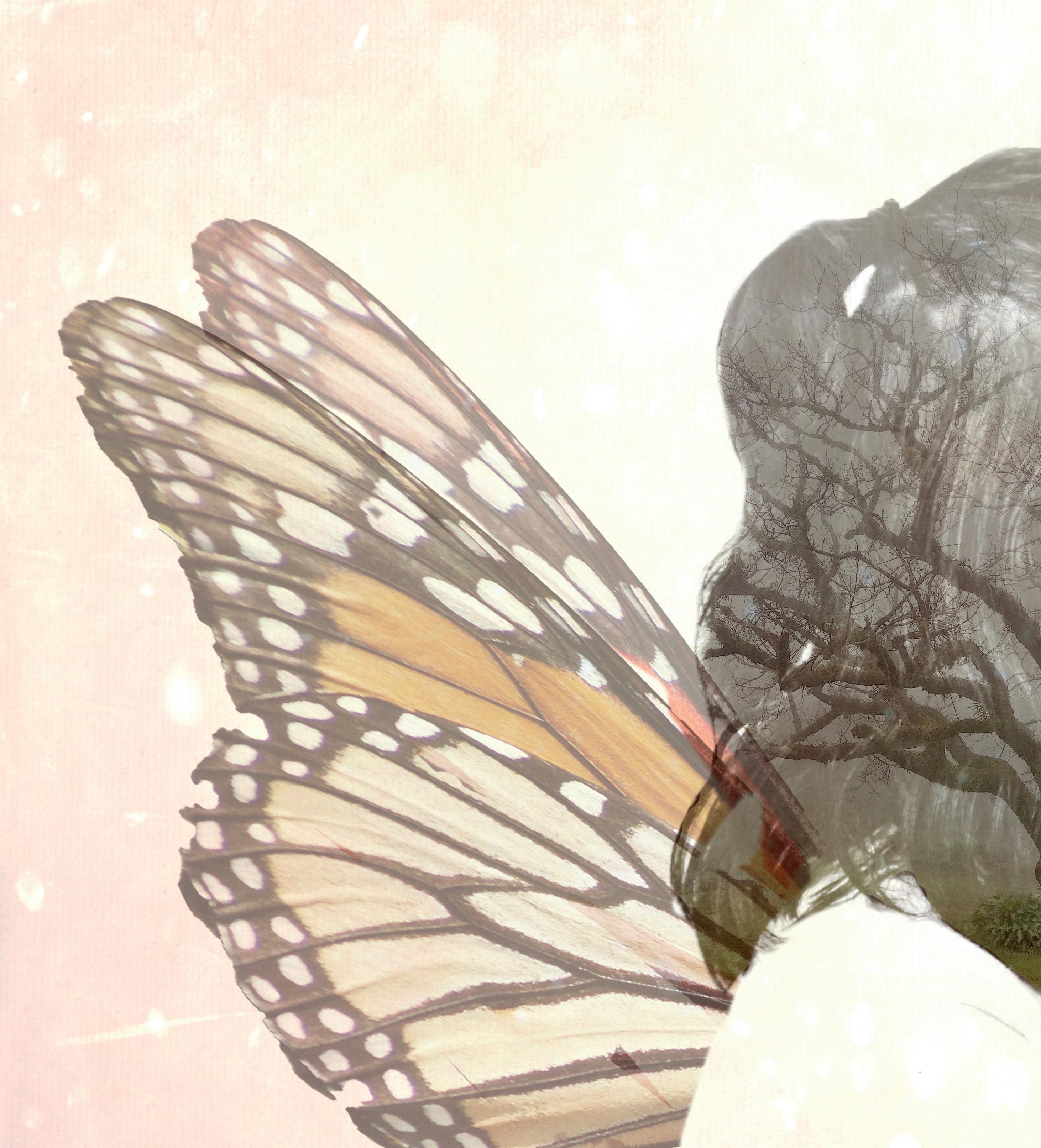
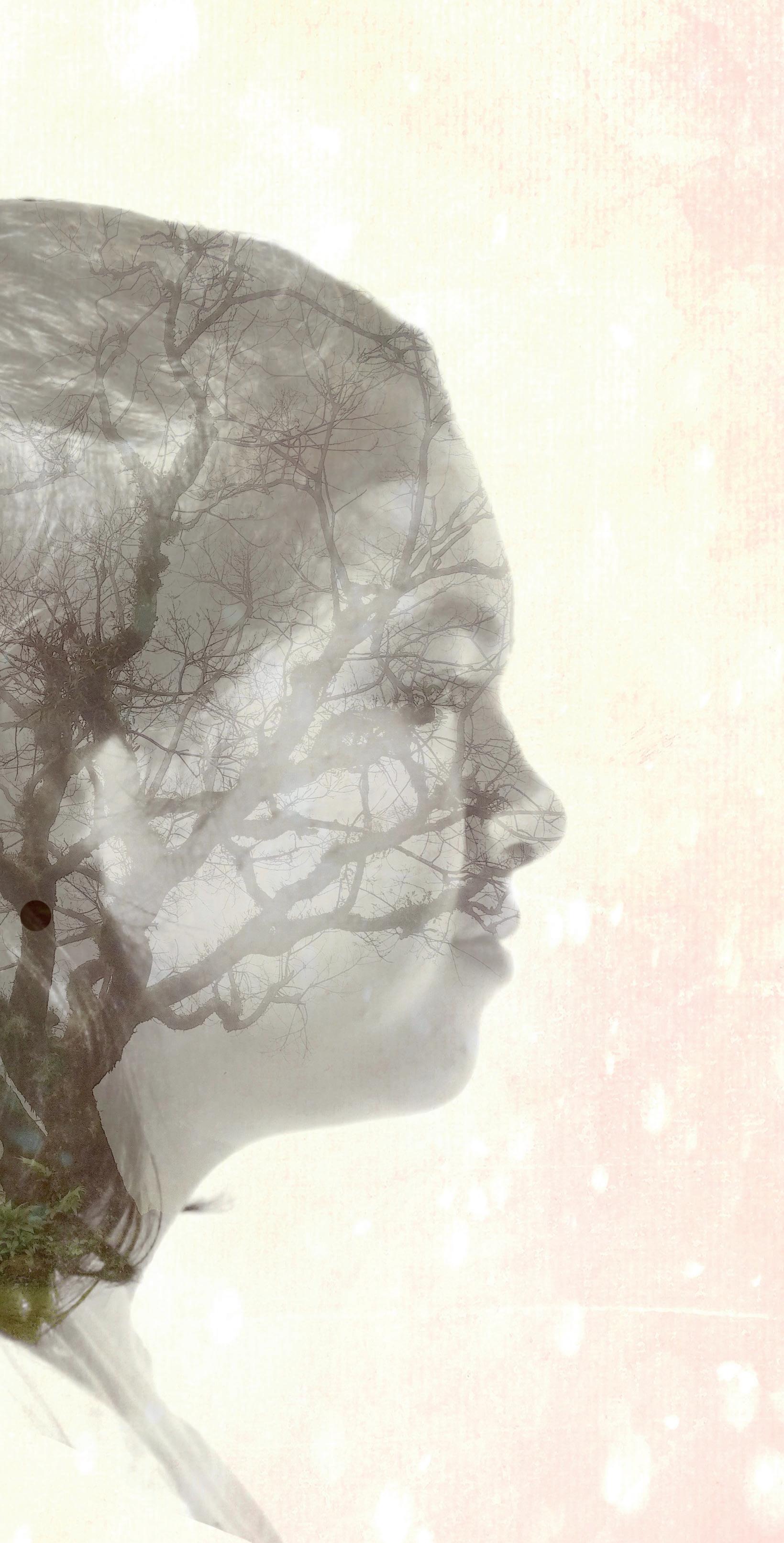
As an introduction to creating Photoshop composite images, students in Upper School visual arts teacher Elisabeth Effron’s Digital Art & Design classes were grouped into pairs and created digital portraits of their partners to use as the foundation of the project. Each told a story based on what they learned about their partner through a short interview process, then used Creative Commons-sourced imagery to layer that into their portrait. The project helped students solidify knowledge of selection and masking tools, explore blend modes, learn how to work with multiple layers and practice basic visual storytelling skills through use of composition techniques.

Scan to see more double exposure artwork and vector portraits.
Story and Photo by Kathy McPherson
Dr. Lauren Garrett grew up in Harper Lee country, in Monroeville, Alabama. Garrett’s great-grandmother was friends with Lee calling her Nell, the name she was known by before she became famous as Harper Lee, author of To Kill a Mockingbird and the writer would visit when she returned home to Monroeville and Monroe County, Alabama, from Manhattan.
“My dad’s family would always always say that Boo Radley [the reclusive character in To Kill a Mockingbird who only came out at night] was based on a cousin from my mother's family,” Garrett remembered. “My mother hated that, which made it all the more powerful to my young imagination.”
Storytelling and imagination were integral to Garrett’s life. That is part of what led her to study literature and brought her to Durham Academy in 2015, where she is an Upper School English teacher. “I grew up in a family that was very drawn to storytelling,” she said. “First of all, my father was a minister. Story and narrative is really central to the way he presented the world to us.”
And her mother’s family did their part. “We would get together at my great-grandmother’s house every Thanksgiving. After the turkey and after sitting on the porch or playing some football, the whole family would walk over to this cemetery in town and we’d stand over the graves of my dead relatives. My aunts were the storytellers and they would give their go-to story for each of the dead relatives.”
From an early age, Garrett said she “felt like I saw myself in story. I felt a connection to story and character and place. I realize now what a huge privilege that was.”
Reading was a refuge. “Back then, we didn't really talk about wellness and self-care, but I realize in retrospect that reading was very much that for me growing up. I think it was one of the ways that I took care of myself, but it was also so much more than that. It wasn’t just escapism, it was fiction therapy. It was also how I lived beyond my circumstances.”
Home was Alabama and Mississippi, but Garrett entered a far wider world through her great-grandmother’s book closet. “She had so many great books in there. I took this volume of Shakespeare. It was old with soft, soft leather, onion skin pages, gold edges and the font was tiny. It was not a book made to read, but I took it and I started reading it. I didn't understand half of what I was reading.
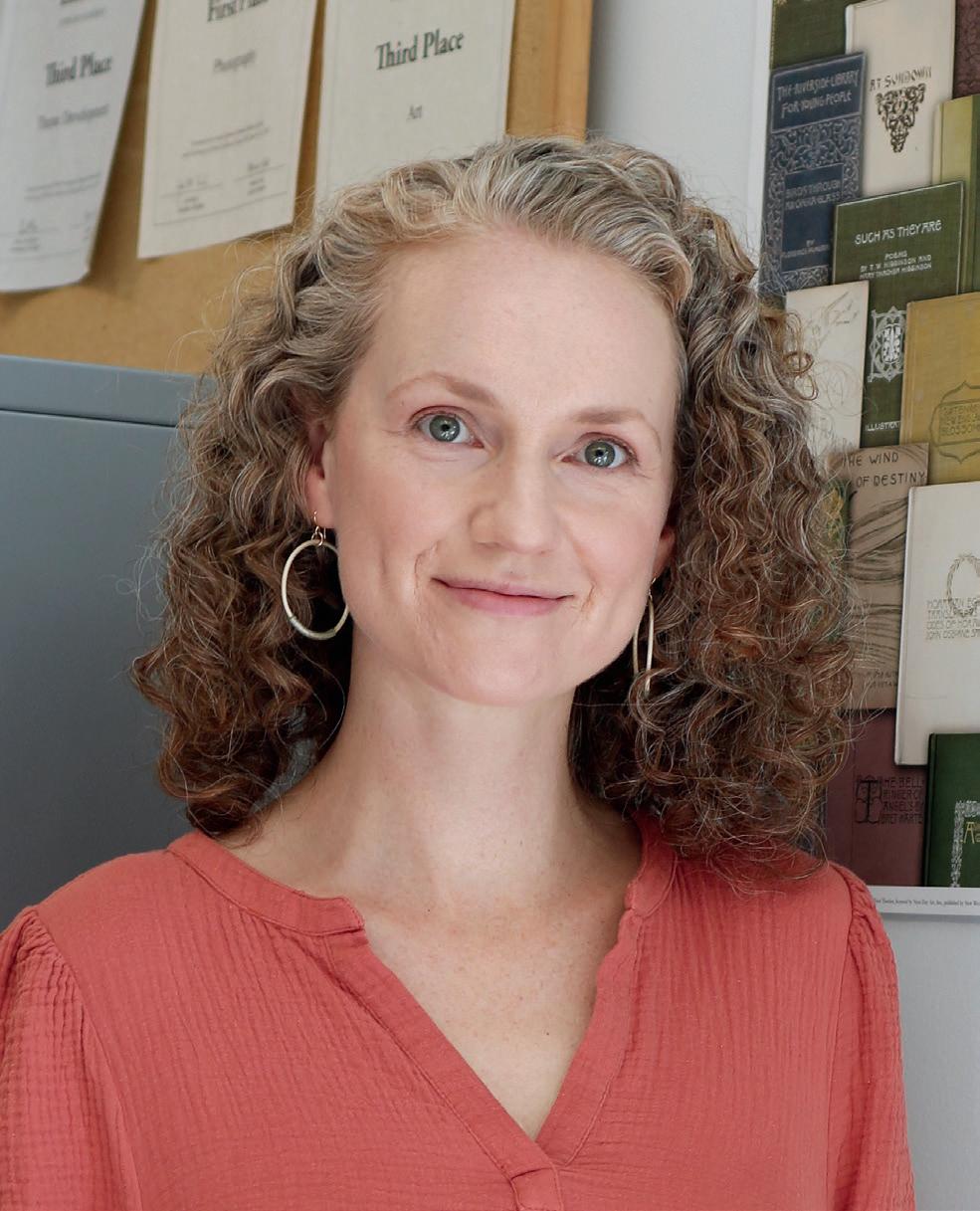
“The way we think about the texts that we read in English class, it's no different from how I want them to engage with any kind of text.”
Dr.
Lauren Garrett
I think it was as much the book itself that kind of drew me in, but for some reason I kept at it. I felt like I was reading some old volume of magic where I would have flashes of understanding.”
It lit a fire for Shakespeare and she became adept at reading him “you kind of break the code of his syntax and his language.” When Garrett got to high school and read Romeo and Juliet in English class, “I was amazed to find that my classmates hated it and thought it was terrible, didn't understand it and didn't like it. By that point, I loved it. I think that’s probably what planted the seed of my love for Shakespeare. I felt like I had some kind of special relationship to share it with others and to help other people see how fun it could be.”
She followed that passion at Millsaps College in Mississippi, where she graduated with a major in English, and to UNC-Chapel Hill, where she earned an M.A. and Ph.D. in English and spent 10 years as a teaching fellow.
Garrett was on the cusp of a tenure track career in higher ed when she started to question whether the dissertation process had robbed her of her joy of reading.
“I felt trapped in this niche, this little corner. I had made what I love to do, I’d made my passion a job and one that had become a little unrecognizable from what actually led me there.”
She canceled job interviews, completed teaching a spring semester Shakespeare course at UNC and was wondering what was next when she was offered a parttime position teaching English at Durham Academy Upper School.
“That has been the biggest decision, scariest decision I've ever made,” Garrett reflected. “That was a really tough process and a huge turning point in my life. I was a new mother, I had a 6-month-old. Over the years as a grad student I really had begun to question if I was going to be able to be happy, find happiness in this career. I think becoming a mom, something about it made me want to really live authentically. So I wanted to act on this, I didn’t want to go further.”
By her third year at DA, Garrett was teaching full time, leading an Upper School advisory and serving as advisor to Exurbia, the arts and literary magazine published each spring to showcase Upper School student work.
“Strangely, in all of this, I always imagined myself teaching literature, I don’t think that I’d ever seriously considered teaching at the high school level. … It’s the best thing that’s ever happened to me,” Garrett said. “It wasn’t what I set out to do, but thank God it happened because I found my joy for literature again. Grad school was great, and I’m glad I had that experience, but along the way I lost that original relationship I’d had with literature. Teaching at this level, I can ‘geek out’ and do my Shakespeare thing, but I can also teach Zora Neale Hurston, I can teach Jane Austen, I can teach poetry, I can do all of these things. I can teach new texts and new authors and continue to expand my horizons instead of being boxed in.”
Pleasure, fun and enthusiasm are central to Garrett’s classroom, and that’s how she brings students especially sophomores taking a required English class to share her joy and love of literature.
“The most emblematic thing that I do in my teaching is probably the ‘geeking out’ presentation. I do it in English 10, where I invite students to share some texts that they love, that they think are really exciting and important, or just fun or whatever.”
Students have chosen video games, songs, movies, reality TV shows, sports biographies, comic books, fantasy series and cartoons for the geeking out presentation. “Two of the smartest, best geeking out presentations I got were on Scooby Doo and SpongeBob SquarePants,” Garrett said.
“Instead of always reading what I say is important, it’s an opportunity for them to get a full 20 minutes in class to totally geek out about something they love. … That’s my

attempt to help students recognize that the way we think about the texts that we read in English class, it’s no different from how I want them to engage with any kind of text. It helps them draw a direct line from their favorite video game to something like Dante's Inferno. They realize that the questions we ask about those texts, they can ask those same questions about the text that they love. It helps them see that the joy and enthusiasm they have for this other text can be a bridge into engaging with texts in a deeper way.”
Garrett realizes that not every student sees themself in the texts they are assigned in English class. As academic leader of DA’s English Department, she is helping revamp the required courses for ninth- and 10th-graders to make them more inclusive of different cultures and experiences.
She sees that in her own life experience. Monroe County, Alabama, where Garrett’s family is from — Harper Lee country — is the same county that Bryan Stevenson wrote about in Just Mercy, a memoir about his career as a lawyer, including defending and ultimately exonerating Walter McMillian, a Black man who had been sentenced to death for the murder of a white woman.
Garrett said reading Just Mercy “made me very aware of the degree to which there was one dominant story, a single story about where I come from, that I had really bought into a whole lot. … That really opened my eyes to the importance of making sure I'm not reinforcing the dominant narrative or single story in my classroom.”
STORY BY MELODY GUYTON BUTTS // PHOTOGRAPHY BY BOB KARP AND KIM WALKER
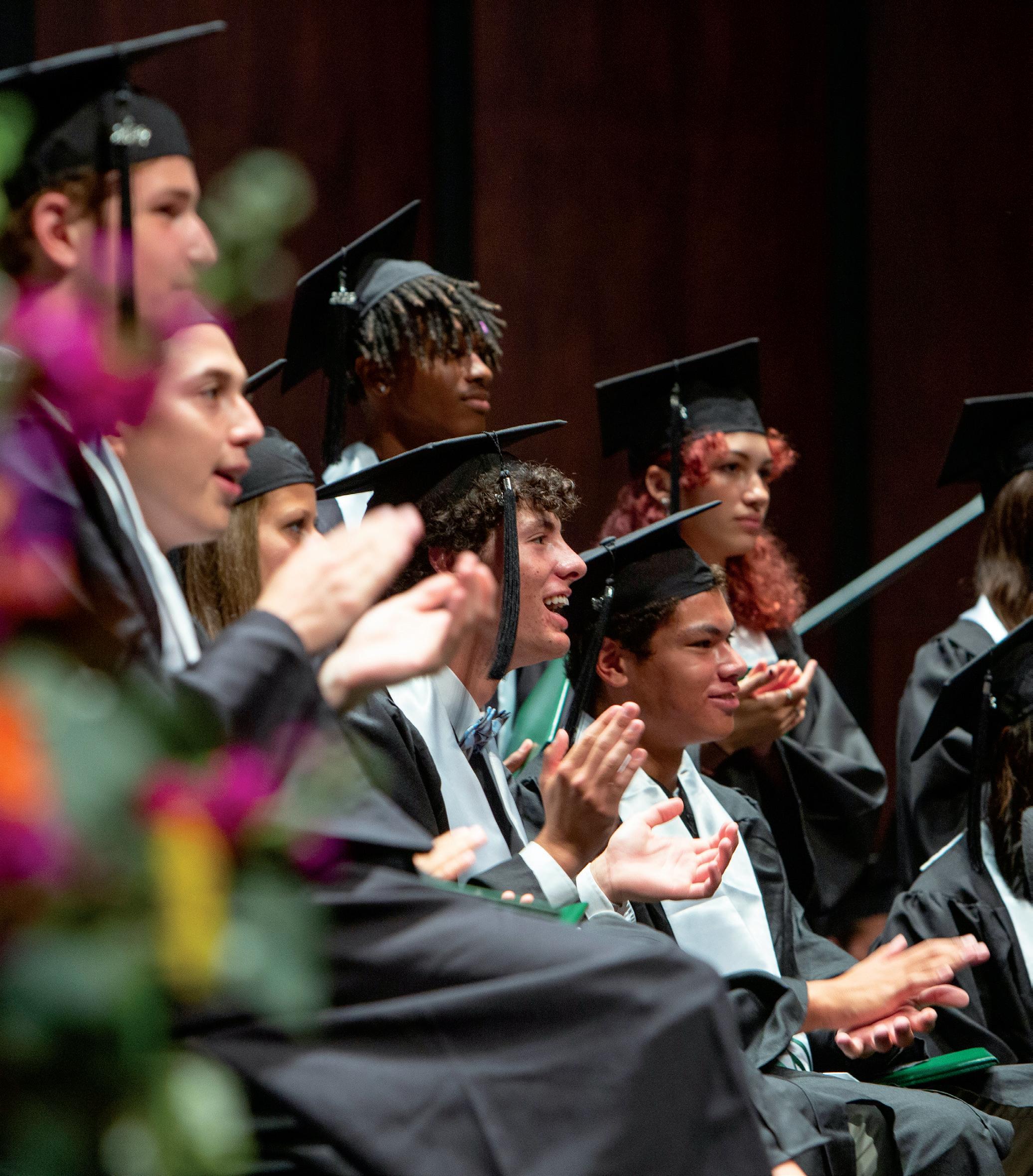

To classmate Haley Fogg ’22, seeing the many faces assembled for the commencement exercises was a symbol of the beauty of humanity.
“This ceremony is yet another testament to our desire for celebration and togetherness. We don’t have to be here, just as we didn’t have to dress up for spirit week and my soccer team didn’t have to show up to Moylan Field last week [for an optional, postseason practice],” she said. “But we’re here, and we’re celebrating. Always remember that we will choose to celebrate birthdays and graduations and wedding anniversaries and even funerals because we deserve to celebrate, because we want to celebrate and to be celebrated, and so we do.”
Delivering the keynote commencement address was Gabriel Bump, a critically acclaimed author and assistant professor in UNC’s department of English and Comparative Literature. Reflecting on his own experience at an independent school in Chicago, Bump urged the seniors to hold on not only to the knowledge that they gained from Durham Academy, but also to the friendships that they have developed.
After graduating from high school, Bump studied journalism at the University of Missouri with a goal of one day working for a major newspaper, but it wasn’t a good fit. He didn’t connect with his classes and found himself in a depressed and anxious state.
“No one down in Missouri knew me the real me,” he said. So he left college after his sophomore year. “… My plan had failed. I didn’t know what to do. So how did I get from college dropout to here, in front of you, happy, fulfilled, grounded, with health insurance, a job that pays regularly? Well, that summer back home in Chicago, living with my parents, I spent every day with my lifelong friends. We bounced around the city, stayed up late, talked
through our worries, fears, hopes, talked like people who had known each other for 15 years.”
His friends supported him in pursuing his passion for writing, eventually leading to the publishing of his debut novel, Everywhere You Don’t Belong, in 2020. Bump recalled sharing the good news about his book first with his parents in a brief phone call. And then he “dropped the news in the group chat, and the real celebration began.
“We still celebrate together, and we mourn together breakups, divorces, firings, struggles with substance abuse, mass shootings, pandemics, deaths,” he continued. “We’re always there in the group chat.”
Upper School Director Lanis Wilson also encouraged the seniors to nurture the relationships that they have formed and to savor the moment.
“Appreciate where you are right now, surrounded by the people who care most about you your friends, your teachers, your family,” Wilson said. “Class of 2022, you will never be in a room with so many people whose sole focus is your well-being. You’re surrounded by people who love you and care deeply for you. You’ve come a long way, and you still have a long way to go. But on this afternoon, on this stage, just be. Just appreciate what’s in front of you. Appreciate where you are, take in this moment and soak it in, because I think the secret to happiness comes in embracing beautiful moments.”

Scan to view videos of and photos from Upper School commencement and closing exercises for Preschool, Lower School and Middle School.
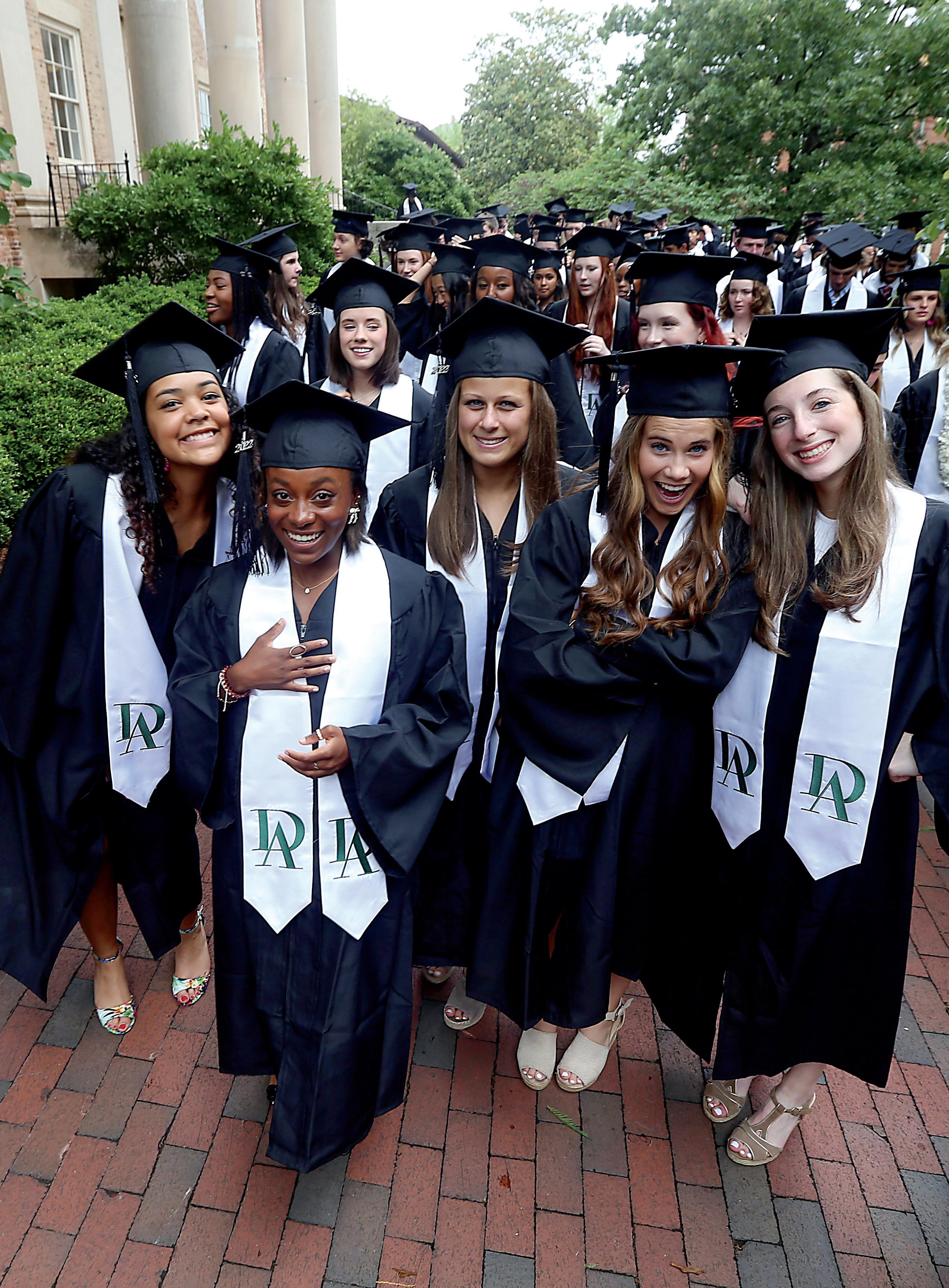
Fifteen Durham Academy seniors are trading DA green and white for jerseys and caps of new hues as they compete in collegiate athletics at the Division I and Division III levels next school year. Four student-athletes participated in a signing ceremony on Nov. 3, and the DA community gathered to celebrate the college commitments of 11 more seniors on April 28.
“This class of 102 will be sending 15 student-athletes on to the next level — quite an accomplishment and a tribute to the hard work of these young men and women behind me,” Director of Athletics Andy Pogach said at the spring signing ceremony in the Upper School quad.
“Today’s official celebration is about what this group [of student-athletes] will be doing in the future, but in reality it’s about what they have done in the past to get to where they are today,” he continued. “There are so many people here that have helped you — family members, teachers, coaches, teammates. We are all proud of you and your accomplishments and can’t wait to see what you do at the next step of your athletic career.”

Goldstein, a four-year member of DA’s varsity baseball team, has thrice been named All-Conference and was named DA Offensive Player of the Year in 2019 and 2021.
“Ethan Goldstein is a very good leader on the baseball team,” said Dean Dease, head coach of DA’s baseball team. “He communicates well with players and coaches. Ethan also has a very positive attitude and keeps the team motivated. I’m sure he will do well next year at Haverford.”
Donahue, a four-year varsity letter winner in baseball, was named All-Conference in 2021 and 2022.
“Sean Donahue is one of our hardest workers on the team,” Dease said. “He dedicated himself to the weight room, and it has paid off for him on the playing field. Sean is a quiet leader, and players will follow him because they know he does things the right way. I look forward to big things for him at Case Western.”
Niedel, a four-year member of the Cavaliers varsity baseball team, was named All-Conference and DA Defensive Player of the Year in 2021 and 2022. “Jackson Niedel is a competitor. He has tremendous focus on the mound, at the plate or in centerfield,” Dease said. “His ability to concentrate and battle leads to his success on the diamond. Baseball is a difficult game, and Jackson works very hard to be good at it. With his mental and physical game, Jackson will be very successful at Kenyon College.”

Trahey-Matzen, a four-year member of DA’s varsity girls soccer team, was named All-Conference in 2021 and 2022 and has twice been named N.C. Soccer Coaches Association AllRegion.
“Isabel is one of the best players on our team,” said head coach Susan Ellis. “She works hard in the classroom, and her smile, personality and character bring so much joy to me and our team. She plays in our defense and is a warrior. Our team is better because Isabel chooses to play high school soccer for Durham Academy, and I am lucky I got to coach her.”
Linney has been a member of the varsity cross-country and track and field teams for the last three years, and he served as captain of the cross-country team in 2021.
“George Linney is fully in the arena. He will never be with those cold and timid souls who know neither victory or defeat,” said Costen Irons ’98, head coach of Durham Academy’s cross-country and track teams. “He is completely dedicated to getting better. He is one of the hardest workers on the DA distance team. George has the second-fastest mile and two-mile times on this year’s track team.”
Steinberg, a two-year member of the Cavaliers varsity volleyball team, was a team captain in both 2020 and 2021 and earned the team’s Dedication Award in 2021.
“Izzy joined the Cavs as a junior and has done a great job leading her team from the beginning,” said Latacha De Oliveira, who served as head coach of the DA volleyball team. “Izzy’s most admirable trait as a volleyball player is her practice work ethic. She enjoyed pushing herself and her teammates each day at practice and expected the level of play to always be top-notch. She plays with her heart and works very hard daily. Catholic got a good one.”
Tucker, a three-year member of Durham Academy’s varsity field hockey team, was named All-Conference honorable mention in 2020.
“I taught field hockey to the Lower School kids every year, which is where Carson learned to play,” said Judy Chandler, DA field hockey coach from 1991–2021. “As a rising third-grader, she began to come to my DA summer camp and continued every summer until she began playing on the Middle School team. She enrolled in camps, clinics and clubs to play this game and improve as much as possible. All of her dedication and hard work has brought her to this moment.”
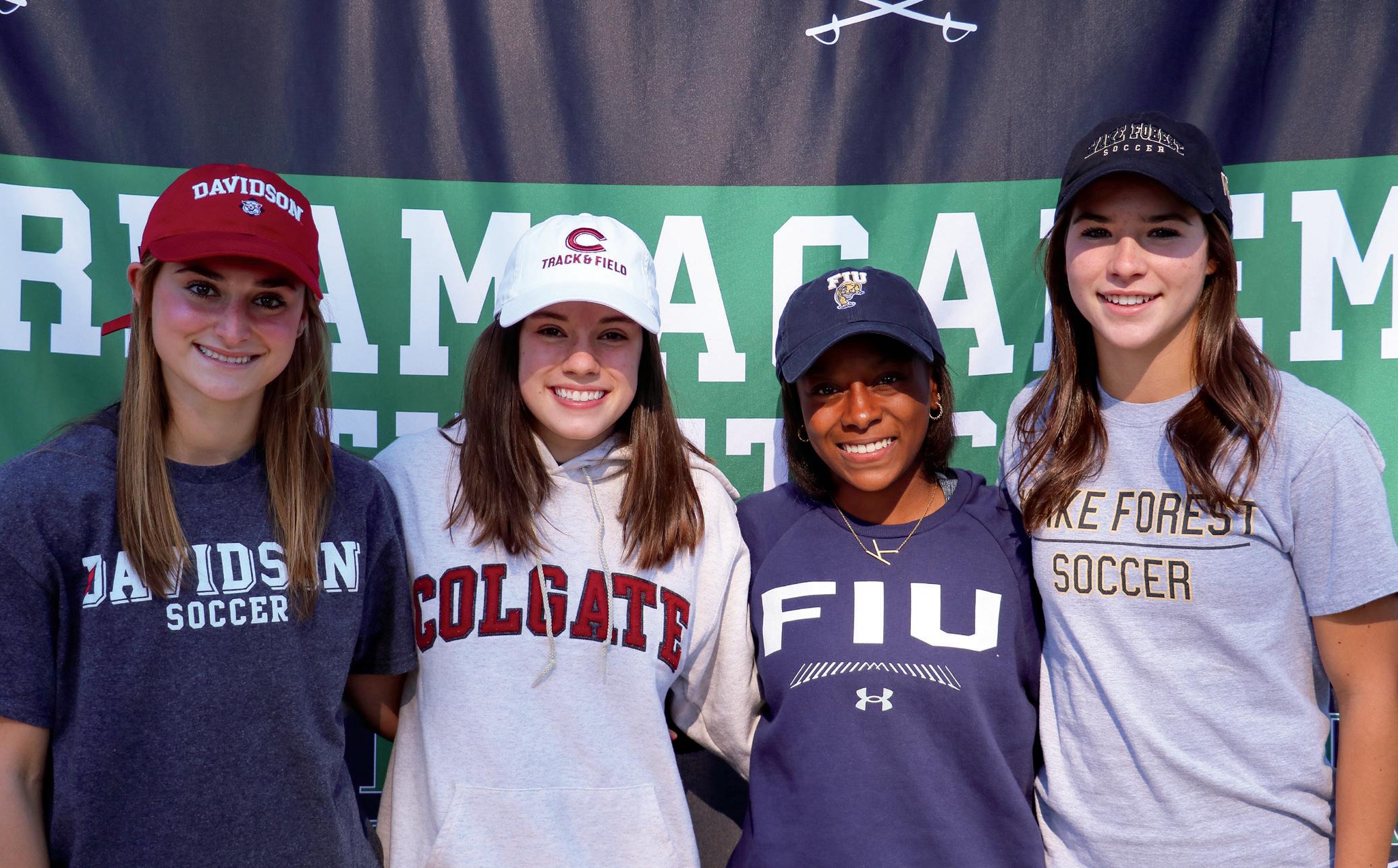
Kerman has competed with the North Carolina Football Club (NCFC) Youth program as a member of the top-10 nationally ranked North Carolina Courage Academy U19 team. She was selected for the Region 3 All-Region team of U.S. Youth Soccer’s Olympic Development Program.
“Katie is unstoppable. She's a force on the soccer field and in the classroom,” said Dr. Rob Policelli, her Durham Academy advisor. “She pursues excellence with a rare, unwavering determination. With her vocal leadership, thoughtfulness and immense self-motivation, she's going to impress a lot of people at Davidson.”
Hallyburton was crowned state champion in pole vault in 2021 and 2022. She has been named AllConference twice, set new conference and school records for pole vault, and was named team MVP.
Hallyburton placed second in the decathlon at the Ravens Relays and led DA’s 4x100 relay team to a new school record and the 2022 conference championship.
“Julianna leads by example with her work ethic,” Irons said. “… On meet days, she is tough as nails. She also pours into her teammates and makes those around her better.”
Yon played varsity girls soccer at DA from eighth to 11th grade, and during that time, she was twice named All-Conference and was named the team’s Offensive MVP in 2021. She has also played with the North Carolina Football Club (NCFC) Elite Clubs National League (ENCL) program.
“She was like a fire chief,” Ellis said. “Because wherever there was a trouble spot on the field, I could put her there and she would put out the fire. She is a team player and gives 100 percent of herself in every game.”
Goldthwaite has competed with the NCFC Youth program as a member of the top-10 nationally ranked North Carolina Courage Academy U19 team.
“During my three and a half years' time with Baylor, there is one constant,” said Thomas Phu, her Durham Academy advisor. “She is a self-driven, goals- and action-oriented, and happy-go-lucky young lady. She had a ‘game plan’ when it came to her academics and soccer. Baylor stuck to it, and that’s why she is where she is right now at Wake Forest.”
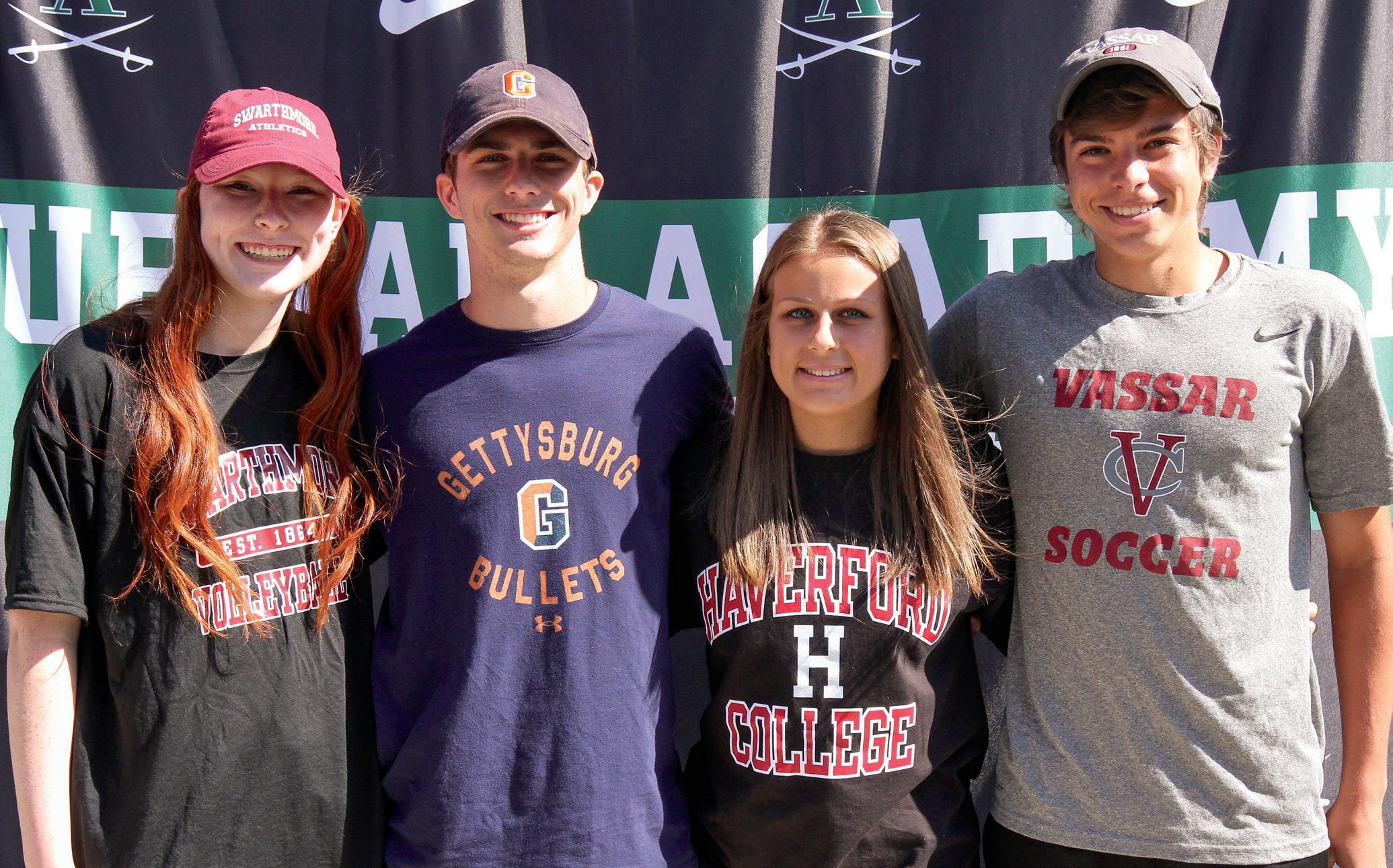
Marchese, a three-year letter winner with Durham Academy’s varsity volleyball team, was named All-Conference in 2021, a year in which she also served as a captain. She was honored with the DA team’s Coach’s Award in 2020.
“Gabby is the true definition of a team player. Absolute rock-star status!” De Oliveira said. “She always put the team first and fulfilled any role that was asked of her. Gabby didn't miss a single practice and put forth 100 percent effort at all times.”
Corbett, who has earned varsity letters in boys lacrosse each of his four years in the Upper School, was named All-Conference in 2021 and 2022.
“Austin has worked really hard over the years to earn this opportunity, and we couldn’t be more proud of him,” Durham Academy head varsity boys lacrosse coach Jon Lantzy said. “Austin and I started our lacrosse journey together way back in first grade youth lacrosse, and I have had a front-row seat to his growth as a player and person that has followed. I can’t wait to see what lies ahead for his continued growth on and off the field.”
Epstein is a five-year member of the DA varsity girls lacrosse team and has served as a captain. She has been twice named to the All-State team, three times to the All-Conference team, and she was Conference Player of the Year in 2021 and 2022. In 2021, she was also named U.S. Lacrosse All-American and was honored with DA’s Steve Engebretsen Leadership Award.
“Brooke is DA at its finest,” said head varsity girls lacrosse coach Debbie Rebosa. “… Not only do I appreciate her strong work ethic, intense focus and incredible ability to shoot under pressure, but she is just a pure joy to be around.”
Pastor-Valverde, a threeyear varsity letter winner with the DA varsity boys soccer team, is a two-time All-Conference honoree. In 2021, he was named Conference Player of the Year, a team captain, a co-recipient of the team’s MVP award and an AllState honoree.
“Diego is an inclusive leader who encourages others while also having enough individual skill and courage to take up the mantle and lead his team to succeed when we need him to do so,” said head coach Julian Cochran. “He has high expectations for others, and he holds himself to the same standard.”
With their time at Durham Academy coming to a close, we asked members of the Class of 2022 to reflect on their time at DA. A common theme of many of their responses? The importance of community. We’re so grateful for all of the ways that these young people have worked to make Durham Academy a more moral, happy and productive community — and we can’t wait to see them be a force for good out in the world.


Scan to learn more about each member of the Durham Academy Class of 2022.
“One of my all-time favorite classes has been District C! I got to work in small groups to solve real business problems for real businesses. We interviewed and met business leaders, collaborated to brainstorm solutions and then presented those ideas back to the businesses. Many of the companies actually applied and incorporated our ideas back into their websites and platforms, which was awesome to see. District C made me very passionate about creativity, problem solving and helping/working with others!”
“One of the best and most fulfilling experiences at Durham Academy has been getting the chance to be an Augustine Literacy Tutor during senior year. As a part of the Teaching Literacy Skills class, senior tutors are paired with an elementary school student at Hope Valley Elementary School. Getting the chance to interact and help out young students outside DA really allowed me to become more than just a student at DA, and it gave me a bigger reason and purpose to come to school every day. I enjoyed every moment of getting to know my tutee and learning new words and sounds with her. Augustine Literacy has been one of the best classes at DA, and I encourage all underclassmen to take the class when they, too, become seniors.”
Aamer Husain

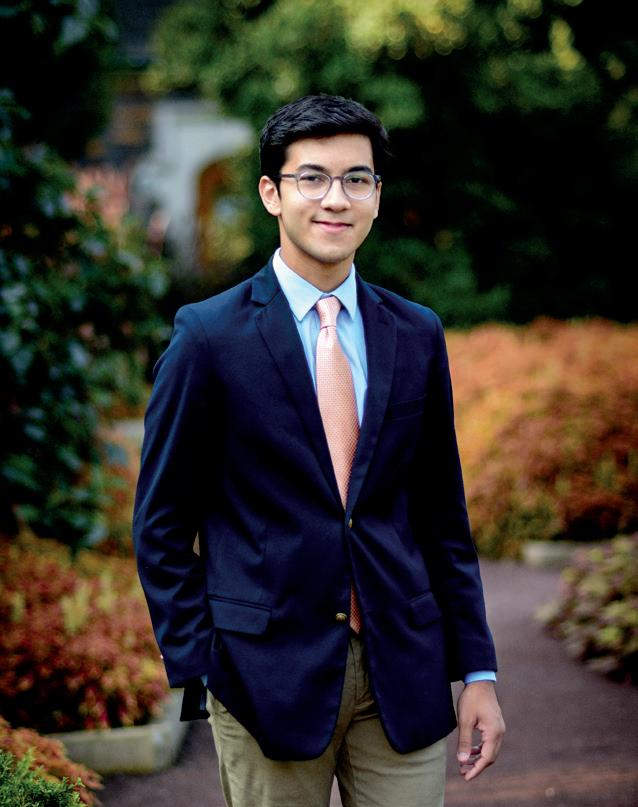
“Debate has given me a space to develop critical skills like research, argumentation, speaking, quick thinking, idea synthesis, etc., that have been invaluable in all aspects of my life. It has also pushed me to learn about a vast array of current events and ideologies setting me up to excel in school and summer courses of all kinds. Perhaps most importantly, however, debate has taught me that there are always more than one, more than two, sides to any topic. I am the most proud of the respect, appreciation and empathy I now have for all perspectives to which I credit debate with.”
Anastasia Crowley
“Sure, DA has incredible academics, support systems, sports teams and clubs, but what sets DA apart for me is its active community. It is rare to find a place where after school on Friday students choose to stay on campus, instead of going home, to talk with friends and teachers, blast music, and play Spikeball. I hope in my future endeavors I will find a community that is as collaborative, respectful and happy as DA is, though I know such communities are hard to come by.”
Gavin Levinson
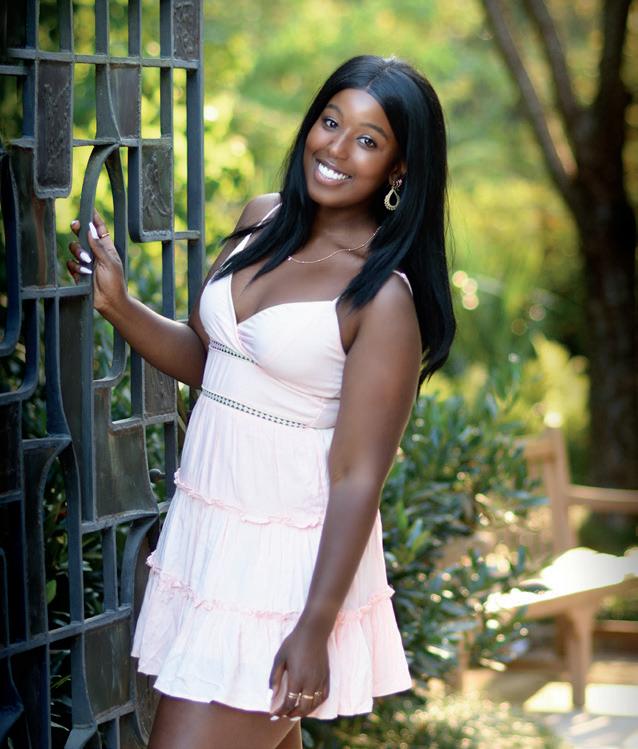
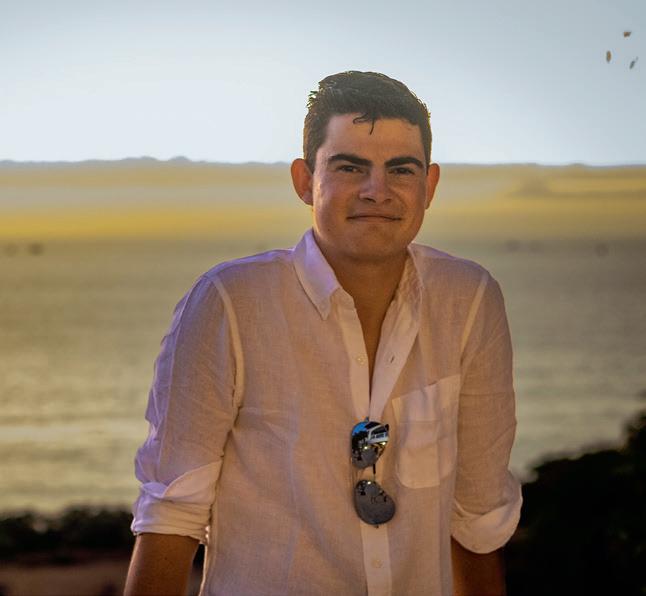
“My time at Durham Academy has really helped me value the importance of community. I believe that one of the best parts of DA is the strong sense of community that you can gain with both peers and teachers. My time at DA has shown me that wherever I go in the future, I would like to have the same community that values me and that I also value. My time at DA has also helped me appreciate trying new things and daring to do what you love. Being around people who love to learn and enjoy new experiences has impacted me in such a positive way. These ideas are what prompted me to create African dance workshops, audition for the musical and try out for track my senior year. DA values doing things that you love and trying new things, and I am excited to continue this in the future.”
“I'm eternally grateful for the unique opportunities and wonderful experiences that Durham Academy has given me. I thoroughly believe that my time at Durham Academy has prepared me for college and beyond. Although I'm sad that my time at DA has come to an end, I know that the people I've met and the knowledge I've gained will stay with me for a lifetime. Thank you, Durham Academy!”
Kaitlyn Kushner

Zoe Sinclair
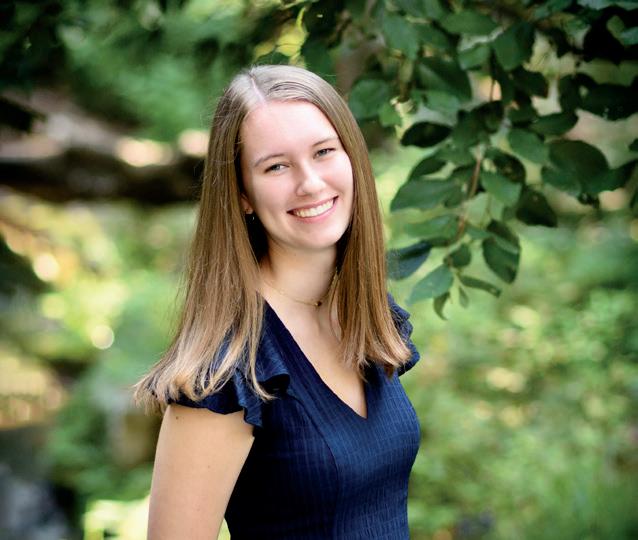
“I've been at Durham Academy since I was 4 years old, so I've seen around 10 total In The Pocket concerts during my years at DA. Even before I learned an instrument, I wanted to be onstage, performing for a crowd like the one I was in. I ended up having a love for music, which developed through my middle school years, and as I got closer and closer to high school, the more I started thinking about being in ITP. After a year of taking Music Ensemble during my freshman year, I auditioned as a bass player and got in before my sophomore year. I started as one of the two sophomores in the group, and although I had to miss out my junior year, I've been so grateful for my time in ITP during both my sophomore and senior years.”
Tyler Powers
Story by Kathy McPherson // Illustration by Sarah Jane Tart
What would it be like if you could help determine the direction of your own education at age 4, 10, 14 or 16? Durham Academy students are getting that chance and are being given that voice.
An assembly with third-graders in late January was the culmination of three months of meetings that Head of School Michael Ulku-Steiner and Assistant Head of School Kristen Klein had with 1,232 students from pre-k through 12th grade to ask for their input on DA’s Strategic Vision.
From 4-year-olds in their first year at the Preschool to 18-year-olds working on college applications, Ulku-Steiner and Klein made multiple stops on a listening tour, gathering feedback about students’ experience at Durham Academy and using those thoughts to help shape DA’s future.
The third-graders listened attentively as Ulku-Steiner and Klein talked with words geared specifically to them about the four goals of Durham Academy’s Strategic Vision:
• Prepare our students for life. (In third-grade language: Prepare you for life.)
• Meet the needs of our learners. (Help you learn.)
• Adopt a more agile mindset allowing DA to innovate more boldly. (Try new stuff.)
• Broaden and deepen our work with diversity, equity and engagement. (Who are you? How can we all be friends?)

having the Board of Trustees, basically from the top down, say what the goals of the school should be, what we've done is an exercise involving the whole school over the past few years: faculty, staff, parents, alumni, students all of us together.”
The series of assemblies Ulku-Steiner and Klein had with students “was our opportunity to check in with our students to see if we were on the right path,” Muradi explained. “What feedback do they have? What kind of ideas do they have that we can incorporate?”
Klein said the Strategic Vision is unique in that “it is all about the students and it is about their experience, both through DA and beyond. The idea that we would be trying to prepare them for life without getting their voices and perspectives about what that preparation should look like, where they see that working and where they see that not working, would mean that we were completely missing the boat.
“I do my best learning when we relate things to the outside world.”
12th-grader
“Here’s the task when you go back to your classroom,” Ulku-Steiner said as the third-graders’ assembly was coming to a close. “Two questions, really: What do you think Durham Academy should start doing that would get at some of these things? What should DA stop doing or do less of that would allow us to get to these goals? We will be very eager and very curious, and of course, you get to practice your writing, your dreaming, your thinking all at once.”
The approach was more sophisticated in higher grade levels, but from Preschoolers through Upper Schoolers, Ulku-Steiner and Klein were seeking specific input from every DA student. And all their thoughts often accompanied by drawings from younger students were read by Ulku-Steiner, Klein and Victoria Muradi, DA’s director of strategic initiatives.
“Our strategic vision process has been a very different process than a traditional one,” Muradi said. “Rather than
“The way that we have talked to the students about it is the idea that they are working with us to co-create our school. It is as much their school as it is their teachers’ school, and they need to help us build it so that it will better prepare them for their futures. That is the reason why it was important for us to talk to every student.”
Klein explained that strategic planning is a part of school life that often happens completely apart from students. “They don’t often know about it. They’re not often familiar with the goals of the plan. We wanted them to know that this plan is about them, we want them to know about it and we want them to also hold us accountable to those goals as we move forward with this plan. It was much more about their vision than any other strategic plan traditionally would have been.”
Ulku-Steiner said previous strategic plans have “involved every part of the school: operations, buildings and grounds, or let’s hire a communications director or let’s diversify the student body, finance, the endowment. This one is all about teaching and learning. So who better than students to inform us on what makes better teaching and better learning?”
Several trends came out of the student assemblies.
“One of them was how we use time,” Muradi said. Younger students wrote that they want more time for PE and recess.

A sixth-grader asked for more brain “brakes,” and an 11th-grader expressed a need for “time to get centered and organized for the day.”
Another theme was deeper and more relevant learning including specific preparation for life skills and more choice in courses offered, how students sit in a classroom or who they partner with on an assignment.
“Classes that you get to DO something,” a ninthgrader wrote.
“I do my best learning when we relate things to the outside world,” a 12th-grader responded. “When the things that we learn in class don’t have a visible connection to my life, it makes it harder for me to envision it and be interested in it. When I do see the connection, though, it makes it fun and engaging.”
“I absolutely love the virtual world we are doing in math where we get a job and need to balance our money,” said a sixth-grader. “It is engaging every time I go to class.”
Students also expressed their need and appreciation for what Muradi called a “climate of care,” which is ways to reduce stress and rethinking grades and homework. And they
shared a desire to preserve experiences such as field trips and celebratory milestones like the junior-senior prom.
Ulku-Steiner said student feedback was shared at the February meeting of DA’s Board of Trustees and with the four teams of faculty and staff who are working on ways to implement the goals of the Strategic Vision.
“This has really been integrated immediately back into the process, and this is a process,” he said. “[The Strategic Vision] doesn't involve just one meeting where we’re putting sticky notes on a page and then coming up with a list. It’s an iterative process that will continue for years, so this will be the first of many loops and students will be in some of them.”
Talking with 1,232 students in assemblies and incorporating their responses about what the school is and is not doing well is an important piece of DA’s Strategic Vision, Ulku-Steiner said: “I think it’s easy for adults to be blind to the daily experience of our students, and this helped us fill in some of those blind spots.”
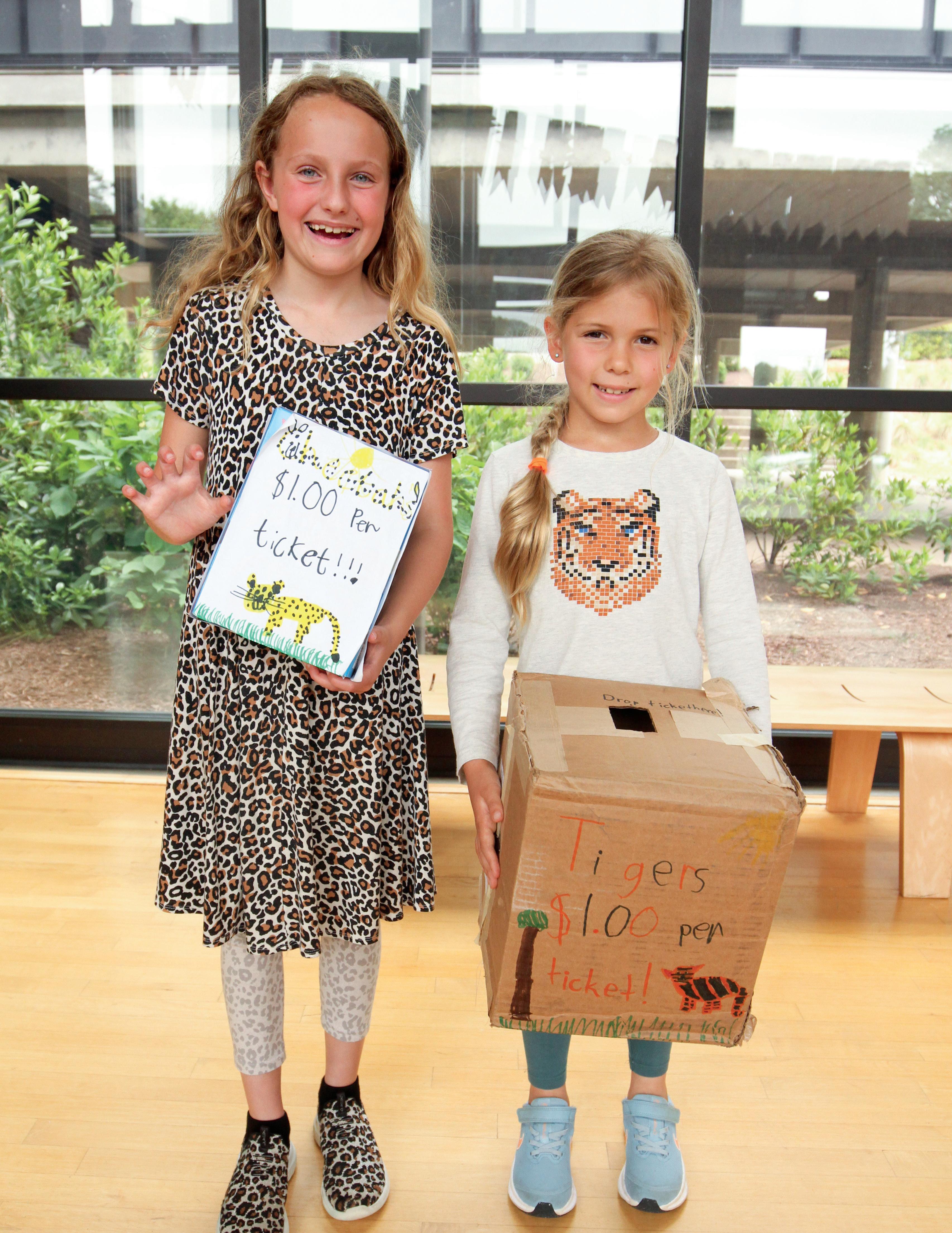
For the past several years, Durham Academy second-graders have taken part in a year-long initiative called Passion Power Hour. Inspired by the notion that academic engagement, intellectual growth and creativity are improved when students are empowered to choose their own course of study, the program fosters student-driven learning at an early age by encouraging students to design projects based on topics that interest them.
Passion Power Hour begins in the library, where Preschool/Lower School librarian Michelle Rosen leads second-graders in activities to help them devise their topics and compile lists of research questions that their projects will address. From there, students pursue their passions at their own pace and toward the goals that they’ve articulated, working under the supervision of their teachers, in dedicated hour-long class sessions every two weeks. They can draw on a vast array of resources and materials to explore their interests — from library books and periodicals, to iPad apps like Seesaw and Epic and Makers Empire, to good old-fashioned interviews with subject-matter experts.
And student projects can take a variety of forms. A student who wants to learn an instrument might study videos to hone their musical skills, while a student concerned with the possibility of their favorite animal becoming extinct might research population numbers and brainstorm ways to raise awareness about protecting endangered species. Another student with an interest in geography might recreate a famous landmark out of Lego bricks. Projects culminate in a final presentation in
which students demonstrate their newly acquired skill or artifact, as well as teach their peers about their research — what sparked their interest initially and what challenges they faced along the way. Students present their findings to their class or to the whole second grade, or in some cases, to the entire Lower School. And then, it’s time to dive into a new interest, or perhaps further explore a previous project.
As this video shows, Passion Power Hour is a favorite part of many second-graders’ school day, but it also aligns with Durham Academy’s longterm Strategic Vision goals. It prepares students for life by teaching them skills like collaboration and communication that they’ll continue to apply going forward; it meets the needs of all learners by allowing them to design their project goals and pace as they see fit; and it facilitates innovation by putting up-to-the-minute educational resources in the hands of students.
The Passion Power Hour project was recently awarded an Innovation Journey Fund Grant (see page 34), which will provide teachers with additional resources and increase the frequency of the program from biweekly to three times a month. Beyond that, there are hopes that it can one day expand to all four grade levels in the Lower School.

Scan to watch the video.

“When I was little, I wanted to be an astronaut. So I really like space and learning about it. I also really like making presentations and working on stuff on my iPad, so making a presentation about space worked out. I made a presentation all about the planets and stars and the sun. I did most of the research on an app called Epic where it lets you choose what things you’re interested in and then you could just tap on the books to read them. I searched a lot of things about space and had a lot of fun.”
— Savannah
“I learned that wolves get killed because the population is rising too high and that there’s not a lot of black panthers left in the world.
Hunting animals for their fur, whiskers and other body parts is not a good thing. And for the world, animals help a lot of stuff in nature, including trees, which help us. So we need to stop killing the environment by killing animals.”
— Caleb


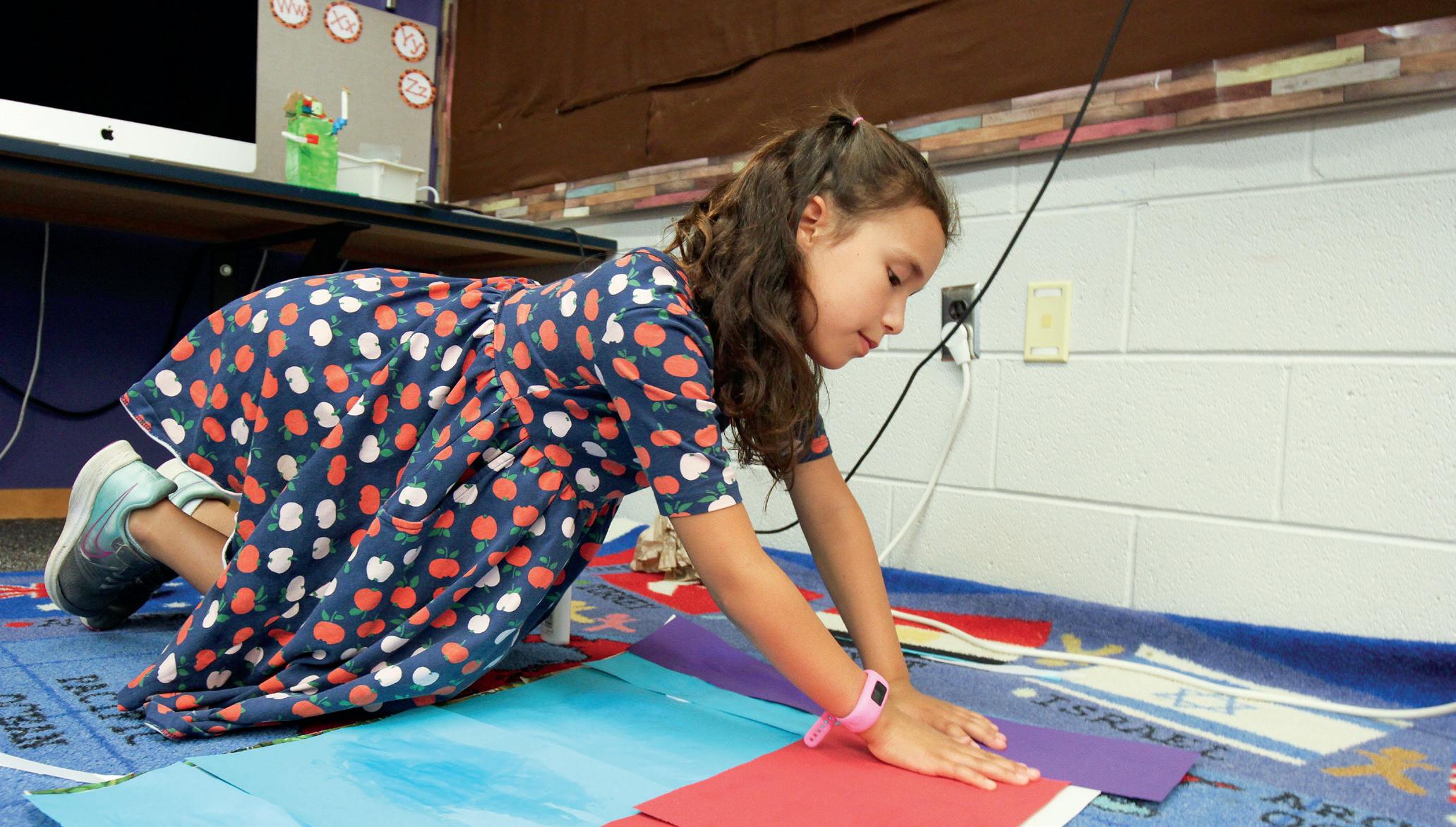

“I like doing research about cats a lot. I'm a big cat fan. I’m making a cat board game. It’s called Fix the Cat. The goal is to answer the questions correctly and collect the cat tokens, and if you collect all of them you win the game.
I made the tokens in Maker’s Empire. There are two types of questions: Manx cat questions and American shorthair cat questions. The most fun part was in writing the questions, I got to learn the answers to the questions, so I know more about cats now.”
— James
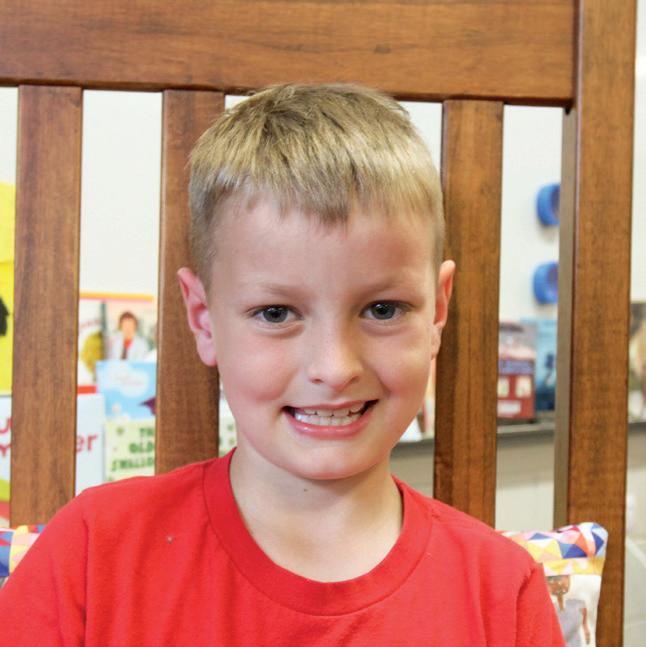
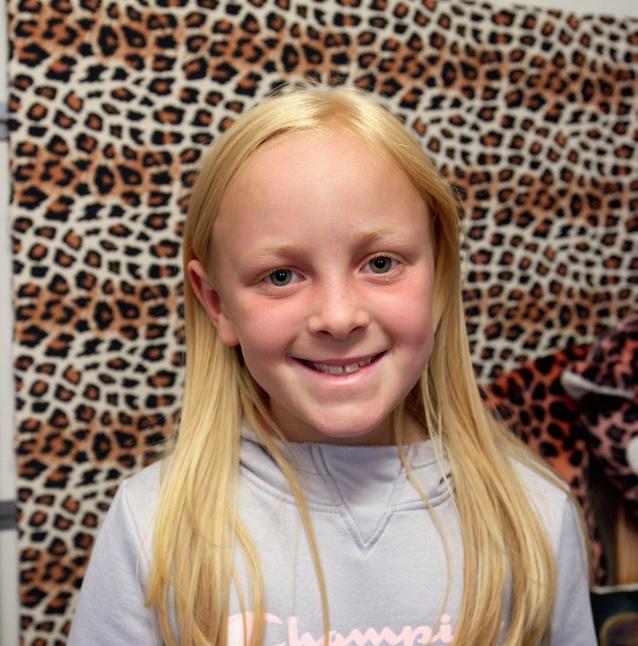
“In Passion Power Hour, I learned how to knit. I think I just wanted to learn something new that I didn’t know, and my grandma does it, and she taught me the basic steps on how to do it, and that got me interested in it. Knitting is hard at first. You go through a lot of challenges. The hardest challenges were getting your hands to make the moves right. At first I looked at books and then I eventually figured out that looking at a video would be easier. It gets easier as you go because you’ve learned how to do it and what to do, and you just keep going through it. And eventually you can make anything you want and turn it into anything.”
— Leigh
Story and Photo by Kathy McPherson
COVID-19 was not the impetus for adding a mental health counselor to Durham Academy’s Preschool faculty, but the pandemic certainly accelerated a discussion that began several years ago.
Preschool Director Christian Hairston-Randleman said “probably for the last three years or so, we have been discussing the possibility of additional support for the Preschool.” She explained that Lower School counselor Martha Baker has been available to advise or support the Preschool, but Durham Academy’s youngest students, their teachers and parents needed a counselor of their own.
“When the pandemic came about, we had a sharp increase in the number of students and families who needed support, whether from challenges with working in isolation during the remote learning or from parents having difficulty getting students motivated,” Hairston-Randleman said.
“When we transitioned back to school [on campus], there was an increase in angst and apprehension and anxiety for students,” she continued. “We had a group of students who had never been in a structured educational setting because childcare centers and learning spaces were closed or they were still operating remotely. So we had a ton of need and felt that it was time for us to have dedicated support for the Preschool.”
Dr. Megan Klenk, a clinical psychologist, joined the Preschool in August 2021. Her part-time position increased from 10 to 14 hours per week mid-year and will be 20 hours a week in the 2022–2023 school year. Klenk was already familiar with
the school her son, a third-grader, has been at Durham Academy since kindergarten and she served as a substitute teacher in the Lower School in 2020–2021.
“Megan was onboarded and has been fabulous. In conjunction with that hire, we hired Danielle Wysenski as the learning support for the Preschool and Lower School,” Hairston-Randleman said. “Those two have formed a team, a collaborative effort to provide comprehensive support for students and families. Megan is addressing the social and emotional lens, and Danielle is primarily working with the academic lens. It’s provided a much more comprehensive support system for our families and students and also our teachers.”
Klenk said Durham Academy’s youngest students have definitely been impacted by interruptions in their learning opportunities.
“Some of our kids last year had no school or no formal schooling at all. They were home, and that's not typical,” Klenk explained. “That’s going to change what they had the opportunity to learn. It specifically impacts the kinds of skills that are relevant to being in school and managing your body in a group.
“Even for those kids who were enrolled at DA or elsewhere, pandemic school is not the same thing as pre-pandemic school,” she said. “There is a lot more external management of bodies in space. We’ve had the masks, and just thinking about last year, a lot of classes were split. They had reduced access to peers. They had less access to staff because, remember, we had virtual enrichments. It's
sort of easy to forget just how different school has been. That means they have learned different things, either from not being in school or being in a different type of school.”
The stress parents and caregivers have felt during the pandemic has had a tremendous impact on the mental health and wellness of young children.
“Our youngest kids are very impacted by this sort of emotional weather of their big people,” Klenk said. “As we struggle with stress, so will they, and sometimes the stress is significant.”
In her work at the Preschool, Klenk spends time each week with group activities in the two pre-kindergarten and four kindergarten classes. She also works one-on-one with students and is available to parents and teachers.
Hairston-Randleman said Klenk works with teachers “to develop classroom support for students who may experience some challenge or difficulty or with teachers who notice that the entire class is struggling with a particular area. She will help teachers plan instruction to support those needs as well.”
Kindergarten teacher Jessica Crowe Whilden ’00 explained that Klenk’s weekly time with her students might involve reading a story or doing an activity on mindfulness or emotions.
Whilden said Klenk is also in Preschool classrooms observing and providing an extra set of hands throughout the week. “Other times she’s in here specifically to guide SEL [social emotional learning] instruction. She is here to teach the kids something that they can

practice. The relationships that she’s formed with my students are invaluable. They love her, they run up to her, they hug her. They know that she is a resource for them.”
Klenk also spends time each week researching preschool curriculums for social emotional learning, a frequently used term that she said involves self-awareness, self-management, social awareness, relationship skills and responsible decision-making.
“I think about trying to strengthen them just the way that being a strong reader will help you learn anything,” Klenk said. “Having strong social emotional skills, particularly with regard to emotion regulation, benefits mental health and wellness and that's what we want. We want our kids not just to be physically healthy to the extent possible, we want them to be mentally healthy.”
Klenk loved children and knew she wanted them in her life she
had worked both as a nanny and as a teacher but it was a personal experience with the terror attacks on Sept. 11, 2001, that drew her to psychology. She had graduated from Brown University, was teaching history in New York City public schools and pursuing a master’s in teaching at Columbia University when 9/11 occurred. Klenk had interests in history and psychology, but wasn’t ready to take the leap into a Ph.D. program. The events of 9/11 changed her mind, and she earned a doctorate in clinical psychology from Duke University.
“That spring, after 9/11, I was teaching at Stuyvesant High School and a lot of my kids had been directly impacted,” Klenk remembered. “We saw, every day actually, the remains being loaded onto barges. It was hard. I didn't feel like I had the skills that I wanted or needed to help those kids in the way they most needed to be helped. Because they didn't most need, right then, American
history. They just didn’t. That was what caused me to finally make the decision to go into psychology.
“It’s interesting that we’re at a place in our country now where it's not just a few kids but it’s all our kids who are hurting because of a challenge that our country, and in this case, the world is facing, and this time I had some of the skills.”
In March, Durham Academy began a mask-optional policy, and then increasing COVID numbers locally led to DA reinstating a mask mandate just before the end of the school year. Hairston-Randleman said Klenk has been instrumental in helping students adjust to such policy changes.
“When I think about what lies ahead, my hope is that we can continue to draw on the strength of our community and that we can continue to collaborate,” Klenk said. “To do the best job we can for our students, we're going to need to continue to partner with our parents. And we're all going to need to stay flexible because there are things that we don’t know now that we’ll know in the future about what our kids need.
“… We’re all going to need to give each other grace, and we're all going to need to pull together,” she continued. “But I have a lot of faith in the DA community, both on the parent side and the staff and faculty side, now having been a part of both. I believe in our ability to work together to really help our kids as much as they need.”
Hairston-Randleman said the last two years have been really difficult for the Durham Academy community. “Teachers have been asked to serve in a capacity that they didn’t necessarily sign up for and they've all done so graciously and wholeheartedly. It's nice to feel like we’re moving back toward normalcy. Megan has been a champion for our students but also our faculty, making sure that we are considering self-care and taking care of ourselves so that we can be the best educators for our students.”
Story by Victoria Muradi, Director of Strategic Initiatives, and Kristen Klein, Assistant Head of School
All around us, the world seems to be making changes to the way it looks, lives, works and relates to one another. I read somewhere that one in five Americans have reevaluated their lives post-COVID. Some of us have a habit that we adopted or left behind. Others may be contending with the “quarantine 15” or a COVID beard. And for others of us, the pandemic brought on larger existential changes. Companies and entire industries are reevaluating. Is going back to “normal” necessarily good?
Durham Academy is no exception. While DA is proud of the adaptive innovation developed over the last three years, one of our goals is to become an even more nimble institution. In fact, our large size and relative success have sometimes kept us from trying new things.
For example, we’ve long believed that our Upper School schedule was dizzyingly confusing for students. The schedule did not allow for enough depth in each class nor enough brain breaks. In March 2020, online school provided the testing grounds for different ways of breaking up our time. Hybrid learning during the 2020–2021 academic year also nudged us toward more agility. We began asking: How might we shape our day around both student needs and our shared values? So, this year’s Upper School schedule includes longer class periods, a healthier homework load, ample gathering time and less emphasis on midyear and final exams.
Buoyed by some of those recent successes, the Strategic Vision Goal 3 working team of faculty and staff members which seeks to help DA adopt a more agile mindset, allowing the school to innovate more boldly embarked on a year-long quest this fall. What would it look like to have innovation become a pervasive part of our school culture?
We began with selecting some of the most pioneering adults in our community. Rather than putting hopes in the next big thing or exciting technology, we asked them what it would take for a shift in mindset. Team members had many conversations about their own experiences as early adopters at DA. We learned that what motivated innovation was our students, from whom they generally received positive feedback. However, they often faced obstacles from adults. Parents and fellow teachers were sometimes wary of innovators straying from tradition or consistency. We were surprised to hear would-be innovators say that they often perceived they needed “permission” from peers and administrators, even though many of the changes they were implementing were mission-aligned and best practice for their students. Our team identified a tension between the innovation that we say is important
and the institutional structures that can limit it. So, the team quickly began developing the framework for further seeding innovation throughout the school.
On April 1, Durham Academy launched the Innovation Journey Fund. As the Administrative Team budgeted for the 2022–2023 academic year, each department/division set aside funds so that faculty and staff could chase DA’s four strategic priorities: prepare our students for life, meet the needs of all learners, adopt an agile mindset so we can innovate more boldly, and broaden and deepen our work with diversity, equity and engagement.
We surveyed and had conversations with the National Association of Independent Schools and schools across the country that had similar innovation grant programs. We gathered valuable lessons from institutions like Georgetown Day School, Head Royce School, The Galloway School and St. Patrick’s Episcopal Day School. DA’s Administrative Team and Innovation Think Tank (the rebranded Goal 3 working group) collaborated to design a website and application that both met logistical needs and encouraged a culture of constant innovation. A short video was also created by the Innovation Think Tank.
Throughout April, the Innovation Think Tank held Lunch and Learn sessions on each campus to incubate ideas. The Innovation Journey Fund has created exciting energy on campus. Colleagues can be seen huddled around the tables in the Upper School quad, working in classroom pods, or connecting across divisions through Microsoft Teams to talk through their ideas both nascent and fully baked.
Our first application deadline was May 1. Despite a worry that we might start with only a few intrepid innovators, we received 26 separate submissions that reflect many promising proposals. Faculty and staff on the Strategic Vision working teams are proposing ideas based on the empathy work and the extensive student feedback gathered this fall and winter. They are joined by faculty and staff in every division of the school.
Our grant application review team, comprising Innovation Think Tank and Administrative Team members, has reviewed about half of those 26 proposals and awarded the first group of Innovation Journey Grants. We will review the remaining proposals and award additional grants in the weeks ahead. This exercise in iterating and learning has been a valuable one for our faculty and staff. What better way to model for our students than trying, learning, failing and repeating? After all, success is a process.
Led by our sustainability coordinator, Durham Academy will engage two sustainability consultants, one focused on education for sustainability and the other focused on the environmental impact of operational decisions, in order to both develop ongoing sustainability education efforts and operational benchmarks and goals to mitigate adverse environmental impact. After the first year, DA will have concrete goals and action steps. Divisional sustainability coordinators will lead efforts within each division. This journey will have students at the center and prepare them for leadership. Through it, DA will join the educational institutions at the forefront of sustainability, educating all and demonstrating solutions in our curriculum, culture, operations and infrastructure.
This proposal was evaluated as part of the Innovation Journey Fund process, but did not require a monetary commitment. Durham Academy has installed a variable font developed by an educational therapist working with Google that makes words more readable, based on who is reading them. The font is designed to improve reading proficiency and improves comfort, accuracy and fluency for neurodiverse students who have reading disorders. Lexend is currently available through Google Docs, but it is not easily accessible and is dependent on the internet browser. The Lexend font is now available as an option on all DA iPads and laptops.
By the 2023–2024 academic year, DA hopes to offer a fall-semester honors-level math modeling course that is open to any student who has successfully completed Honors Precalculus. In the course, students will practice using an iterative problem-solving process; explore mathematical and statistical ideas and techniques that are useful for modeling; and develop skills with advanced technology, such as MATLAB, for quantitative analysis. As part of the experience, students will organize into small teams to compete in the High School Mathematical Contest in Modeling (HiMCM) in early November and the Math Modeling Challenge (M3 Challenge) in late February.
As DA looks to realize our Strategic Vision, especially preparing our students for life beyond DA and college, we look for ways to help students apply what they’re learning inside the classroom and engage with the broader community. The Triangle Community Connector will be
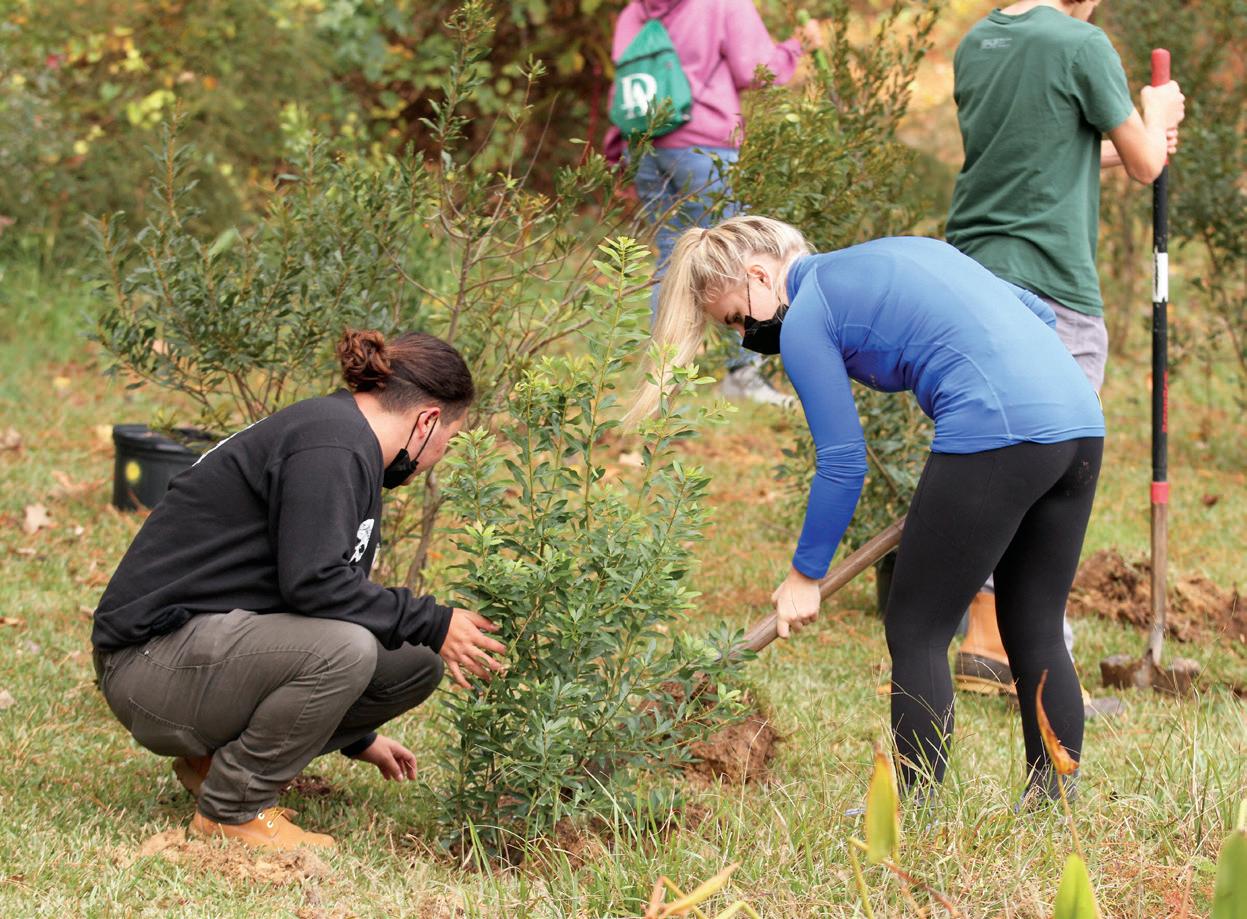
pivotal to helping Upper School students connect with DA parents, DA alumni and other community partners. These connections will result in the critical “hands-on” opportunities that will ensure they gain professional experience AND engage with the broader Triangle community all at the same time. The goal will be to provide students with professional work experiences and internships that bridge course work and potential career options.
After completing different book clubs in their fourth-grade curriculum, one fourth-grade class will lead book clubs for each second-grade class during the month of April 2023. This work will be an extension of the fourth-grade curriculum by giving fourth-graders the opportunity to apply what they have learned throughout the fourth-grade reading curriculum. This project is directly aligned to the book club unit in the second-grade curriculum that is taught in April.
Fifth- and sixth-grade students will use the power of virtual reality and augmented reality to learn languages. With Occulus Quest and apps like ImmerseMe and Mondly, students will be able to visit another country and interact with native speakers in a 360-degree virtual environment.

Scan
about the Innovation Journey Fund.
Durham Academy Upper School’s Independent Learning Program has exploded in popularity among students, going from not quite a handful of participants annually a couple of years ago to nearly 25 students signed up for independent study projects in 2022–2023. And the growth isn’t just in the numbers, but also in the commitment students are exhibiting for their self-designed courses.
With a more robust proposal process and a solid structure of support along the way, Upper Schoolers are chasing their interests — ranging from healthcare discrimination and robotics automation to American Sign Language and biomedical engineering — with a dedication that excites Tina Anderson Bessias ’78, who has led the Upper School’s Independent Learning Program for the last three years.
“We’re sort of cultivating curiosity by asking more questions about what you want to learn, and we’re supporting it with a more systematic approach,” Bessias said of the proposal process. “Plenty of people have a fleeting thought of something they’re curious about, and maybe almost every student has fleeting thoughts about things they’d like to learn, and what we’re doing is enabling them to learn more about it.”
The Independent Learning Program is open to students in 10th grade and up, and projects can span the length of a summer (made possible by grants from the Jack Linger Explorer Fund), one semester, two semesters or an entire calendar year. Prior to an independent study project being approved, each student must secure a commitment from a faculty content advisor and create something of a syllabus in which they organize and prioritize resources and process steps.
“It’s more flexible than a syllabus because I tell them, you are both the teacher and student in this course, and you can change it as you go along,” Bessias said. “But it’s better to have a plan and a sense of direction.”
Students are required to make regular posts to their individual independent study blogs, which

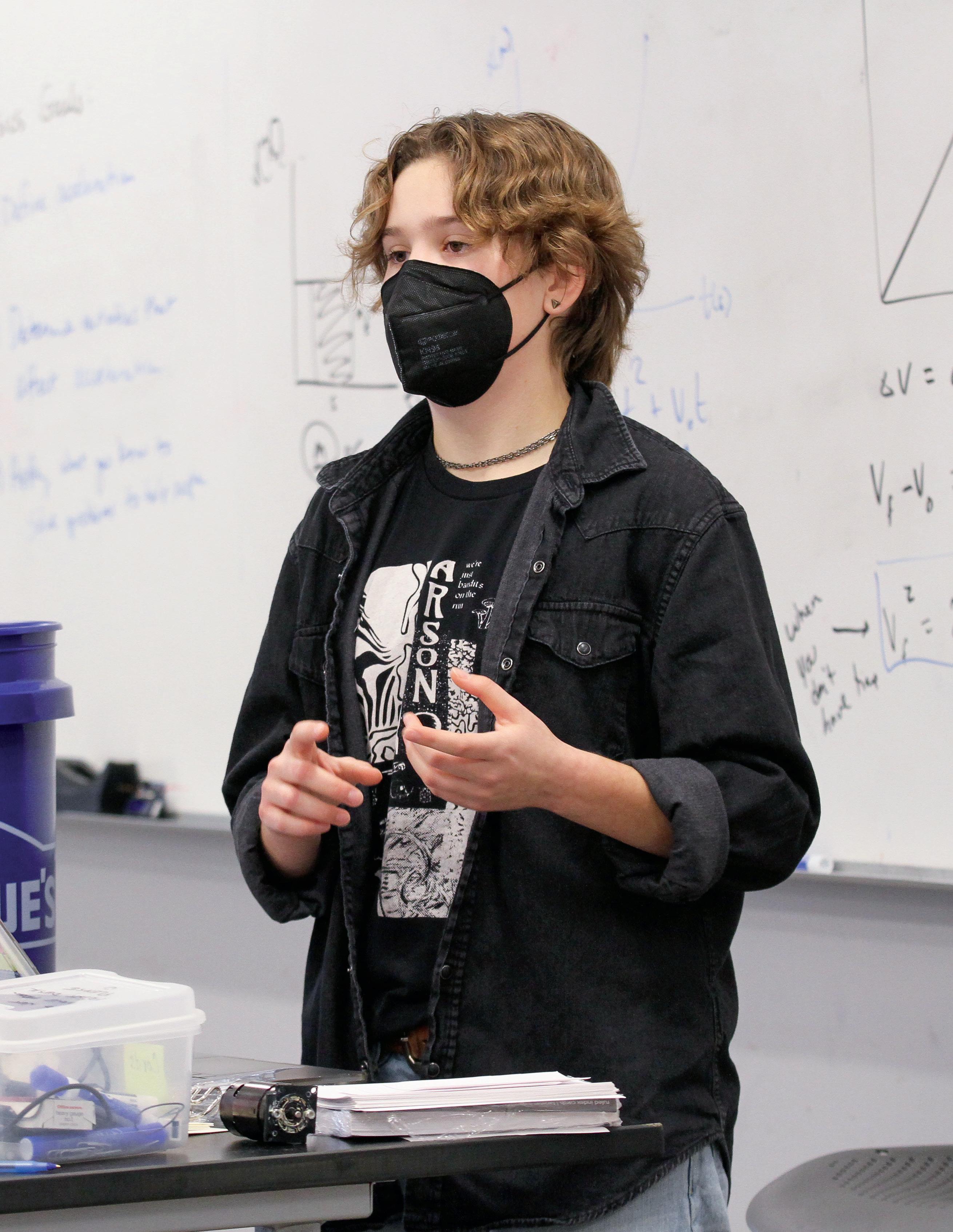
serve as both an accountability measure and a way to broaden the project’s impact.
“The blog enables conversation with people who are interested, whether it’s Uncle Fred in Montana or your friends on campus, or a teacher who has an interest or whoever it might be,” Bessias said. “And it makes the independent study less lonely.”
Read on for excerpts from a few of this year’s blogs.

Scan to explore all of the 2021–2022 projects via the Durham Academy Independent Learning Program website.
Product design and sustainable living practices have long been passions of Mirella Kades ’22, and Kades married those interests in their independent learning project, which began as a Jack Linger Explorer Grant project in summer 2021 and continued in the fall 2021 and spring 2022 semesters. The project aimed to answer two driving questions: How humanure toilets and biogas digesters can be used as a sustainable sanitation, agriculture and energy solution, and how the system can be generalized to achieve some of the United Nations’ Sustainable Development Goals. To answer these questions, Kades designed and built a composting toilet and biogas digester system, with the intention of allowing people to produce biogas for energy, compost and liquid fertilizer from what is collected in the toilet.
Feb. 6, 2022
“The most challenging part so far has been figuring out how to build a churning mechanism that is located in the center of the solid waste container. The mechanism is used to churn the solid waste and coat it in peat moss, sawdust, coconut coir, etc. This mechanism is challenging to design because the crank used to churn the waste needs to be detachable, and the crank needs to function from the top of the toilet, not the side. Designing this system in a way that it won’t interfere with the user and stows in the housing for the toilet has been an exciting challenge. …
I am continuing to learn about learning from others. I had a great conversation with Tate Staples ’22 that led me to brainstorm how to apply my project to larger infrastructure. Ella Simmons ’23 and Dave Chandler taught me how to use a lathe to round the bottom of the hex shaft that I plan on using for the main post of the churning mechanism. I have always been interested in learning how to use a lathe, but it was very cool to be taught by a friend who has a lot of experience.”
Avery Davidson ’22 began his two-semester independent learning project in August 2021 as an aspiring conductor eager to explore the mechanics of conducting and what makes a great conductor successful. By May 2022, he was a conductor in his own right, having conducted musical ensembles both within and outside Durham Academy’s walls. In the months between, he spent countless hours observing DA music teacher Michael Meyer and Duke Symphony Orchestra conductor Harry Davidson (who happens to be his father), as well as annotating symphonies by Mozart and Beethoven and arranging a composition.
May 1, 2022
“I had three conducting concerts last week (something I never thought I’d say at this age). Two of them were with the [Durham Academy Upper School] instrumental ensemble and one of them was the Jordan High School Musical, Bright Star The instrumental ensemble got better and better as the days went on. We had two dress rehearsals: one of them I couldn’t make, but the other I was there for. I conducted them in my own arrangement of the march called Spirit of ’44, and they practiced it so well that all we needed to do was polish up some things. This means that we focused on the connectivity of the lines, making sure the specific articulation and dynamics I wanted worked, and definitely keeping track of tempo. …
The first concert was in front of the whole school, which I was happy about; I got to finally show my fellow classmates what my passion is by example. Sharing what I learned through actually showing what I want to do was a great treat. Both the concerts with the instrumental ensemble were great because we were all in it together. And then, the big test was Bright Star. … [The performance] went so well that the orchestra was nominated for TRS
(Triangle Rising Stars) for Best Orchestra (the judges just so happened to show up the night I was conducting!). Therefore, I think this independent study has been a great success, and an even better one than I intended. Technically speaking, I was nominated for being part of leading that orchestra. This independent study gave me so much.”
It’s often said that the best way to learn is to teach, and that’s the approach Taylor Winstead ’24 took in her spring 2022 independent learning project focused on linear algebra. Working with Durham Academy Upper School math teacher Dr. Andrew Prudhom as her advisor, she posted a weekly video in which she explains what she has been learning by sharing practice problems and how she has worked through confusion or frustration in solving them.
April 4, 2022
“One of the biggest [lessons from the Independent Learning experience], that I didn’t really even realize until being asked about it, is how rewarding it can be to explore something completely because of a passion, and (mostly), unconnected to college, and the future. Yes, I won’t lie, colleges often responding to independent studies did go into my decision, however, several people asked why I chose linear algebra, and I said the truth: that I am much more of a humanities focused person; I have my career in history or law planned out, this summer I will spend a week finishing my novel at a summer program, and three weeks taking several humanities college courses through another program. I do congressional debate, my sixth class is a second language … by any standard possible, I am a more humanities focused person. And yet … I chose this.
So the answer that I gave, is that I chose this because it is sort of my last opportunity to really spend a lot of time exploring something that I just love, rather than an AP that makes sense for a certain college that I want to go to, or soon after that, a class that I have to take for my major. I have always loved math, and this was a way to tap into that passion, even though it’s not my end goal. Before this week’s presentation I had not realized that so much of my motivation for this specific study was to capitalize on the last remaining time I have to learn just for the sake of learning.”
Allison Preble ’23 focused her fall independent study project on advocacy and support for students with learning differences at Durham Academy. It’s a topic close to her heart, having been diagnosed with dyslexia as a first-grader, and she was driven by a desire to “help kids like me succeed in school.” Informed by interviews with students with learning differences, she collaborated with DA learning specialists to create content for a digital toolkit for teachers that contains access to resources and information to support neurodiverse students. She also presented her findings and shared her unique perspective with Upper School teachers at a faculty meeting.
Oct. 22, 2021
“In a typical classroom setting, your teacher gives you a plan. Over the years, I’ve learned how to succeed in an environment where the teacher tells me what to do, and I do it. But with an independent study, I’m having to learn in a totally different way. Admittedly, I’ve spent time spinning my wheels, shaping and reshaping my ideas and plans. The ‘independent’ part of the study is an important and challenging component. I’ve spent a good bit of the first two months of the semester planning, researching and organizing. I’ve also focused on seeking out experts who can help me shape a final product. Just getting started and figuring out the best process to achieve a good outcome is challenging because I don’t know what I don’t know. … Looking ahead and looking back I can see the solid framework that I have built, and the more creative and collaborative work I am beginning. I am building on the student survey and adding a video. I plan to interview several students with learning differences who will share their stories and experiences of navigating school while learning differently. For me, storytelling is a powerful learning tool. There’s so much more to a student than a diagnosis. I hope hearing student perspectives in their own words will bring more empathy and understanding of the strengths and struggles that come with learning differently.”
STORY BY LESLIE KING
Among the strategic initiatives that received the most positive response this school year was the launch of parent affinity groups. The concept of affinity groups was initiated by Durham Academy Middle School students in 2015, and since then, with the support and collaboration of DA’s Diversity, Equity and Engagement (DEE) team, they have expanded at the request of Upper and Lower School students.
Affinity groups are also available to faculty and staff, and this year, in conjunction with the Parents Association Diversity Committee, the initiative has expanded to include parents and caregivers. Parent affinity groups were launched in fall 2021 and have had opportunities to meet several times since then, most recently at the DEE Spring Engagement Night. We asked the following affinity group members about their experiences this year:
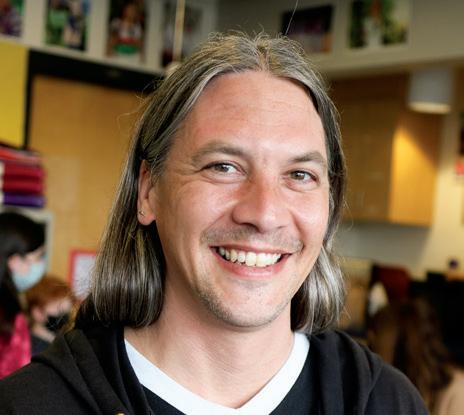
Dan Gilson
White Action and Accountability Group Leader, Foster and Adoptive Parent Affinity Group Leader, Preschool and Middle School Parent, Extended Day Director
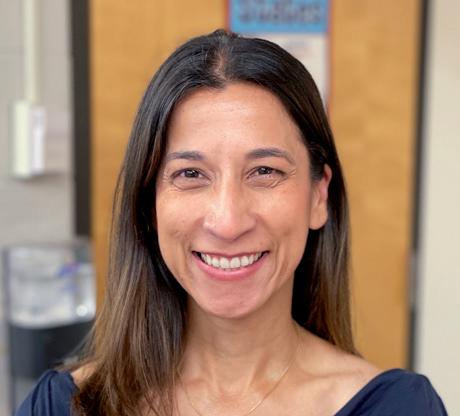
Sarwat Husain
Muslim Affinity Group Leader, Upper School Parent, Lower School Teaching Assistant

Neeta Saxena Asian and Pacific Islander Affinity Group Member, Preschool and Lower School Parent

Charity Watkins
Black Affinity Group Member, Parents Association Diversity Committee Co-Chair, Preschool Parent
Why are DA’s parent affinity groups a priority for you personally?
Watkins: As a Black mother, it's important for me to have an affirming space to not only learn from the experiences of other Black caregivers but to also share celebrations, create meaningful relationships and obtain strategies to ensure our children are thriving.
Gilson: Affinity groups have the ability to offer a unique experience that creates community and promotes positive action and growth.
Saxena: To bring awareness of different cultures to others, including mine.
Husain: They helped me connect with other Muslim families at DA, enabled our children across divisions to meet
and get to know each other and, most of all, enabled us to be part of a group that can find meaningful connections with each other. Fortunately for us, this group has started to evolve into a family friends network, too.
How would you describe the need for parent affinity groups at Durham Academy and why now?
Watkins: Although my experience at Durham Academy has been very positive around issues of diversity, equity, inclusion and engagement, we have to acknowledge that this is still a primarily white space. Therefore, there's always the possibility that conscious or unconscious bias can affect how we interact with each other and build community. The affinity groups provide a space for caregivers from minority groups to process those experiences of micro or
macroaggressions and then to come together to inform the larger DA community on any harm experienced and proactive ways to prevent it from happening again.
Saxena: Kids of different backgrounds need to feel a sense of belonging with others of similar background and celebrate their traditions also as “normal” instead of feeling like an outcast or the minority.
What have you most enjoyed about your experience this year?
Saxena: Connecting with others who have similar backgrounds and upbringing. Feeling like I belong, also!
Husain: The Muslim Affinity Group [MAG] parents have met on several occasions with families. We have found many connections professionally and also appreciated our cultural differences. We celebrated Ramadan together and met again on Eid day for prayers and a social gathering afterwards. We recently organized a community service project with the MAG students as part of our Ramadan celebration and hope to continue many more such traditions around our faith-based holidays. To find this group through school has been tremendously rewarding for us and for the other families as well.
Watkins: I’ve just appreciated hearing other caregivers discuss how meaningful and affirming these affinity groups have been for them.
Gilson: Meeting others in similar circumstances.
Some people view affinity groups as divisive. How would you counter that narrative, specific to your experience at DA?
Husain: I used to think so, too, until I became one of the members (and faculty facilitators) of an affinity group. I quickly realized that affinity groups can be much more than just an exclusive group — they can be agents of change, platforms for expression and places to connect with others (which normally may not happen otherwise).
Gilson: As a member of an adoptive affinity group, these shared experiences are incredibly valuable and cannot be replicated with folks who are not in this group. Having these affinity groups also helps identify common struggles and how to overcome them, which results in better relationships with those not in your groups. If we don’t recognize, appreciate and celebrate the differences we have (and the unique beauty/struggles that go along with them), we can’t truly appreciate and celebrate one another.
Saxena: I think DA is doing an amazing job with creating various affinity groups and one could join multiple groups that one could relate to.
Watkins: We are all composed of multiple identities, with many of us finding ourselves being a part of minoritized groups more often than the majority. Providing affirming spaces for individuals to process their experiences as
members of minoritized groups at DA doesn’t create division; division naturally exists. However, affinity groups promote the development of strategies to bridge across those divides, to find commonalities across differences, and to build a community that acknowledges the strength of diversity.
How do you see parent affinity groups at DA evolving in the future?
Watkins: I see caregiver affinity groups working more closely with faculty/staff and student affinity groups. I also see more opportunities for groups to interact and learn from each other.
Husain: I see parent affinity groups playing an important role in admissions and welcoming new members in our DA community. I also hope that through parent affinity groups we will find resources for parent engagement on campus with the larger student body as well. I am grateful that DA initiated parent affinity groups. While we knew of each other (other Muslim families at DA), we never really had an opportunity to meet each other. Another parent commented “I never knew that there were so many other Muslim families here at DA.” Since most of the Muslim Affinity Group families do not belong to other outside organizations or clubs where we can connect and socialize with each other, affinity groups have created a platform where we can reach out, connect with and work toward common goals. We are happy to have met like-minded families and know that while we are all different, have different backgrounds and ethnic origins, and practice our faith just a little bit differently, we also have many things in common. For our particular affinity group, finding ways to build community amongst our kids and families has also been a valuable and important part of affinity groups. As our children move from Middle to Upper School, they will have stronger bonds with others in this group, and our hope is that they can build a strong identity and representation in the DA community.
• Asian and Pacific Islander Parent/Caregiver
• Black Parent/Caregiver
• Foster and Adoptive Parent/Caregiver
• International Parent/Caregiver
• Jewish Parent/Caregiver
• Latinx/Hispanic Parent/Caregiver
• Multiracial Parent/Caregiver
• Muslim Parent/Caregiver
• Parents/Caregivers of LGBTQ+ Students
• Parents/Caregivers of Students with Food Sensitivities or Allergies
• Parents/Caregivers of Students with Learning Differences
• Secular Parent/Caregiver
• Single Parent/Caregiver
• White Action and Accountability Parent/Caregiver
For nearly two years, many of the once-familiar sights and sounds of Durham Academy’s campuses were missing due to COVID-19 mitigation measures. Campuses were closed in spring 2020, and the school operated in a hybrid remote/in-person model for much of the 2020–2021 school year. But with students on campus five days a week in 2021–2022 cherished activities and traditions have returned as the school begins to transition from pandemic to endemic COVID-19 and a “new normal” of school life.
Performing arts productions so often a dance between performers and an appreciative audience just aren’t the same over a Zoom connection. So the return of in-person performances to Durham Academy auditoriums meant a great deal to the student musicians, dancers, actors and production crews.
One of the first groups to return to the stage was the cast and crew of Eurydice, the Upper School fall play, in October.
“It was really hard because it was my junior year and I didn't know if we would go back senior year to ‘normal,’” stage manager Neha Srivats ’22 said just before Eurydice opened. “I thought maybe Addams Family [the 2020 winter musical] would have been my last production at DA, and I was really sad. It's really crazy because it feels like so long since I've done something like this, but also I feel like no time has passed. I feel like we're just getting right back to normal.”
Since then, there have been about a dozen arts performances in Kenan Auditorium, including musical ensembles, dance concerts, the annual A Cappella Jam and the winter musical, Twelfth Night.
by Kim Walker
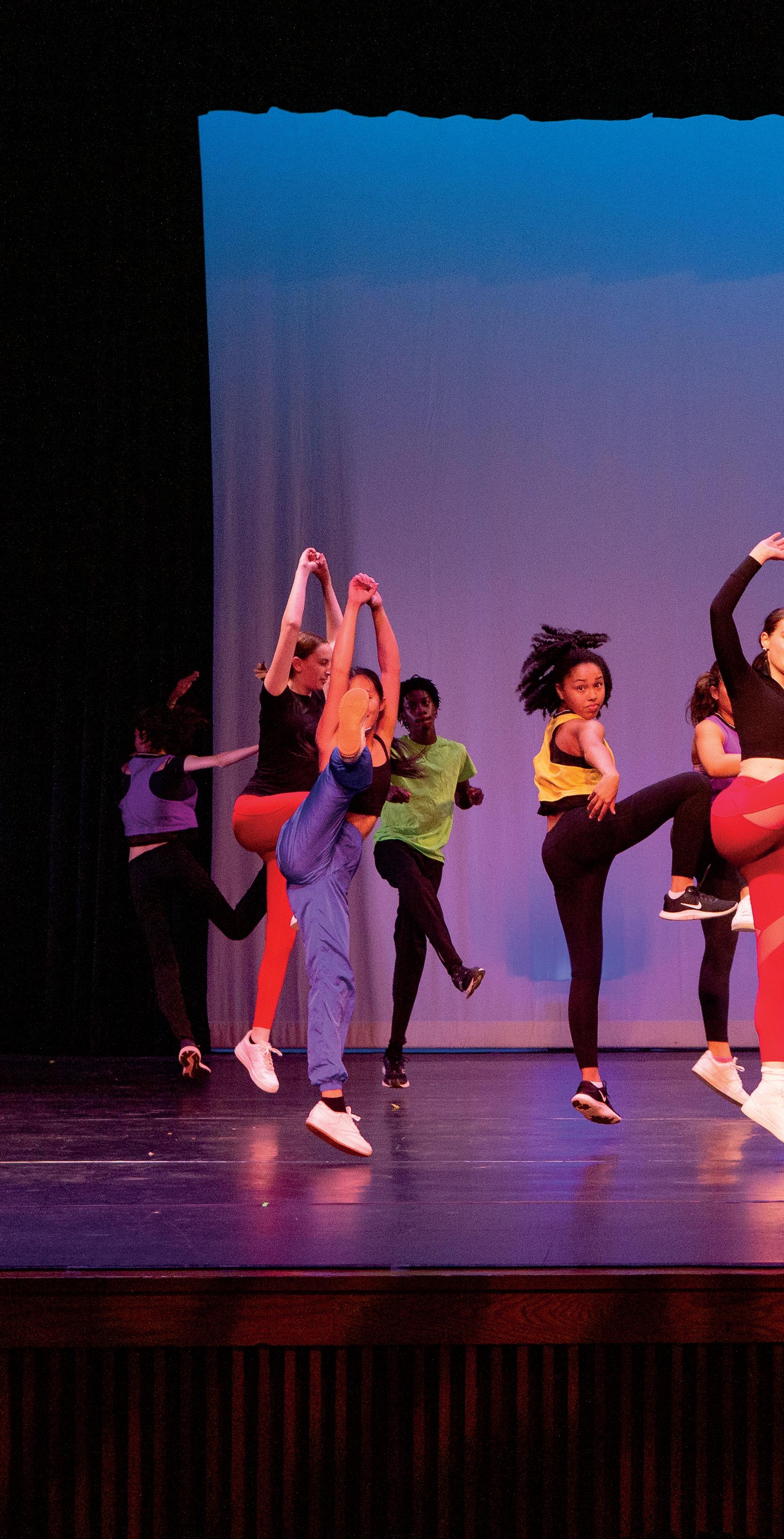

On the Middle School campus, perhaps even more anticipation had built for the return of performing arts. After all, the brand-new Horton Hall a 500-seat auditorium, now Durham Academy’s largest gathering space needed to be christened. As students took to the stage this year for music ensemble concerts, movement shows, theatre performances and a musical showcase, the evidence of their hard work seemed fitting for the grandeur of the new space.
“[We] just got to witness an incredible feat of genius, humor, ensemble work and artistry this afternoon,” Middle School movement teacher Mary Norkus said in an email to colleagues after watching the seventh- and eighth-grade play. “… The laughter from the house and the courageous and polished energy of the actors was such a gift. It has been a long haul since the last drama production in Taylor Hall [the since-demolished former Middle School auditorium]. They are back!”
In early April, members of Durham Academy’s speech and
debate program competed in their first in-person event since February 2020, and they did so in grand fashion: The team won the Governor’s Cup at the 2022 Tarheel Forensic League State Championship tournament, marking the school’s second consecutive state speech and debate championship. Highlighting a long list of individual student accolades at the tournament, Mukta Dharmapurikar ’22 was named the John Woolen Student of the Year.
“After over two years of virtual competition,” coach Crawford Leavoy said, “this tournament set up an unprecedented challenge: Compete at the most important tournament in the state in a modality that three-quarters of the team had never competed in.”
Versatility and flexibility have been hallmarks of the team, which has transitioned from in-person to online, honed skills in hybrid practices, and taken on the challenge of once again competing in person.
Team members also hosted a virtual version of the Cavalier Invitational & Challenge in mid-January, and their hard work was rewarded
with the National Debate Coaches Association’s William Woods Tate Tournament of the Year honor. Durham Academy, which has hosted the tournament since 2015, is one of two award recipients this year.
This year’s Cavalier Invitational run by Leavoy and student tournament director McKenna Morris ’23, with help from classmates drew nearly 1,000 student participants and judges representing 91 schools from across the nation.

When Durham Academy’s Science Olympiad teams traveled to Raleigh for the state tournament in late April, it had been more than two years since they last competed in a fully in-person competition.
15 Upper Schoolers and 15 Middle Schoolers qualified to compete in the Scan to watch a video documenting the Cavalier Invitational.
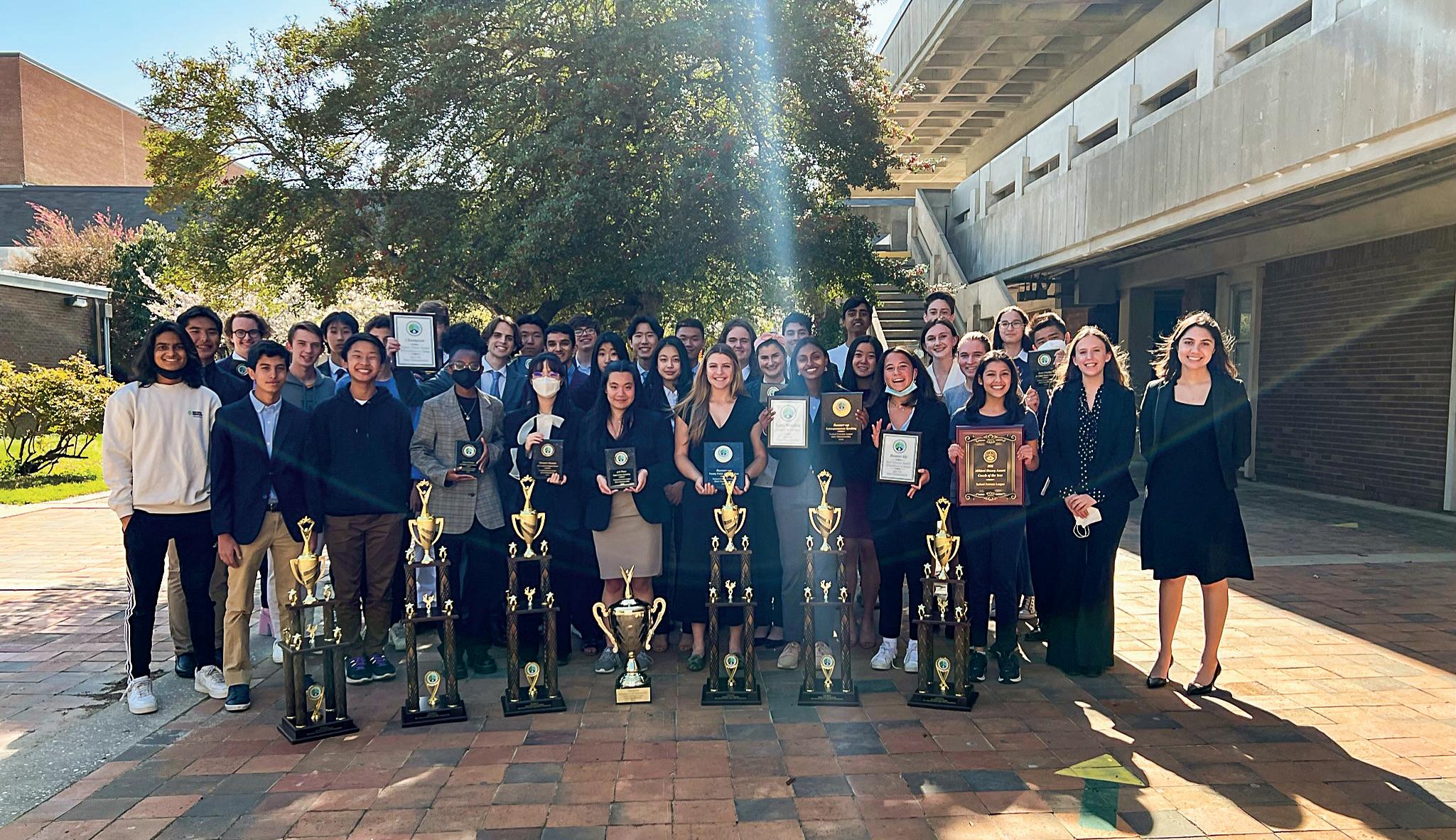
state-level competitions by virtue of their performance at regionals.
“This was the first time in two years that the teams competed fully in person, and it was exciting to interact with other teams and students from across the state,” said chemistry teacher Dr. Jen Look, who coaches the Upper School team along with Upper School science teacher Andrea Caruso. “We are incredibly proud of all our Science Olympians who participated throughout the year. They explored their interest in a wide range of STEM topics, practiced great teamwork skills and had a lot of fun.”
The Upper School team won medals in six events, including first in the state in Anatomy & Physiology (ninth-grader Oliver Guan and senior Julianna Hallyburton). The Middle School team finished 16th in the state overall, medaling in five events, including first place in Bottle Rocket (eighth-grader Kent Lee and seventh-grader Adam Tsui).
“This team showed great spirit and also proved that the future of DA Science Olympiad is very bright,” said Middle School coach Howard Lineberger, who teaches Upper School science. “Our parental support was invaluable and was the best that I have seen during my 24 years as a DA Science Olympiad coach.”
The relaxation of COVID protocols allowed for the return of cherished community events hosted by Parents Association this year, including longtime favorites like the All-School Picnic and Turkey Trot.
Volunteers reinvented a few activities, like hosting grade-level-specific Dine With DA dinner gatherings for families. And in response to parents’ desire for more opportunities to connect with other adults, Parents Association hosted an evening of adult workshops focused on topics like cookie decoration, charcuterie board creation and dance for fitness.
After a two-year hiatus, students were particularly thrilled to welcome back Parents Association’s
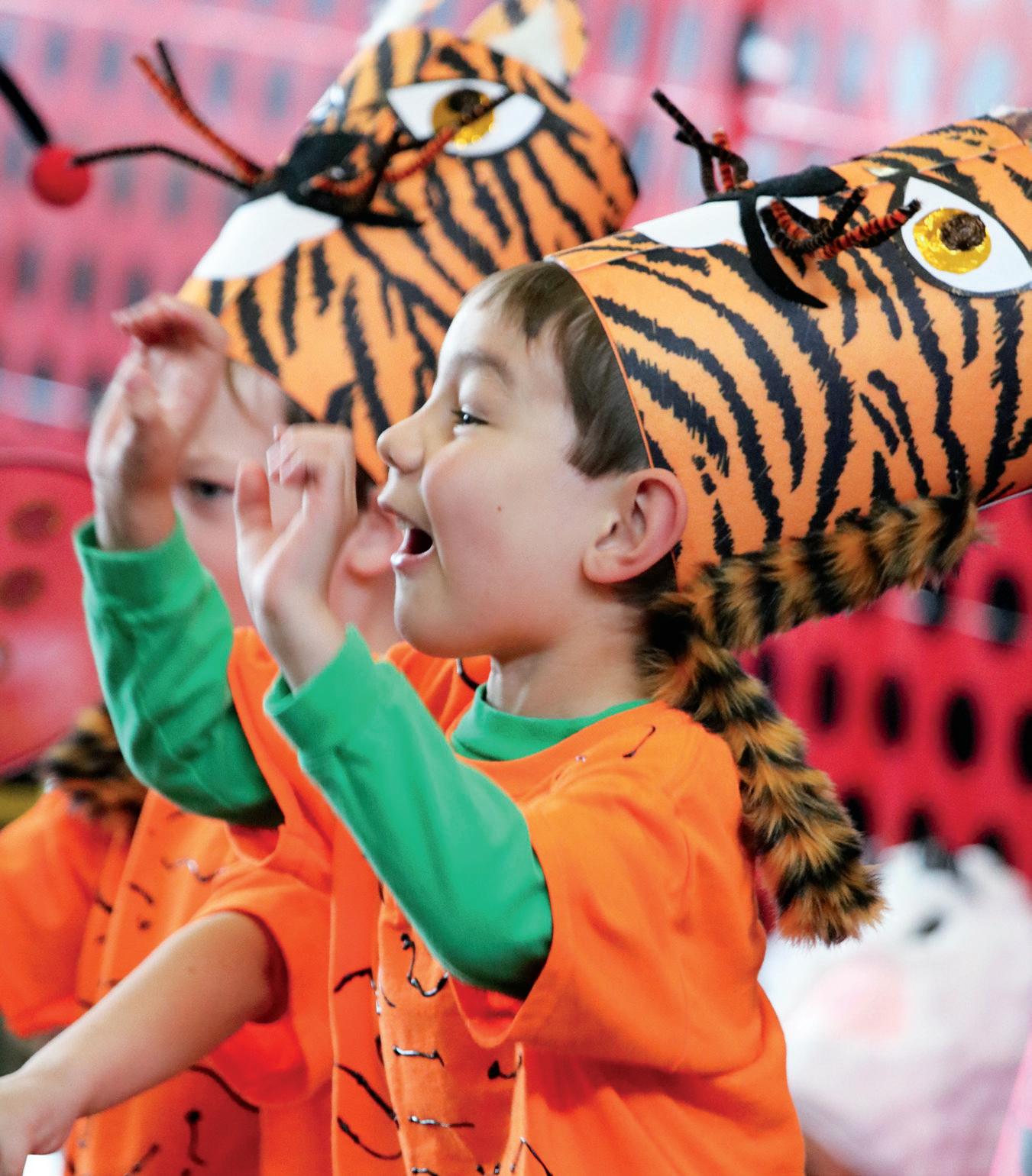
Used Book Sale and Bake Sale in April. For Lower Schoolers, the book sale marks a much-anticipated mini field trip and preview of the Middle School. The sale resulted in $9,500 being raised for Durham Academy and many thousands of books enriching the lives of DA students, faculty and staff plus about 2,500 books being donated to literacy support organization Book Harvest and other community organizations.
First- and second-graders staged a music performance for parents and caregivers in March with a theme that was representative of how much of the Durham Academy community has felt over the last couple of years: “We’ve MISSed You: Movement, Instruments, Songs, Stories.”
Preschoolers have been delighted to perform class plays and belt out their favorite Fall Songfest musical numbers for audiences filled with adoring family members. And Nanas, Papas and Abuelas were all smiles as they watched third-graders light up the Brumley Performing Arts Building stage for Grandfriends Day. “We’ve missed you! And we are so excited to have you here to share some of our favorite movements, instruments, songs and stories from music class with you,” Lower School music teacher Luke Hoffman wrote in the program for the first- and second-grade music performance. “… Despite the challenges of the past couple of years, sharing my passion for music in such a wonderful environment makes teaching a true joy.”
Story by Kathy McPherson // Photo by Owen Burson ’25
When Durham Academy’s Upper School robotics team, DARC SIDE, headed to Asheville in March for a district meet, it was the first time in more than two years that the team had competed. The restrictions of the pandemic canceled robotics meets in March 2020, and only a few of DARC SIDE’s 24 team members had ever experienced competition.
But DARC SIDE — which stands for Durham Academy Robotics Club: Students in Design and Engineering — took second place in Asheville and claimed second place
• Ryan Bauroth ’25
• Owen Burson ’25
• Bryan Cornejo ’23
• Charith Fernando ’23
• Brandon Fox ’24
• Anand Jayashankar ’24
• Mirella Kades ’22
• Danielle Li ’25
• Pratham Madaram ’24
• Gil Mebane ’24
• Chris Morris ’23
• CJ Nwafor ’23
• Kanishk Pandey ’25
• Shreya Rao ’25
• Sarah Ridley ’22
• Bobby Rossilli ’24
• Isabella Scurria ’24
• Ella Simmons ’23
• Emily Simmons ’25
• Jason Sorin ’24
• Tate Staples ’22
• Lukas Stone ’23
• Everett Wilber ’24
• Imhotep Truitt ’23
at the Guilford district meet the following weekend. The team ranked seventh among North Carolina's 66 teams and was among 32 teams that qualified for the state championship at Campbell University in April. DARC SIDE came in 11th at states — the top 10 teams from North Carolina qualified for the world championship in Houston, Texas — barely missing the cut for a competition the team had been to twice in previous years.
DARC SIDE is coached by Forrest Beck, Leyf Peirce Starling ’99 and Dave Chandler. In addition to their coaching duties, Beck teaches robotics and serves as the network manager with the school’s Office of Information Technology (OIT); Starling teaches robotics and physics at the Upper School; and Chandler works with the Upper School’s invention studio and the OIT team.
DARC SIDE, which launched in the 2016–2017 school year, competes through an organization called FIRST (For Inspiring and Recognizing Science and Technology) in the FRC (FIRST Robotics Competition) division. Beck thinks robotics is popular with students “because it lets us do many different facets of engineering. We have electrical engineering and mechanical engineering, computer science or computer engineering. We can tap into all these different engineering fields and have students explore all these different engineering fields through robotics.”
Charith Fernando ’23, one of DARC SIDE’s three co-captains, wants to pursue engineering and said “DARC SIDE provides the perfect introduction to the engineering industry. Robotics is not only about building the robot, but it's also about getting acquainted with working as a team in the engineering
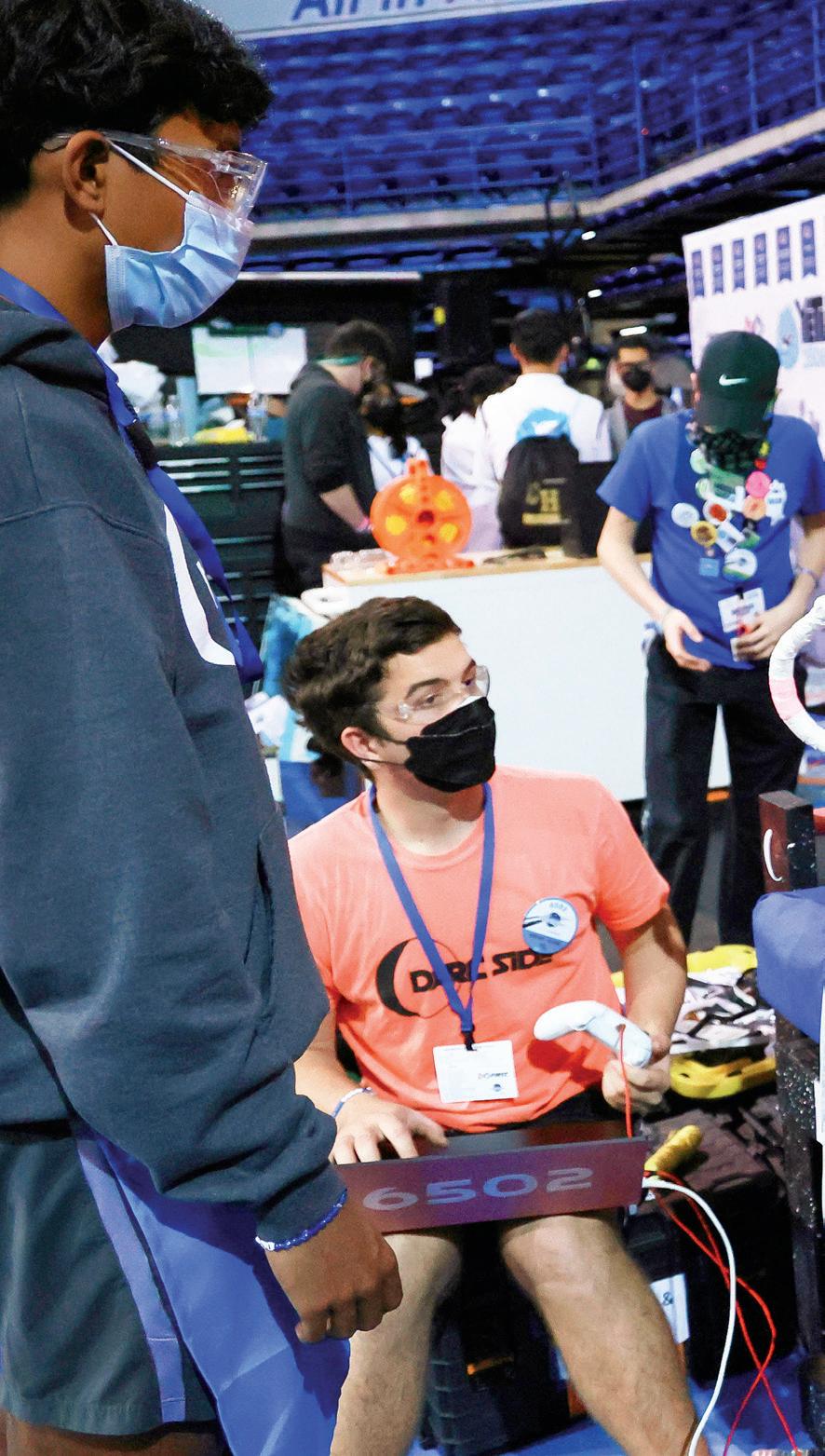
field. I was really drawn to not only learning more about how to become a better engineer and build better robots, but I was also interested in how I could become a better leader and a better person through working in a team.”
He joined DARC SIDE two years ago as a ninth-grader and said the robotics club made good use of time when the COVID-19 pandemic shut down competition. The club was away from the robotics lab completely when school abruptly went fully online in March 2020, but DARC SIDE returned to the lab when in-person instruction resumed during the 2020–2021 school year.
“We got back and we did an intrasquad competition where we split the team up into four small teams and built four small robots that compete so that the underclassmen could learn skills from the upperclassmen about how to build a robot,” Fernando said. “I think that was integral to our success this year because we had some of the basic skills.”
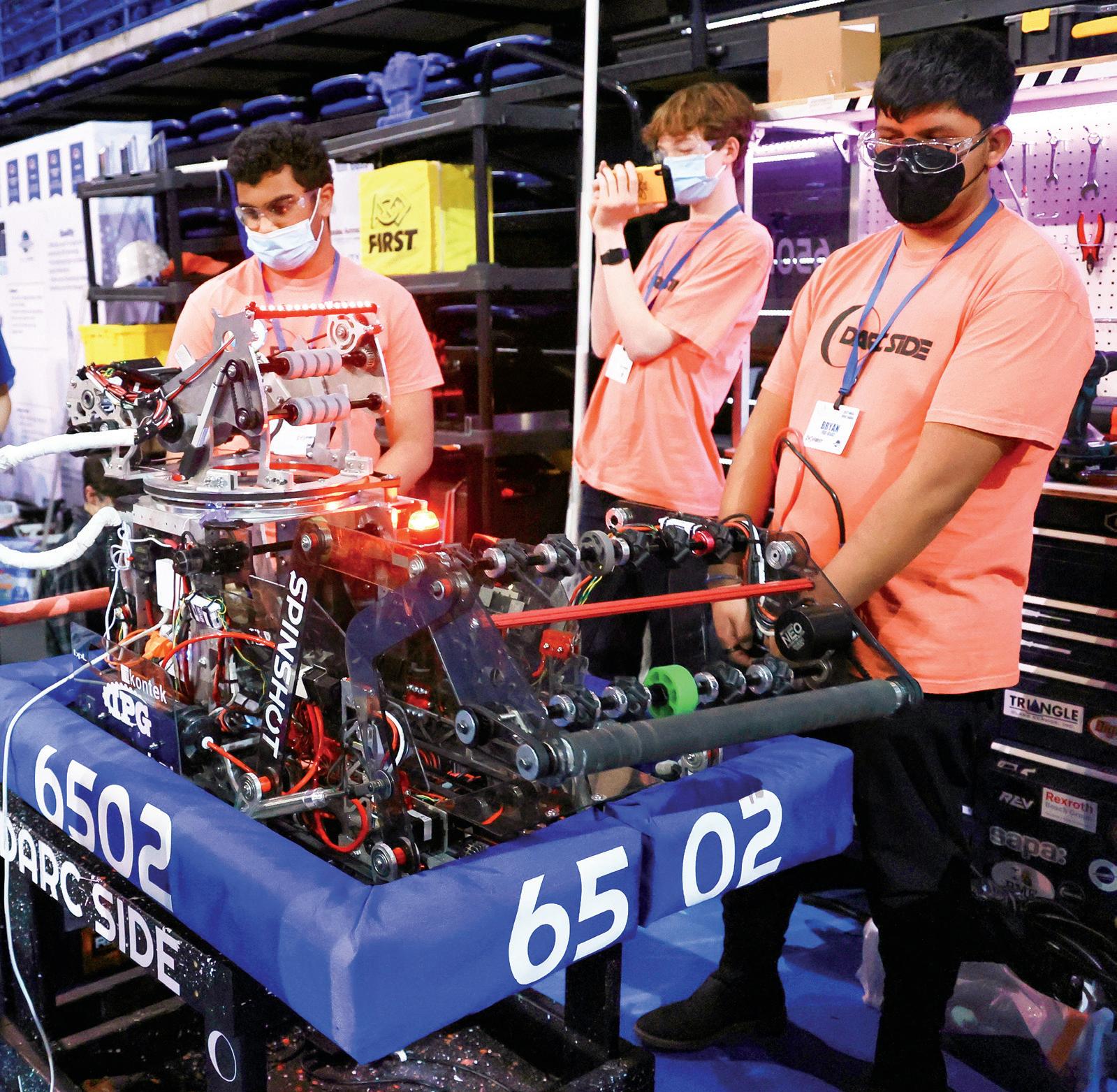
Ella Simmons ’23 is another DARC SIDE co-captain who joined the team as a ninth-grader. Looking back at 2019–2020, she said “that was a COVID year. We didn't know it yet, though, so we built a full robot and we took it to competition. That was the last competition that I'd gone to until [March 2022], so a very long hiatus.”
As a ninth-grader, Simmons said she helped with tasks like cutting but was not part of the design process for the robot.
“I think this year we've had a really wonderful experience building a robot from start to finish, especially because I hadn’t built a robot before and no one else on the team had really built a robot before,” she said. “So this was a new year for everyone.”
Building a full robot is a process that usually begins each January. This year’s DARC SIDE team and coaches gathered in DA’s Kenan Auditorium on Jan. 4 to watch the kickoff from FIRST, announcing the game for the 2022 competition. The game has a different theme each year — Disney
and steampunk are among the previous themes — and all the details are spelled out in a 400-page manual that teams must follow closely.
Aerospace company Boeing partnered with FIRST on this year’s game, which had a transportation theme, and DARC SIDE began work immediately after kickoff.
“The kickoff is all about strategy and brainstorming and prototyping and building,” Starling said.
The team designs and builds a robot that will skillfully accomplish the tasks of the game while not exceeding a perimeter of 120 inches, a height of 42 inches and a weight of 120 pounds. And building the robot is an ongoing process.
“We’ll go to a competition and we'll learn something,” Beck explained. “That thing that we built broke easily. We'll see something another team is doing and we’ll adapt it into our robot. You’re always making it better. It’s never perfect.”
Ninth-grader Emily Simmons, the daughter of two engineers and
sister of DARC SIDE co-captain Ella Simmons, said there was no question that she would join the team when she got to the Upper School.
“The team has really helped with my teamwork skills and communication, but also there are so many knowledgeable people that you just learn from them,” she said. “One of our programmers, Everett [Wilber ’24], has taught me a lot more about software and stuff that I wouldn’t have known before, how to use certain apps. Even on the mechanical side, which is more what I'm familiar with, I’ve learned so much because there's so much knowledge on the team.”
When it comes to competition, the ninth-grader said “it’s a mix of a lot of fun and a little nerves.”
Bobby Rossilli ’24, in his second year with DARC SIDE, said he was initially drawn to robotics because his sister [Emma Rossilli ’21] was on the team. “I had gone to a few of her competitions and I got to see what was happening. I didn't actually know how the robots worked or how much time was put into it, but I got to see how the competitions were and how fun they can be.”
Rossilli said it was rough with the team not going to competitions last year, but he has appreciated participating in this year’s robotics competitions, which have an environment that’s much like that of a sports game. The stands are filled with cheering spectators — teams not currently competing, as well as parents, friends, alumni and parents of alumni.
Because DARC SIDE’s logo is the moon (i.e. the dark side of the moon), Rossilli and his teammates created a moon mascot costume, and he proudly wore it to competitions.
“The amount of cheering I did in the last competition, I lost my voice because I was yelling so loud but we did get the Spirit Award,” Rossilli said. “Our team, we’re so close knit that it’s just like a bunch of friends hanging out. And then we get to do something and we have a goal as friends and so it’s really fun.”

STORY BY GIB FITZPATRICK, MIDDLE SCHOOL MATH TEACHER // ILLUSTRATION BY SARAH JANE TART
“Which students deserve special recognition as they finish eighth grade?”
It was December 2012, and eight Durham Academy Middle School teachers sat in a circle after school. We had been tasked with answering that question and making recommendations about how to move forward. As we started, each teacher spoke about what they did and didn’t like about the traditions in place, which included multiple superlatives and distinctions awarded at an assembly and at closing exercises. It was immediately clear that there were widely varied opinions in the room, and that the path to consensus would be long and winding. But near the end of the meeting, that path straightened out.
“This is middle school,” one of the teachers remarked. As teachers of this age group, we believe and remind our students that they are works in progress. That taking risks, failing and learning from those experiences is key to their development as students and people. That perfectionism carries with it a dark side that can keep them distanced from new experiences and learning. That they are not competing against each other academically, but working together to create a community of learners. Singling out students for specific awards, despite best intentions, did not feel age-appropriate in middle school.
All of us had either won awards ourselves, felt overlooked when others were awarded or both. We had felt both the power of recognition and the bitterness of its absence. So we turned our conversation to how to balance those competing priorities. That’s when we hit upon the idea to recognize EVERY member of the eighth-grade class in a way that would be personally meaningful to each student.
Our recommendation was that each eighth-grader receive a personal letter from a faculty member at the end of the school year. Each letter would be written by a teacher who felt connected enough to that particular student to express appreciation for their contributions, recognize them for their achievements and maybe even offer some advice as they launch into high school. We hoped that those letters would be even more meaningful than any awards we might have maintained or added, while also giving us a chance to encourage them on their journey toward the 15 qualities we want them to develop as exemplified in The DA Graduate: A Mission-Driven Life qualities like empathy, courage, kindness, responsibility, integrity and more.
Of course, one big challenge was that there are more than twice as many eighth-graders as Middle School teachers! And the time it takes to write multiple sincere, meaningful letters at one of the busiest times in the school year meant we were asking a lot of our colleagues. To their credit, our faculty embraced that challenge and continues to work hard to do that every year.
It’s also quite a task to match up each student with a teacher who has volunteered to write to them and make
sure the entire class is covered. I volunteered for that role with trepidation, but it became one of the highlights of my year. It’s heartwarming to see the list of students with multiple teachers’ names next to them, indicating the many connections that they formed during their time in the Middle School. That list reveals how many of our students form bonds with so many different teachers.
“One senior even wrote me back to say, ‛Believe it or not, I have pulled out that letter a few times during my time in the Upper School when I needed a boost!’”
Gib Fitzpatrick
I can’t speak for my colleagues, but I find it joyful to write my letters, despite the effort it takes. I sit down and conjure each student’s face, where they sat in my classroom or played on the soccer field, my favorite interactions with them, the moments they made me smile (or cringe), and the hopes I have for them as they enter high school and adulthood. Sometimes I feel like the letters I write are more meaningful to me than they are to them! I save copies of them, and sometimes remember to re-send them to students when they’re seniors, just to remind them of how much they’ve grown. Middle school is a time many of them want to forget, but I think it’s worthwhile for them to reflect on that growth. One senior even wrote me back to say, “Believe it or not, I have pulled out that letter a few times during my time in the Upper School when I needed a boost!”
There are downsides to this enterprise, of course. Not every student can receive a letter from the teacher they would choose, so some are disappointed. Some would prefer more public recognition of their accomplishments. Some adults dismiss this as part of the “participation trophy” trope that de-emphasizes individual excellence.
But “this is middle school.” It’s messy, imperfect and frustrating. At the same time, it’s inspiring, surprising and foundational. Our goal with the eighth-grade letter tradition is to express our collective appreciation and admiration to each student in a meaningful way. As a community, we decided that the answer to the question we started with is “all of them.”
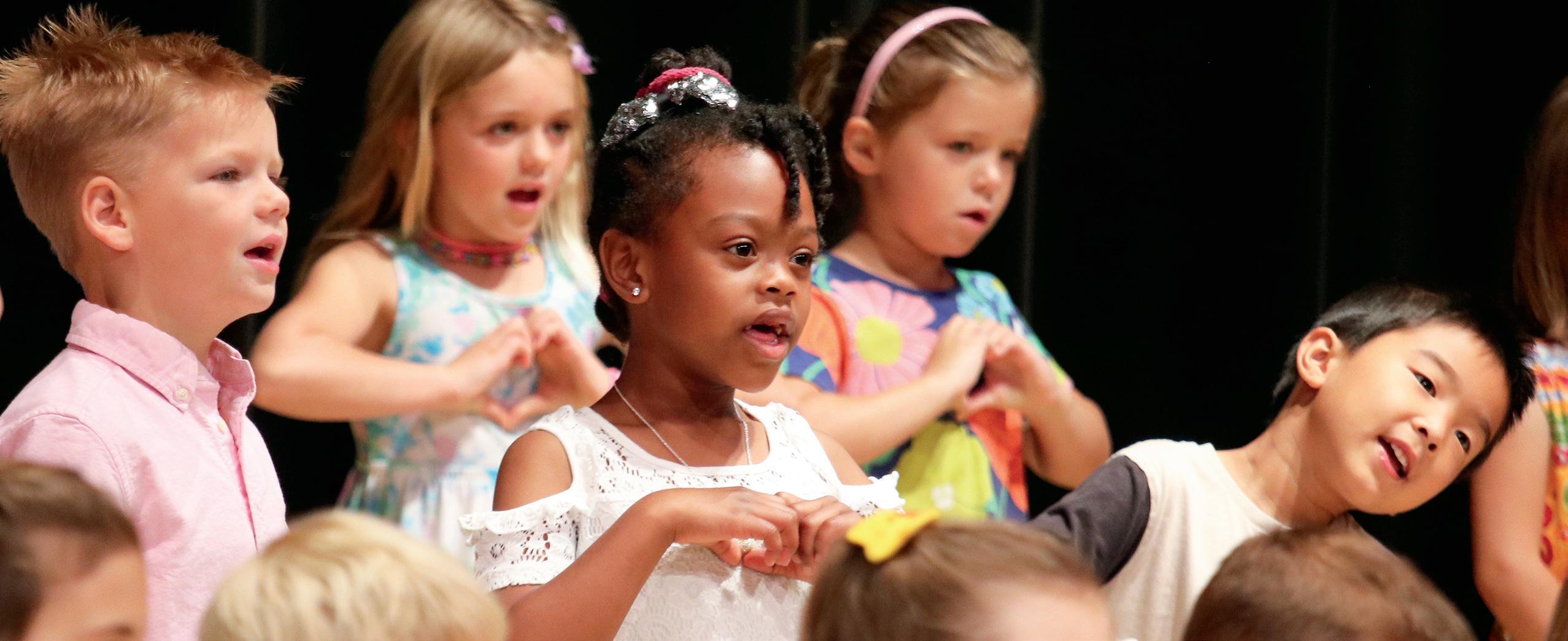
GREG MURRAY
Upper School Physical Education Teacher 43 YEARS
RANDY BAKER
Maintenance Foreman 41 YEARS
WANDA MOORE
Middle School French Teacher 34 YEARS
DAVID GLASS
Middle School Spanish Teacher 28 YEARS
XANDY JONES ’78
Administrative Assistant to the Head of School and Assistant Head of School 22 YEARS
ROSEMARY NYE MCNISH ’93
First-Grade Teacher 18 YEARS
CHRISTY BARUS
First-Grade Teacher 16 YEARS
DR. FABIOLA SALAS VILLALOBOS
Middle School Spanish Teacher 15 YEARS
LLOYDETTE HOOF
Kindergarten Teaching Assistant 13 YEARS
KELLY HOWES
Middle School Language Arts Teacher 12 YEARS
JENNIFER KLAVER
Third-Grade Teacher 11 YEARS
DR. HARRY THOMAS
Upper School English Teacher 10 YEARS
MOLLY PUNK
Middle School Science Teacher 7 YEARS
JAKE KAVANAGH
Upper School Technical Theatre Teacher 6 YEARS
EMILY WALTON Third-Grade Teacher 3 YEARS
PAUL SLACK
Upper School History Teacher 2 YEARS
GEMINA GATES
Nurse Consultant 2 YEARS
JAQUETA ABBEY ’04
First-Grade Teaching Assistant 2 YEARS
PAT JAMES
Social Media Specialist 1.5 YEARS
VICKI NAKAYOSHI
Assistant Director of Annual Philanthropy 1 YEAR
JOSH ANDRESKI
Upper School Athletics Intern 1 YEAR
ALEXANDRA SENCER
Upper School History Teacher 1 YEAR
DEB SHADDUCK
Pre-Kindergarten Teaching Assistant 1 YEAR (11 YEARS OVERALL)
DAN MARTELL
Upper School Interim Technical Theatre Teacher 7 MONTHS

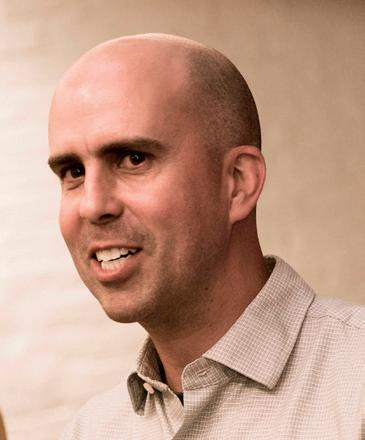

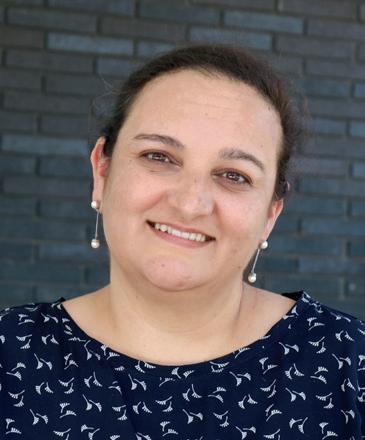
Ashley Horton Freedman ’97 is a volunteer at Durham Academy and in the broader Durham community and is the mother of three DA students Logan ’26, Hunter ’29 and Grayson ’33. She has served on the boards of Durham Habitat for Humanity and the F.M. Kirby Foundation, Inc., where she served as the foundation’s director. At DA, Freedman has co-chaired both the Parents Association All-School Picnic and the Benefit Auction, and she currently serves on DA Parents Association as a Middle School Parent Rep and on the Parent Athletics Committee. She also serves on the Philanthropy Committee of the DA board and the Campaign Steering Committee. Freedman holds a B.A. from Wake Forest University.
Three-Year Term
Dan Gonzalez is the president and co-founder of District C, a nonprofit organization with a modern internship model in which teams of students develop solutions for complex business problems. Durham Academy adopted District C’s teamship program in the Upper School, where it is an academic elective. Gonzalez earned a B.A. in engineering from Dartmouth College and spent part of his career as a high school physics teacher. Prior to District C, Gonzalez worked for test preparation company Manhattan Prep, and became the company’s president shortly after it was acquired by Kaplan. He joined Kaplan Test Prep’s leadership team, overseeing operations to deliver education services. Gonzalez served on DA’s Learning Environment Committee of the board in 2021–2022.
Three-Year Term
Christian Lundblad is the Levin Distinguished Professor of Finance and the Senior Associate Dean for Faculty and Research at UNC’s Kenan-Flagler Business School. He serves as associate dean of the Ph.D. program, director of research at the Frank Hawkins Kenan Institute of Private Enterprise, and director of the Center for Excellence in Investment Management. Lundblad previously served as a financial economist at the Federal Reserve Board, where he advised the Board of Governors on international financial market developments. He earned a Ph.D. in financial economics and a master’s degree in economics from Duke University and a B.A. from Washington University in St. Louis. He is a long-serving member of the DA board’s Finance Committee and is the father of Connor ’23 and Lucy ’26.
Three-Year Term
Rasna Kaur Prakash has served as a lead project coordinator and curriculum reviewer and developer with a focus on learning management systems at the university level. She is the 2022–2023 Parents Association president and has served as a room parent at the Lower, Middle and Upper School levels, as a Middle School division rep and as a member of the Welcoming Committee. Prakash holds a B.S. in business administration from the University of Pittsburgh. She is the mother of Veer ’22 and Aarav ’25. Parents Association Ex Officio Member: One-Year Term
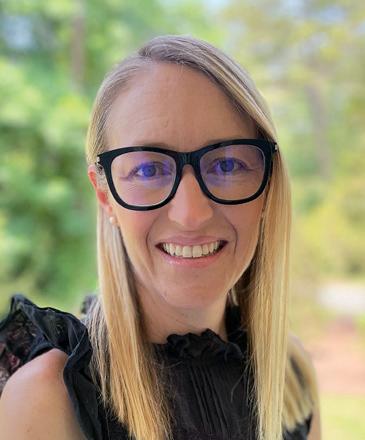
Ashley Yetman is a partner and director of strategy at Baldwin&, a Raleigh-based branding, design and advertising agency. Yetman’s career in building and revitalizing brands spans 20 years; she has worked with brands from startups to global corporations, including brands like Apple, Audi, AAA and Callaway Golf. She has served in various roles on the Durham Academy Parents Association for the last five years, including co-chair of the Turkey Trot 5K & Fun Run and the Caring Committee and Lower School room parent. Yetman has served as a member of the Communications Committee of the board for two years. She earned a B.S. in journalism and mass communication from the University of Colorado, Boulder. Yetman has two children who attend Durham Academy Finn ’30 and Bixby ’33.
Three-Year Term
Story by Jordan Adair, Upper School English Teacher // Photo by Leslie King
In 1988, the Durham Academy Board of Trustees established the F. Robertson Hershey Distinguished Faculty Award in recognition of former Headmaster Rob Hershey’s decade of dedication to faculty excellence. Since that time, 34 teachers have been recognized for their extraordinary talents and contributions. These
teachers represent the best in teaching at Durham Academy by:
• Inspiring enthusiasm in the classroom and encouraging academic aspiration
• Demonstrating sensitivity to the academic and personal needs of the individual student
• Encouraging and supporting the efforts of colleagues
• Promoting the cooperation of a broad spectrum of the Durham Academy community
• Contributing to school life outside the classroom
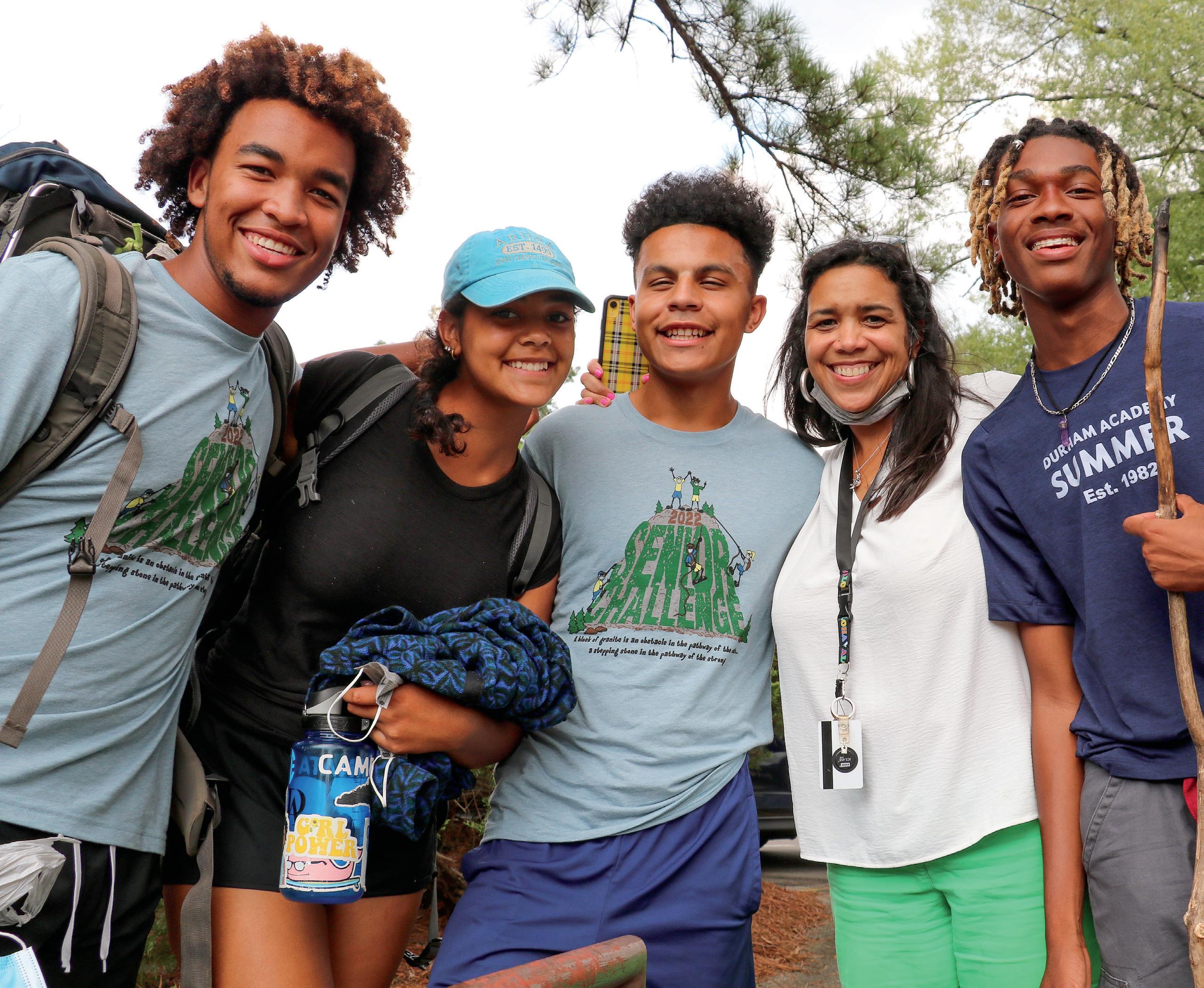
Since arriving at Durham Academy almost 20 years ago, Middle School learning specialist Dr. Cindy Moore has made her mark across the widest possible spectrum of the community, from students to faculty, administration and parents. As integral to the life of the Middle School as anyone could hope, she has, as one of her fellow faculty members writes, “the ability to inspire enthusiasm and encourage academic aspiration [as] part of her DNA … she gives of her time selflessly, never complains and is always willing to take on extra duties.” This is the depth of commitment of this year’s Hershey Award recipient.

Cindy’s Middle School colleague Virginia Hall writes, “she is one of the biggest cheerleaders of our students and can often be found outside of school attending extracurricular events to enthusiastically promote the abilities and dreams of our kids.” Her attentive support of our students came most clearly into focus during the pandemic and remote learning. Her kid-friendly, engaging and motivating presentations on study skills were lifesavers in a time when everyone needed tools for survival in a world that had been turned upside down. She held countless Microsoft Teams meetings with students to give them the tools and strategies they needed to maintain focus and get the most out of each and every session. Cindy reached out to her colleagues one-on-one and in smaller group meetings to provide them with helpful ideas for designing assessments that would meet the needs of all of our learners. She gave them direction by sharing the latest informative emails, videos and helpful articles, all in an effort to provide her colleagues with a variety of teaching tools and advice. Most crucially, she applied her accumulated knowledge of both learning successes and failures to help teachers discover new approaches that made a critical difference in our students’ growth throughout remote learning, and she made it fun for them!
It is easy in the hectic pace of the school year to hunker down and stay hyper-focused on the most immediate tasks of one’s job, but that’s not the way with Cindy. In addition to her work at the Middle School, her knowledgeable outreach to other divisions and to Hill Learning Center is legendary. She recognizes the unique and highly variable learning needs of all students, which has made her an invaluable resource for teachers, administrators and tutors across divisions. As a regular and essential attendee at grade-level meetings, her timely and precise contributions give teachers
just what they need to take steps to support their students. She is always available to work with her colleagues to coordinate both advisory activities and class lessons that complement grade-level objectives.
Though her office is a safe space for students, it is her willingness to move beyond those narrow confines that sets her apart from others. She has served on numerous search committees, task forces and smaller, more intimate groups as a way of helping to make a difference at Durham Academy. Cindy helped start student affinity groups, is a longstanding participant in the People of Color Conference, and has encouraged colleagues to step outside of their comfort zones and participate with her. She will do whatever it takes to help shape DA into the most inclusive, welcoming and progressive school it can be.
But perhaps what resonates most profoundly in this year’s recipient is the way she carries herself in this world. Words like: “friendly,” “cheerful,” “sincere,” “honest,” “compassionate,” “sensitive” and “dedicated” leap to mind when colleagues reflect on their relationships with her. As one Upper School colleague has said of her, “She always arrived at our meetings without an agenda, with an open heart and a desire to listen and learn.” You cannot put a price on qualities of this kind.
As one who has spent the bulk of her professional career at Durham Academy, Cindy has contributed to our school as a parent, a student advocate, a counselor, a listener, a coordinator, a friend and a cheerleader for her students. It is with distinct pleasure and deep gratitude for all that she has brought to DA to celebrate Cindy Moore as this year’s F. Robertson Hershey Distinguished Faculty Award recipient.
Editor’s Note: Jordan Adair was the 2021 recipient of the F. Robertson Hershey Award for Excellence in Teaching. The award has been presented annually since 1989 and was established in honor of Rob Hershey, head of school from 1978 to 1988. The Hershey Award was presented to Cindy Moore in June 2022 at the Middle School closing exercises.
We’re on the threshold of the most ambitious fundraising effort in Durham Academy’s history. These exciting campus transformations will not only support our talented students and teachers, but will continue our commitment to the excellence for which Durham Academy is known.
Step in. See what we’re truly building. Publicly Launching Fall 2022
Step forward into 21st century learning that opens the doors to limitless potential.
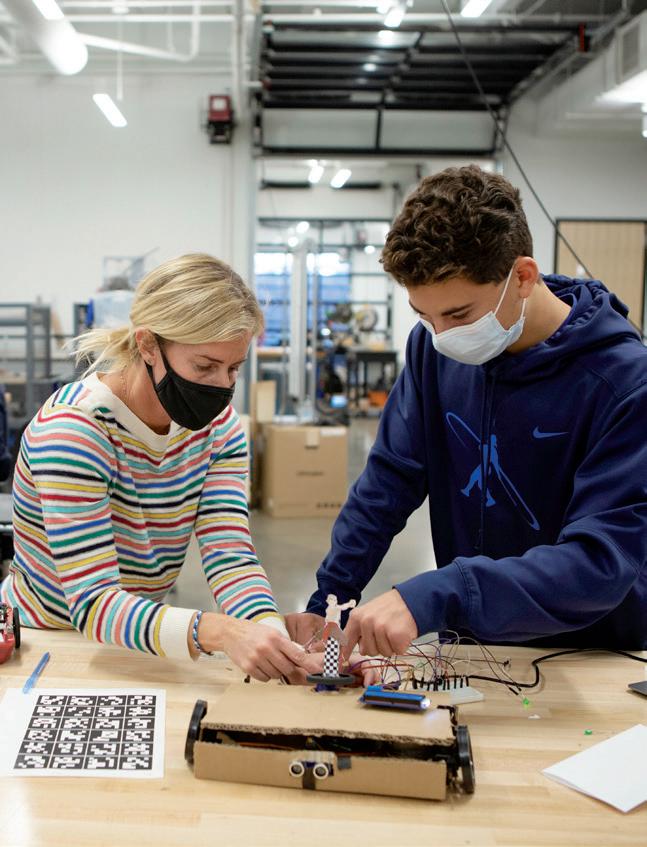
Upper School Campus Transformation
Fostering innovation and imagination in preparation for an unscripted future.
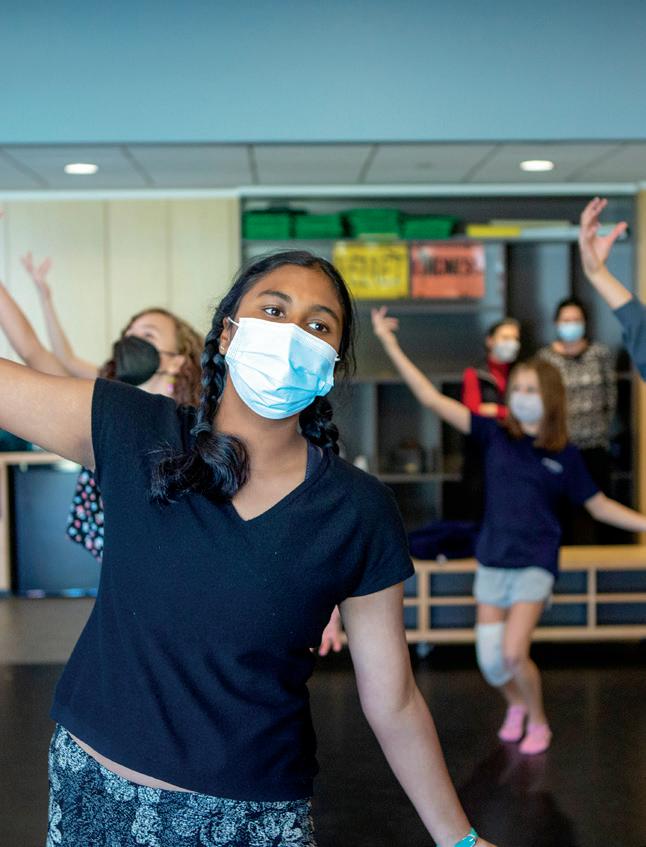
Middle School Campus Transformation
Setting the stage for exploration, inspiration and independence.
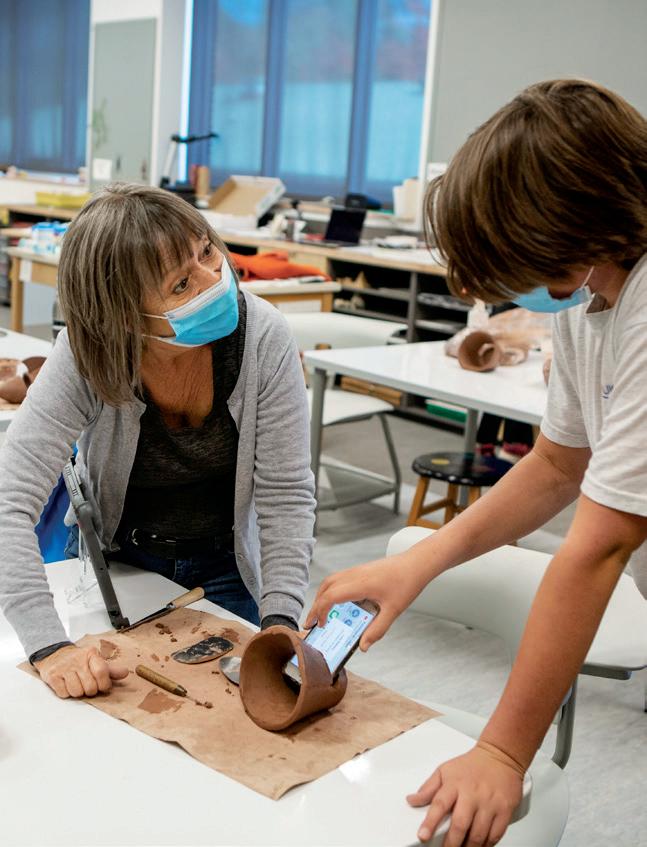
Durham Academy Fund: Annual Giving
The foundation upon which we build.
Phase 2 Upper School
Phase 1 Upper School STEM Wing
Humanities Wing K Family Outdoor Commons
Phase 3
Middle School Arts & World Languages Center
Phase 4
Middle School
Gateway Center (2021–Spring 2023) Math, Science & History Quad (Summer 2023)
New Campus Entrance (Summer 2024)
Phase 5
Middle School
New Gymnasium
Renovation of Existing Gym for PE and Expanded
Extended Day Center
Future
Project:
Phase 6
Middle School
Library
Language Arts Classrooms

23–24
One of the best parts of my job is being able to engage with Durham Academy alumni throughout the country, hear about what is going on in their lives and fill them in on all the exciting happenings here at their alma mater. We have been unable to make those connections in person over the past two years, and that has made things challenging for all of us.
So I felt especially grateful that we were able to gather in person on campus for the Spring Alumni Reception in late April. At that event held in Smith Hall in the recently completed Upper School STEM & Humanities Center we honored longtime DA maintenance foreman Randy Baker with the Faculty and Staff Legacy Award, recognizing the tremendous impact he has made in his 41 years of service. We also presented the Distinguished Alumni Award to Dr. Bradley Hardy ’98 in recognition of all he is doing in the world of economics (see page 64).
This in-person event served as a kick-off to what promises to be an action-packed year for the Durham Academy alumni community. We look forward to celebrating classes ending in 0, 1, 2, 5, 6 and 7 during Homecoming weekend, Sept. 23 and 24, 2022. And Head of School Michael Ulku-Steiner and I will be hitting the road this fall to host regional events throughout the country. Be on the lookout for those dates and locations (make sure we have correct contact information for you and your alumni family members at www.da.org/alumniinfo).
As always, we would love to offer you a tour of campus when you are in town, so please let me know when your travels bring you to the Bull City. A lot has changed in the last couple of years! I look forward to seeing you soon.
Go Cavs!
Tim McKenna Director of Alumni Philanthropy & Engagement
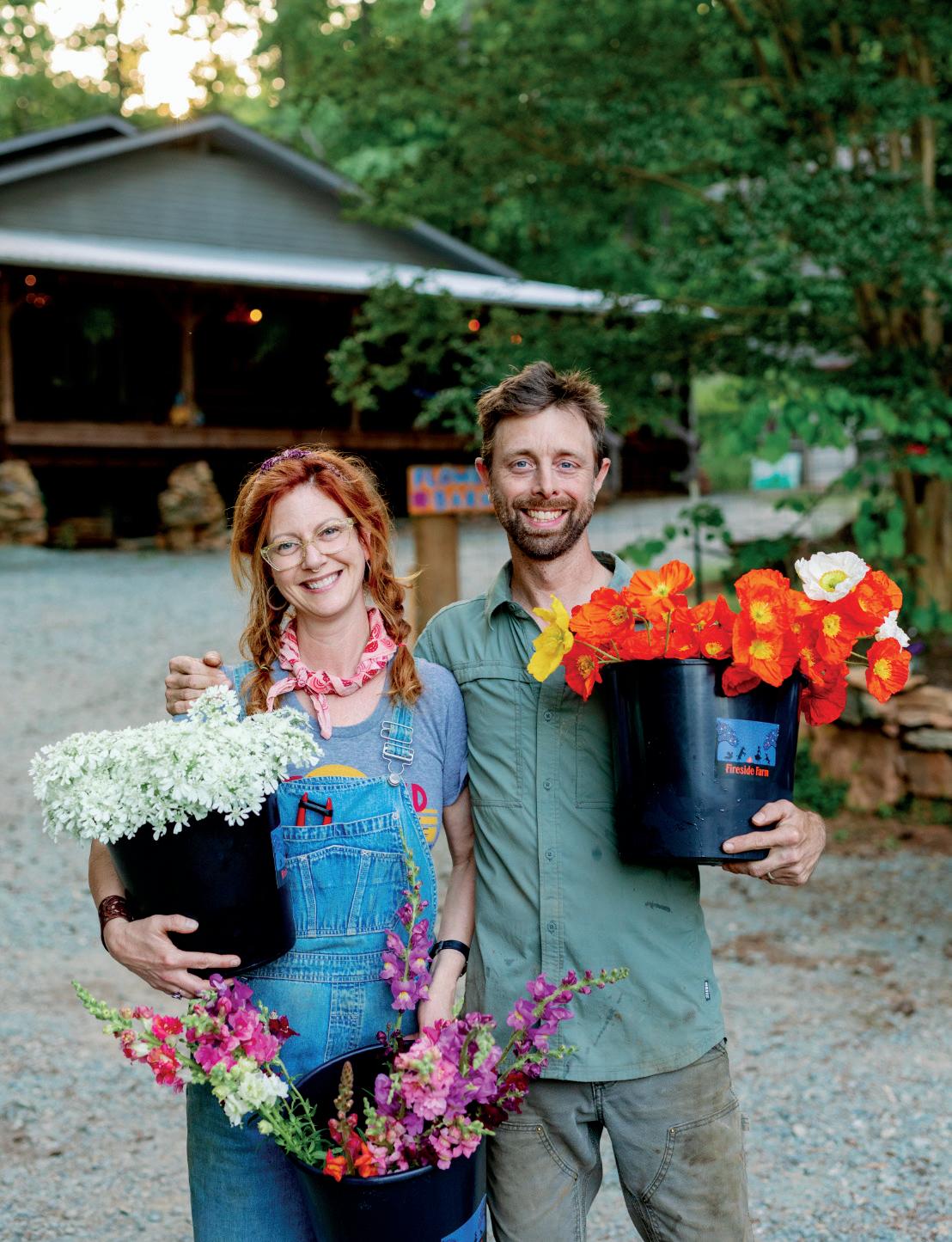
The April 2022 issue of Our State magazine included a sniff into the unique approach that Lisa Joyner ’89 is taking to wedding flowers. She and her husband, Randall Williams, own Fireside Farm — based in Efland, North Carolina — where they help couples design their dream bouquets and centerpieces, often with plants grown especially with particular couples’ visions in mind, and always sourcing locally.
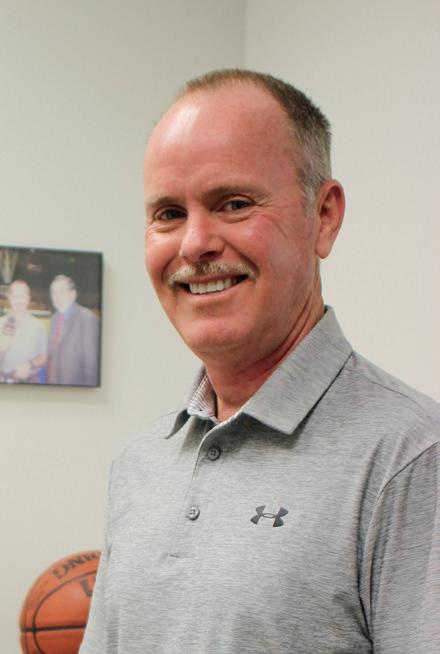
With his real estate company looking to expand on the East Coast in 2019, Ryan Stewart ’95 urged it to set up shop in Durham. Almost three years later, Stewart is back in the Triangle after years in Texas, and he is adding value to his hometown by launching a new office for Dallas developer Trinsic Residential Group. The group also has plans for expansions in Charlotte and Raleigh in the future.

Scan to read more in Triangle Business Journal.
Star-Studded Film ‘The Plus One’ is the Brainchild of Brendan Bradley ’01
He’s part entrepreneur, technological wizard, actor, writer, director, and if you visit Brendan Bradley ’01 on Instagram (@brendanabradley), you’ll see him wearing pretty much all of those hats, because a long-standing artistic collaboration came to life in April that resulted in him filming on location. Bradley fulfilled a journey that began in 2015, persisted during the pandemic, and is coming to fruition via a film called The Plus One with a cast that includes Ashanti and Cedric the Entertainer.

Scan to read more in Our State.
Bradley documented his filmmaking adventure during the shoot in Clearwater, Florida, where he said: “And now, here we are, on location making this film on the white sand beaches and every day is a new blank page with our brilliant director Erik White and the best crew in the world to approach each scene with fresh eyes and brains to every page and every line. I’ve been on this journey for over six years. If you’re in the middle of your next script, keep going. Your film family is on the other side.”
David Peters ’13 and Braxton Lloyd ’13 organized a golf outing this spring to celebrate Greg Murray’s 43-year career at Durham Academy.
Among the many hats Murray has worn during his four decades at DA are teacher, coach, advisor, Senior Challenge director and yearbook advisor. This summer, he heads to Colorado to finally become a full-time cowboy (fully accessorized with a brand new Stetson, a gift from the golf outing group) and enjoy his view of Pike’s Peak with his family.
The golf gathering included some blasts from the past including a host of alumni and former faculty: Randy Bryson, Jim Speir, PJ Toth ’88, Ben Rudnick ’02, Nancy Mountcastle Wall ’03, Rob Bressler ’03, Phil Bick ’05, Jack Bryson ’07, Patrick Costello ’09, Chris Merritt ’10, Matt Merritt ’12, Braxton Lloyd ’13, Maggie Mishra ’13, David Peters ’13, Elizabeth Hall ’15, Foster Harris ’16, Seth Pruitt ’17, Price Sneed ’17, Quade Lukes ’17, Allen Smith ’17 and Ethan Lukes ’20.
Read Murray’s reflection on his time at DA on page 66.
Anthony Roth Costanzo ’00 won a 2022 Grammy Award for Best Opera Recording on behalf of the team behind the production of the modern Phillip Glass opera Akhnaten. Costanzo, a countertenor, starred in Akhnaten at New York’s Metropolitan Opera. Costanzo was previously nominated for a Grammy Award for Best Classical Solo Vocal Album for ARC in 2019.

Scan to see some of Costanzo’s work.

Michael Savarino ’19
Michael Savarino ’19 was presented with the NCAA’s Elite 90 Award for men’s basketball on April 1 when his Duke team was in New Orleans for the Final Four. This award is given to the Division I athlete who has the highest grade-point average out of all the teams competing at the finals site for each of the 90 NCAA championships.
The award was given to Savarino during the Blue Devils’ open practice session at the Caesars Superdome. Savarino, a sociology major, had a cumulative 3.828 GPA in his third year at Duke. He is the first Duke basketball player to win the Elite 90 Award since it was first given out in the 2009–2010 season, but he is the second Durham Academy graduate to receive the award. DA alumna Mollie Pathman ’10 was honored with the award in 2011 when her Duke women’s soccer team was playing in the Final Four.
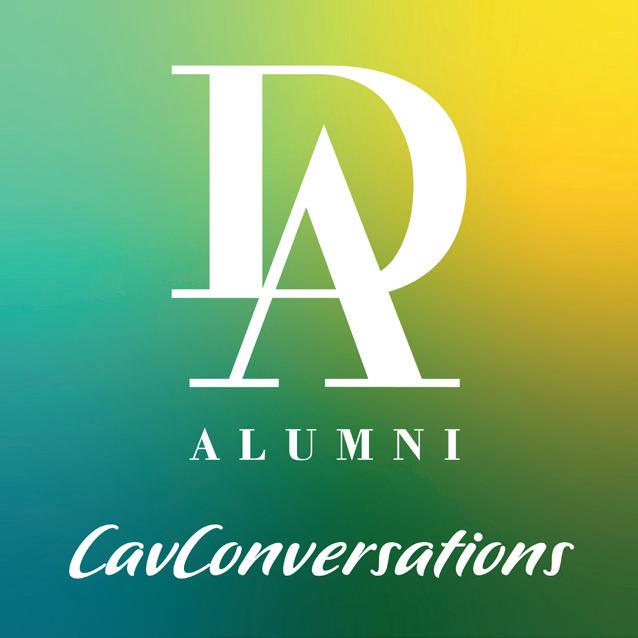
Need something to listen to on the commute home or while traveling this summer? Look no further than our first episode of CavConversations, an alumni-themed podcast created by Durham Academy Podcast Club hosts Taylor Winstead ’24 and Aarav Parekh ’24. The first episode includes conversations with DA Head of School Michael Ulku-Steiner, Durham Success Summit Founder and Executive Director Derek Rhodes ’11 and longtime Middle School history teacher and JV boys and girls cross-country coach Virginia Hall ’91.

Scan to listen to the podcast.
Allison Kirkland ’01, a Durham-based writer and writing coach/teacher, has been awarded a 2022 Ella Fountain Pratt Emerging Artists Grant from the Durham Arts Council. The program provides financial support to professionals in the arts by funding a project that is pivotal to the advancement of their careers.

In the eight years since graduating from Durham Academy, Tara Nagar ’14 has discovered a passion for computer science and engineering, made multiple cross-country moves and is now helping to reimagine the landscape of temporary labor. And on top of busy work lives, she and fellow DA alum Jason Lapidus ’15 are staying busy as new “dog parents” to Baci, their chocolate Labrador.
Q — What have you been up to since graduating from Durham Academy?
A — After graduating from DA, I didn’t go far from home and spent the next four years at Duke. When I graduated in 2018, I accepted a job as a software engineer at Fanatics in San Francisco, which was a job I was offered after spending the summer before my senior year as an intern (two other DA grads, MacKenzi Simpson ’16 and Spencer Jenkins ’16 currently work at Fanatics!). I spent the next 3.5 years there (with a year spent in Durham starting at the beginning of the pandemic) before moving to Miami at the beginning of 2022 to start a new job!
Q — What led you to pursue a career in computer science and engineering?
A — I actually did not take a computer science course until the second semester of my first year at Duke, but I had always been interested in math, languages and logic/ puzzles. That first intro-level course opened a door to a new world of my passions and gave me the tools to build things and solve problems.
I was then lucky enough to be part of a program called Duke Technology Scholars (started by Monica Jenkins, DA trustee and alumni parent!), which aims to encourage diversity in technology fields by fostering community and exposing scholars to a variety of experiences. Two key aspects of the program are providing scholars with support during their technology internship processes and enabling cohabitation with other scholars over summers. Between my junior and senior years, DTech helped me land as an intern at Fanatics and live with a group of 10 women from Duke who were doing various tech internships all across the Bay Area.
Computer science and engineering was a fairly new thing to me at the time, but the support and encouragement I received at my internship and through the DTech program gave me the confidence and skills to stay in the field after graduating from Duke.
Q — What drew you to taking the leap of moving across the country and helping to start a new company?
A — It was definitely an unexpected move! Our Chief Technology Officer/my boss at Traba was a coworker of mine at Fanatics, and he left in April 2021 to make the SF-to-Miami move himself to co-found the company. In July, another Fanatics coworker (who was also a DTech scholar with me) left to join Traba. So when the two of them reached out in December to recruit me as a Founding Software Engineer, I was excited by the opportunity to work with them again. Traba is committed as a company to working in-person in Miami as we build this company together to maximize our productivity and collaboration. Honestly, the decision to join the
company wasn’t an obvious one; it would mean leaving the friends and job I loved in San Francisco. Ultimately, I was drawn to the impact I would be able to make in the company and the impact that the company could have on the world. Traba is like an Uber for temporary labor, and we are building a marketplace that connects companies in the light-industrial space (events, warehouses and distribution centers) who are in need of temporary labor with the workers to fill those positions.
Part of the appeal of the job was the potential to positively impact the lives of these workers, many of whom are working paycheck to paycheck. Over the past four months, I have heard feedback from so many of the workers on how much they love Traba because it offers them opportunities to pick up shifts that work with their own schedules. As a result, they’ve been able to afford gifts for their families or to repair their car or to start a business with the extra income. We’re also providing labor to businesses and enabling them to maximize their productivity, so it’s exciting and motivating to be building a product that’s working in the best interest of all three parties involved — us, the workers and the businesses. All of my coworkers are committed and bought in to making Traba succeed and inspired and motivated by our mission.

“Ultimately, I was drawn to the impact I would be able to make in the company [Traba] and the impact that the company could have on the world.”
— Tara Nagar ’14
Finally, we’re backed by some of the most successful investors (early in Airbnb, Doordash, among others) so we’re motivated to succeed from many angles. We know that we can be bigger than Amazon and Facebook and make people's lives better while doing so. It was ultimately an opportunity I just couldn’t pass up! (We’re growing a lot and looking to hire quickly across the company in the next several months, so don’t hesitate to reach out if you want to chat or are interested in applying!)
Q — What are your interests away from work?
A — I love doing things outdoors and being active! When I was living in San Francisco, I loved being able to take advantage of all of the natural beauty in the area, whether it was going on a hike along the coast, going for a run to explore different neighborhoods, relaxing in a park or on the beach, or swimming in the bay. Since moving to Miami, I’ve enjoyed still being close to the ocean and being able to take walks or run along the water. I have a 9-month-old, water-loving chocolate Lab, so recently lots of things I enjoy doing outside of work involve him! I also enjoy cooking and baking, and often find myself trying a new recipe when I have free time or need an activity to de-stress.
Q — What’s next for you? Where do you see yourself in 10 years?
A — I’m committed to the long-term game with Traba, and our goal is to IPO after we’ve expanded nationally and ultimately internationally. For me, that hopefully means in 10 years I’ll have been a part of taking a company public and hopefully have lived outside of the U.S. helping with the expansions. However, I wouldn’t have said five years ago that today I’d be living in Miami, so anything can happen!
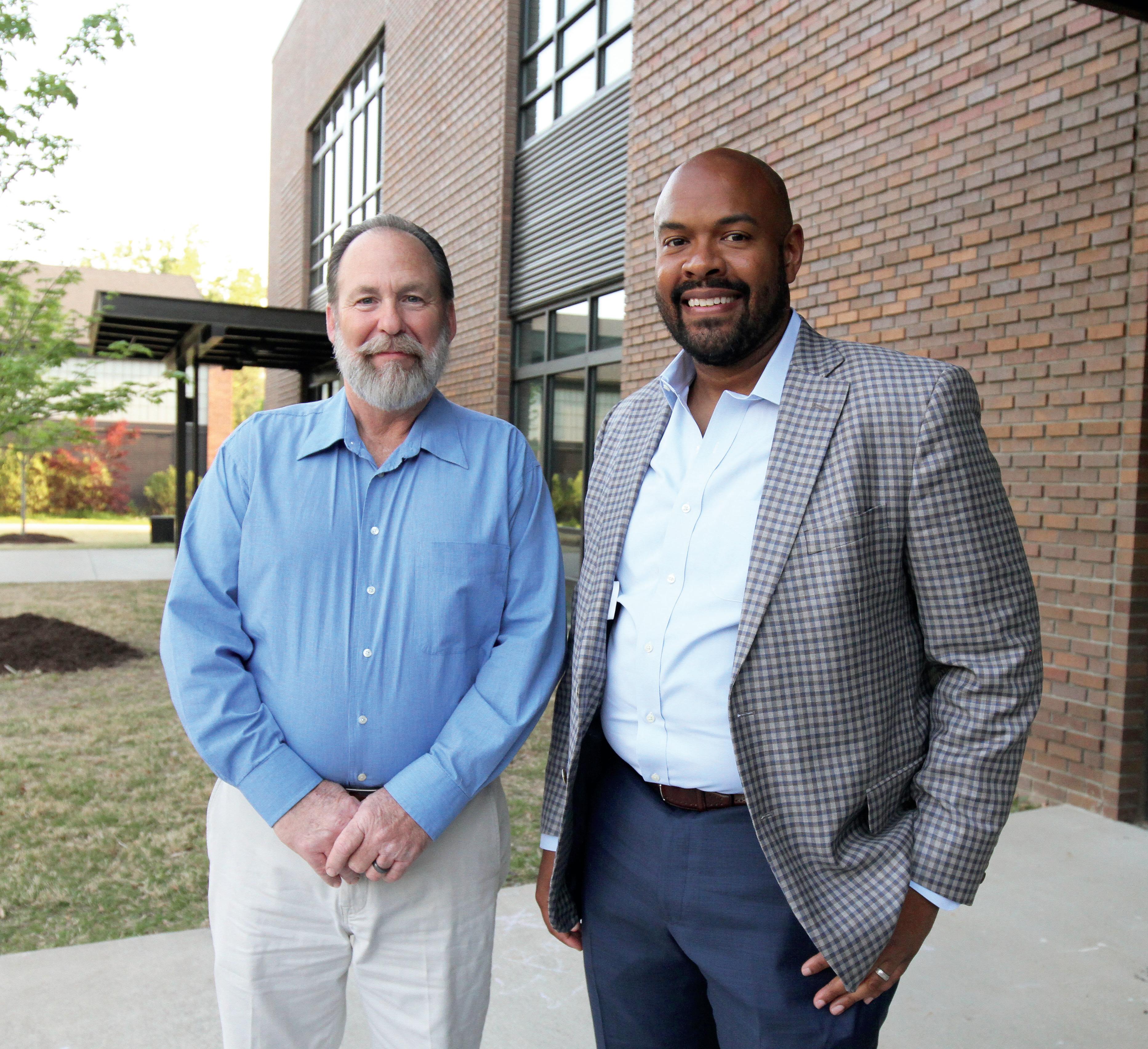
The Durham Academy alumni community gathered on April 29 to celebrate 2022 Distinguished Alumni Award honoree Dr. Bradley Hardy ’89, a labor economist and professor at Georgetown University, and Faculty and Staff Legacy Award recipient Randy Baker, who retired this spring after 41 years as part of DA’s maintenance team. The reception and ceremony, hosted in the Upper School quad and the Smith Hall assembly space of the STEM & Humanities Center, marked the first in-person DA alumni event since the start of the pandemic.

Scan to read more about both Hardy and Baker and to watch a recording of the ceremony.
“Given his meteoric rise in the world of economic policy research, none of us who know Bradley would be surprised to see his face someday on a $1,000 bill. … But at the same time, Bradley is remarkably humble, unassuming, down-toearth and kind. … Congratulations to Bradley Hardy, who has remained an all-around nice guy and who has distinguished himself both personally and professionally as a force for what is good and right in the world.”
— Michael Ulku-Steiner, head of school
“I come from the vantage point of being a college professor now, so I have a lot of students coming through, and I think I see some of what works and what doesn’t. I think that DA provides a safe learning environment, both emotionally and physically. So you can take chances, push yourself physically and intellectually. And you can dust yourself off at the same time. … DA was all about effort and teamwork, the importance of a collective effort.”
— Dr. Bradley Hardy ’98
“Can you imagine how Durham Academy would be different — how many of us would all be different if [then-DA business manager] Jim Horner hadn’t changed his mind and just followed his instincts on people and hired Randy Baker 41 years ago? … I’ve been at every event where the Durham Academy Faculty and Staff Legacy Award has been presented. I’ve worked closely with all of the former recipients. All of the former recipients are my friends, and they’re all talented and excellent and deserving. But I can say no one has deserved this honor more than Randy Baker.”
“I learned quickly that working here, you didn’t just become friends, you became family. This was reinforced when my daughter Katie went to school here, with all of the wonderful teachers she had. I have many wonderful memories over the years … The one that really touched me the most and that I will remember always, is helping the Preschool incubate the eggs. It was a lot of fun. And the joy on the kids’ faces when the chicks hatched was amazing, it just touched me.”
— Randy Baker, retired DA foreman
STORY BY GREG MURRAY, UPPER SCHOOL PHYSICAL EDUCATION TEACHER, GOLF COACH AND DIRECTOR OF SENIOR CHALLENGE
Greg Murray retired this spring, closing the book on 43 years at Durham Academy, among the longest tenures in the school’s history. Over the course of those four decades, he served as a physical education teacher, multi-sport coach, yearbook advisor, photographer, Senior Challenge director, lead class advisor and inducer of laughter and smiles everywhere he went.
It’s not every day that you get the chance to say a collective “thank you” to an entire community. My connection with Durham Academy began back in 1979 when Rob Hershey, then head of school, believed in and trusted in me enough to hire a first-year teacher and coach. As I began my career, I had the good fortune to have incredible mentors, many of whom are still close friends 43 years later. How many people can say that? I was given the opportunity to pursue my passions while learning from the best. I actually started my coaching career at DA on the gridiron. Yes, I have been around long enough to say that I coached football at Durham Academy!
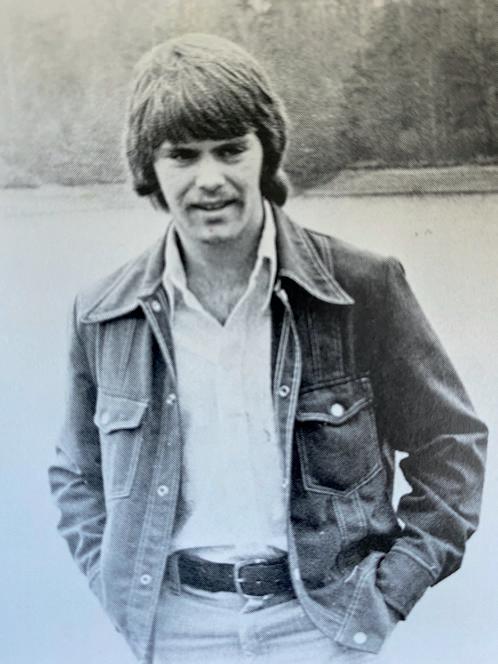
Robert Hallyburton ’82 parent of Julianna ’22, Scott ’18 and Spencer ’14 was the quarterback. A lot has transpired in the 40 years between Robert’s and Julianna’s graduation days!
My first love has always been basketball. I was given the opportunity to coach the junior varsity boys team for several years before taking over the varsity girls program following the infamous Dave Gould [the former Upper School history teacher and 2012 Faculty/Staff Legacy Award winner passed away in 2016]. One of the many highlights of coaching those incredible young women was a magical run in 1992. The N.C. Independent Schools Athletic Association (NCISAA) tournament was held on the UNC-Chapel Hill campus at Carmichael Auditorium,
where a team anchored by senior Liza Zug Cox ’92 defeated the defending champs, Charlotte Latin School, to win our first state championship. A ninth-grader, Katie O’Connor ’95, scored 17 points in the final, setting the stage for an All-American career. She, along with teammates Ryan Hardaker LaForce ’94 and Becca North ’94, repeated as state champs together in 1994. The experience gained in coaching these girls definitely set me up to win as a dad of daughters! The added bonus was that our favorite babysitters were marvelous role models. For that, I could not be more grateful.
Of course, most know me now as the coach of DA’s varsity boys and girls golf teams. I have been blessed with so many passionate, hardworking, dedicated players over the years. My best role as coach has been as a psychologist/cheerleader because, to be honest, we were extremely successful because those players were much more gifted and talented than I was! A favorite memory came in 2004 as Bryce Mueller ’04 set the tone by demanding that the guys join him for offseason workouts. During the cold of winter, he pushed them to face the elements to practice when others were enjoying the warmth indoors. When the season began, he insisted that their work would make them unbeatable, and he was right. His example inspired a young team to Durham Academy’s first state championship in golf.
During that same era, there were few opportunities to play team golf for girls. Nancy Mountcastle Wall ’03 boldly stepped onto the tee to play on the DA boys team. She played from the same tees and was one of our leading scorers. That experience prepared her to play collegiately, and she became a mainstay in the lineup at N.C. State University! Walker McLear ’09 followed in her footsteps a few years later, competing with the guys. Little did they know that the seed that they had planted would grow into the dominant girls golf program that we have today.
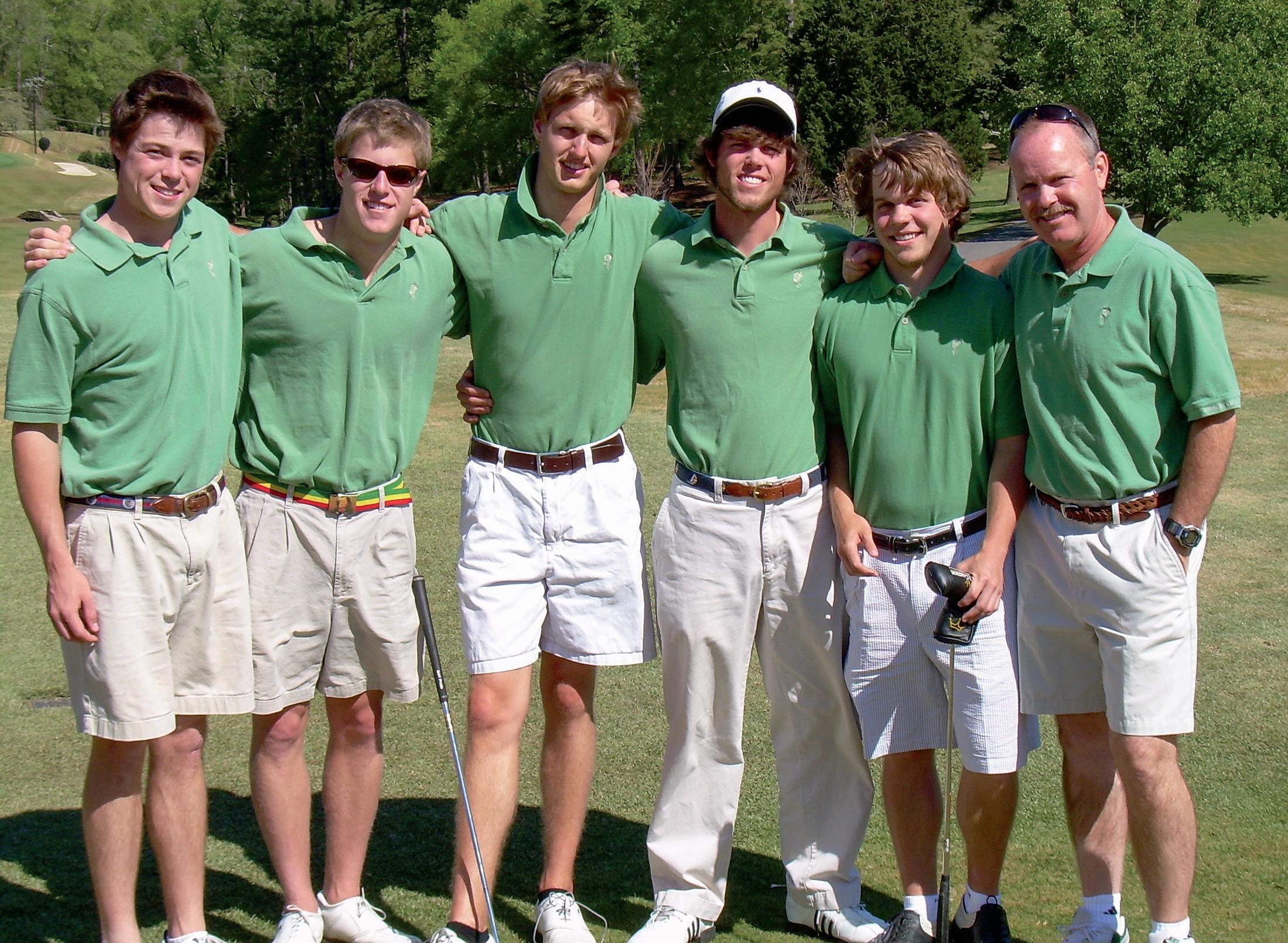
Samantha Lanevi ’14 and Christen Howlett ’14 came to me after class one day back in the spring of 2010 to ask if I would be willing to coach a girls golf team. Their passion became a reality, and over the last 11 years, the team has finished top three in the NCISAA six times!
Having taught at some point in all four divisions, I was able to develop a better understanding of child development, and that knowledge paid tremendous dividends as I became a husband and father. Over the years, my wife, Deb, and I had offers to leave for other jobs, but we ultimately decided that Durham Academy was absolutely the best place for our children to thrive.
Our daughters, Erika ’09 and Mariel ’11, attended DA from pre-kindergarten through graduation. The gratitude we have for the love, care and support that they received from their teachers and coaches is immeasurable. They learned how to organize, to prepare, to study and to write skills that helped them to become the accomplished women that they are today. From being a part of the Fabulous First Grade Explorers and the Lang Gang to performing on stage in musicals, In The Pocket, and the XIV Hours a capella group, they were able to explore a variety of experiences that built confidence and strength that they may not have gotten anywhere else. They competed together to win field hockey and lacrosse state championships, but their most fond memories are the road trips and the fun and laughter with teammates and their amazing coaches along the way. The Durham Academy “village” helped us to raise our children.
In many ways, the DA village helped to raise me, too! I was surrounded by the best of the best faculty and staff members. What they have taught me is immeasurable. The folks on the maintenance staff are my heroes. The support staff behind the scenes are the backbone of the school. There are incredible people at every turn. Thanks to them for taking such good care of me and my family!
Of course, I cannot write about my most fond memories at DA without mentioning Senior Challenge, the longest continuous tradition at DA. The experience offers a challenge that is unmatched, and it involves a shared experience by an entire class. The fact that I have been able to hike with decades of students and some of my closest friends has been the best way to begin each year! I can’t wait to hear about the adventures of my fantastic advisory group, which will take the challenge this fall.
Every single day, I was astounded by the depth and breadth of our students. They are creative, caring, talented, diverse and inspiring. The joy of observing them pursue their passions motivated me to do the same. The opportunity to coach sports that I love with kids that I love has been icing on the cake. As I move to my next stage in life, the relationships I have built with my students especially my players, advisees and their families are what I will miss most.
The fight against cancer is what drives Dr. Kameron Kooshesh’s career as a young doctor. And cancer is what brought the 2012 Durham Academy graduate from California to Duke Medical Center for treatment when he was a preteen, leading him to enroll as a part-time student at DA as an eighth-grader.
“I was out of school for sixth grade and seventh grade. My parents were teaching me while I was in the hospital,” Kooshesh said. “All I wanted was to go back to school and have friends again, be a normal kid again.”
When his parents inquired about the possibility of Kooshesh attending Durham Academy, the school welcomed him, encouraging him to come when he was able and do what he could. Kooshesh has never forgotten what that meant to him and how it impacted his life.
“It was so much fun,” the newly minted medical doctor said as he remembered his eighth-grade self. “I got to know the community, how nice the students were, how incredibly welcoming the teachers were. There was nothing like the intellectual rigor that I encountered in [DA] Middle School — California was far different. It was such an incredible community, so obviously I wanted to stay for high school.
“When I got to the Upper School, I found immediate groups of friends that have still stuck with me throughout life. People who were extremely interested in math, science,
“That experience, that idea that you could have an impact as both a scientist and a physician in somebody's life and save them. This was the difference between life and death for me.”
— Dr. Kameron Kooshesh ’12
Story by Kathy McPherson
history, and that was fostered and truly taken to its fullest extent by the wonderful teachers and advisors I had.”
Coming to Durham Academy marked the resumption of a life that had been cruelly interrupted.
Kooshesh was 9 and about to finish third grade when he was diagnosed with acute lymphoblastic leukemia. He endured three years of chemotherapy with good results in California, then suffered a relapse just as he was completing treatment. His prognosis was poor until his family learned Kooshesh was a perfect match for a bone marrow transplant. They decided to bring him to Duke for the transplant and Kooshesh was doing well until he developed graft-versus-host disease, a life-threatening complication with the immune system of the bone marrow donor fighting with the body of the bone marrow recipient.
When steroids were not an effective treatment, Kooshesh’s Duke transplant doctor was left with few options. Knowing there was an ongoing national trial of a treatment that might help, she appealed to the FDA for a compassionate-use exemption of the drug remestemcel-L, an experimental stem cell treatment. The request was approved, and the stem cells Kooshesh was given calmed the debilitating inflammation the graft-versus-host disease was causing. The infusion of stem cells gave 14-year-old Kooshesh back his life, piquing an interest in stem cells and setting him on a path to becoming a hematology oncologist .
“That’s cutting-edge science that is really exciting, and demonstrates the promise of stem cell therapeutics treating and advancing the standard of care in areas in which we are relatively still in the Paleozoic area. It was really ahead of its time when I had it, and it’s still very much cutting edge,” Kooshesh said of stem cell therapeutics.
“That experience, that idea that you could have an impact as both a scientist and a physician in somebody's life and save them. This was the difference between life and death for me, as called by my transplant physician, and was something that isn't widely available yet. It worked for me, but not other people. And so why was that? I really wanted to understand about this and also learn about and be able to contribute myself to the stem cell therapeutics that could be so life-changing.”
As a Harvard College undergraduate, Kooshesh’s studies concentrated on human developmental and regenerative biology, which he said “essentially equates to stem cell biology.”
And after graduating from Harvard cum laude in 2016, Kooshesh’s interest in stem cell therapeutics spurred him to take gap years between undergraduate and medical school. He spent two years working on a project about the cell cycle at Harvard’s Brigham and Women’s Hospital, focused

on “how different cells essentially go through division, and how that can become cancerous. I was developing a new way of thinking about how cancer cells divide, and what we can do to interfere in that process and therefore prevent cancer from spreading.”
The interest continued through Kooshesh’s four years in the prestigious Harvard-MIT Program in Health Sciences and Technology, a collaboration that had him taking an intensive class load at Harvard Medical School along with basic science classes at the Massachusetts Institute of Technology.
“Essentially you do a Ph.D.’s amount of learning and also a medical degree at the same time,” Kooshesh explained.
He graduated magna cum laude from Harvard Medical School on May 25, with a soon-to-be published senior thesis on how the immune system ages as people age, why that happens and what can be done about it. In a thesis project overseen by Dr. David Scadden, a hematologist/oncologist at Massachusetts General Hospital, Kooshesh “conducted a retrospective cohort study of thousands of patients in the Harvard health care system to understand how people encounter more malignancies, more autoimmune diseases as they age and why that is. And we linked that to an organ that is very poorly studied in human biology, the thymus.”
Kooshesh saw that immune cells are severely abnormal in patients who do not have a functioning thymus. “That points to an understanding of why it is that the immune system ages at different paces in different people, and why that can predispose someone to developing a malignancy later in life or developing an autoimmune condition later in life,” he explained.
A second part of the study identified a cell in the thymus that is somewhat like a stem cell. “What we are trying to do is develop a stem cell therapeutic to essentially rejuvenate, regenerate the thymus in people as they age, that prevents them from developing malignancy, prevents them from developing autoimmune conditions.”
Kooshesh said his work in the lab of Dr. Scadden “is applying the basic principles of stem cell biology to hematologic malignancy, to understanding cancers like they are errant stem cells, and building our framework for how to then treat those cancers like stem cells gone wrong. That is such an exciting and groundbreaking means of looking at cancer, and from that understanding how we can use stem cells to treat hematologic malignancies.”
The driving passion he feels for his work links back to remestemcel-L, the experimental stem cell treatment he received at Duke in 2009 for graft-versus-host disease. Kooshesh’s transplant physician asked him to speak at an August 2020 FDA hearing that led to the drug being approved and becoming widely available. “It’s really one of the frontline therapies on the market. It's such an incredibly game-changing therapeutic because it demonstrates the power of stem cells in treating this kind of disease,” Kooshesh said in explaining the drug’s significance.
Kooshesh said medicine is doing incredible things for children, like his transplant physician did in advocating for him to get stem cell therapy, “and I want to make sure that we can do the same kinds of miracles for adults as well.”
That path will take Kooshesh through three years of internal medicine residency at Massachusetts General Hospital and then a fellowship in hematology oncology. He will be 33 years old when he finishes his training and is an attending physician in hematology oncology.
“My hope is also to be involved in research like I am now — in both clinical research and basic science research — and a lot of that passion was spurred out of my DA days,” he said.
Kooshesh said it was Durham Academy teachers who inspired a love of Latin language and Greek and Roman tradition in classical literature, who gave him an incredible grasp of the humanities, who encouraged him to do an independent study in biology, who whetted his interest in music and photography, who served as a father figure when his own dad needed to stay in California.
“That is something that has stuck with me and is very important. The way that you can conceive of and solve big problems is to really take a step back and think philosophically about the problem, to think about these things in both a human, as well as a philosophical, problem and that you apply to the science,” Kooshesh said.
“And that keeps you seeing it as something that is not just a nuts-and-bolts problem that nobody outside of the field can understand, but makes it immediately human and immediately relevant for improving the lives of people because that’s the goal of our science and that's the distinct honor of being a doctor.”

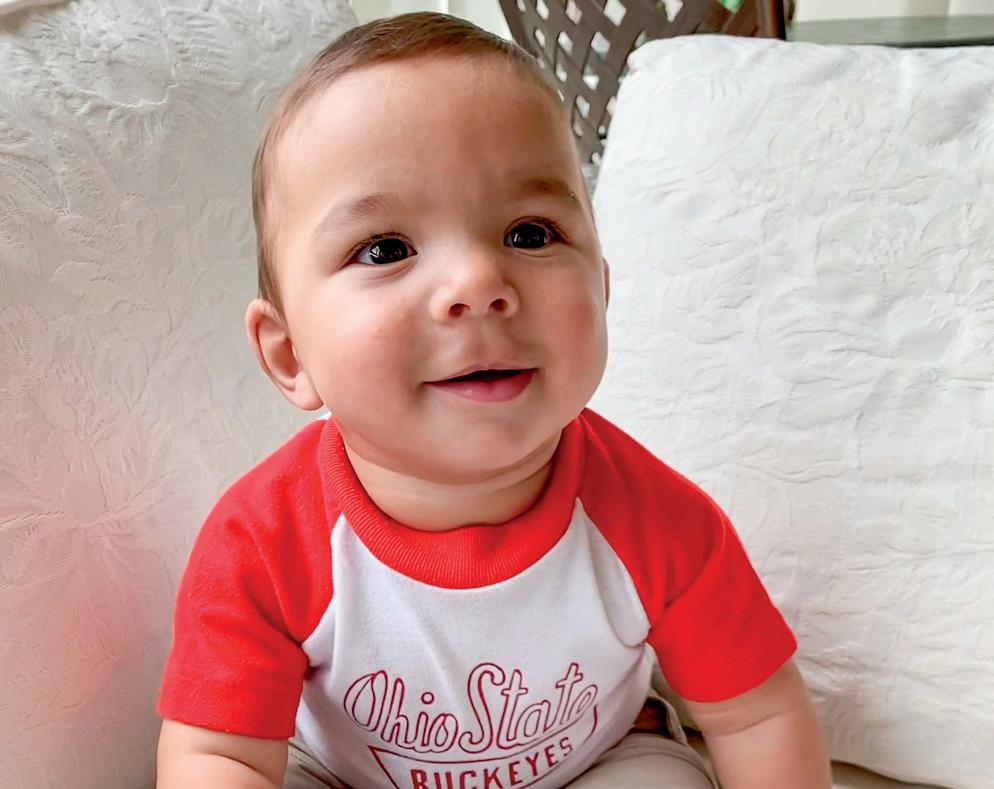

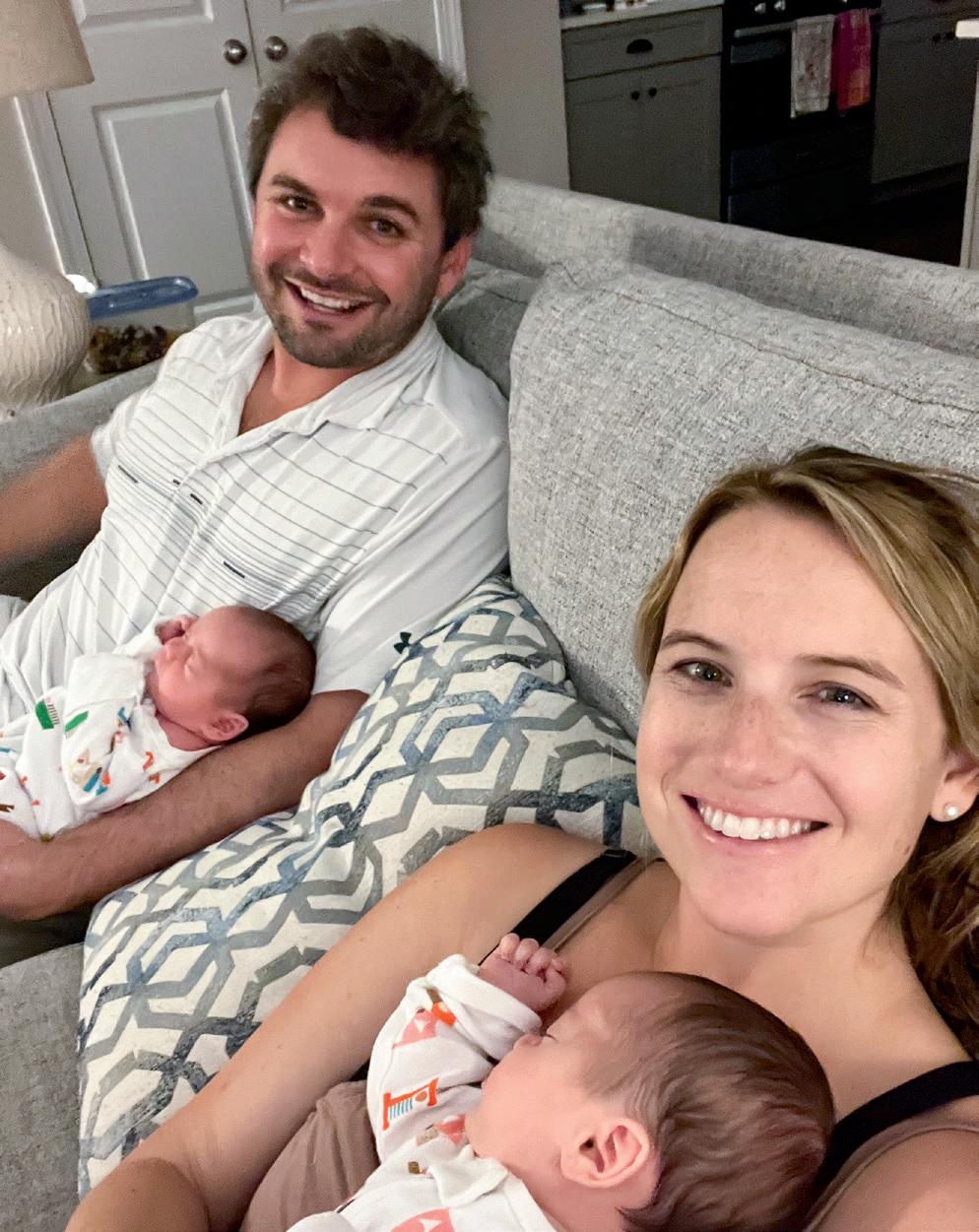
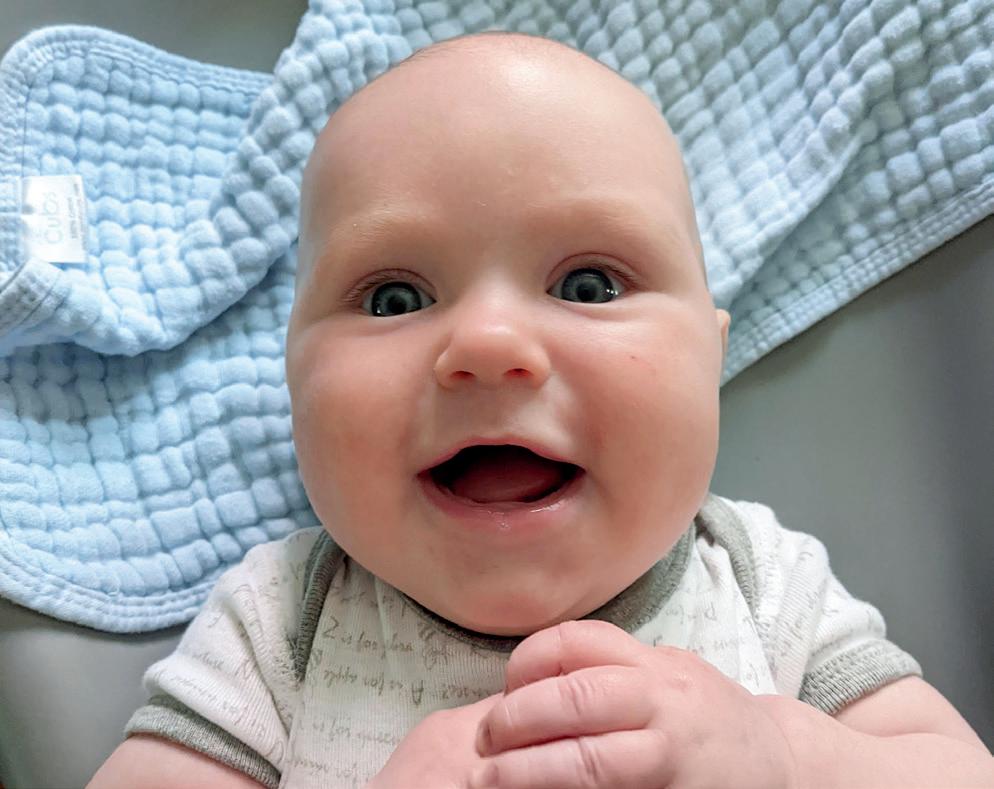

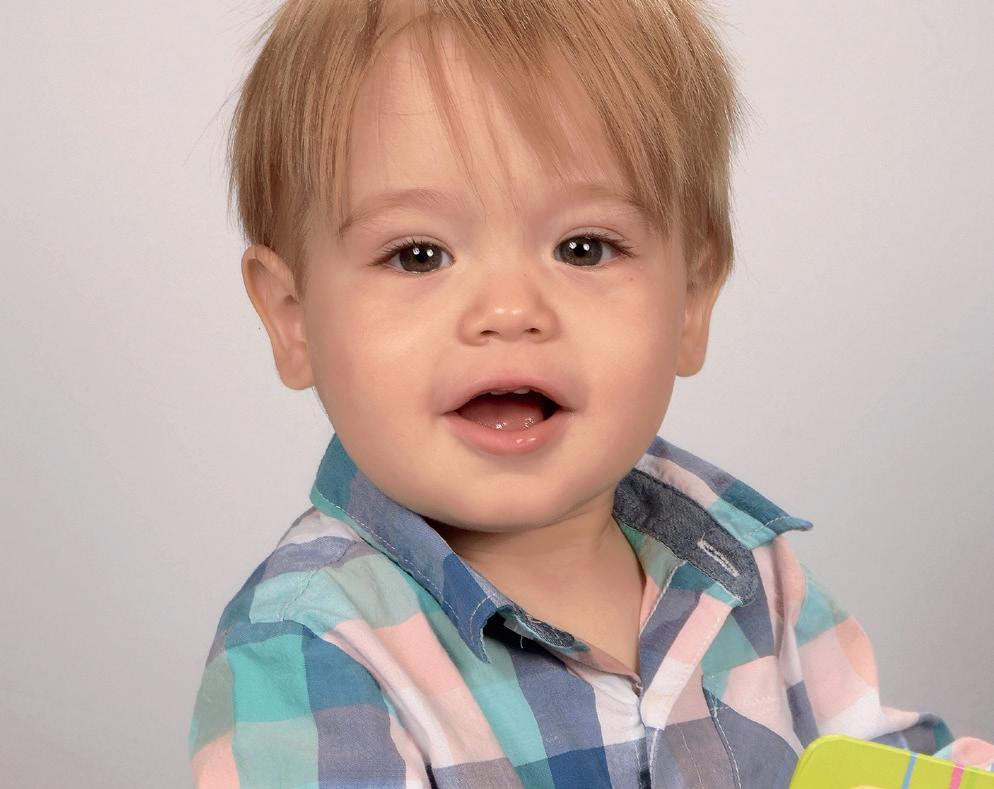
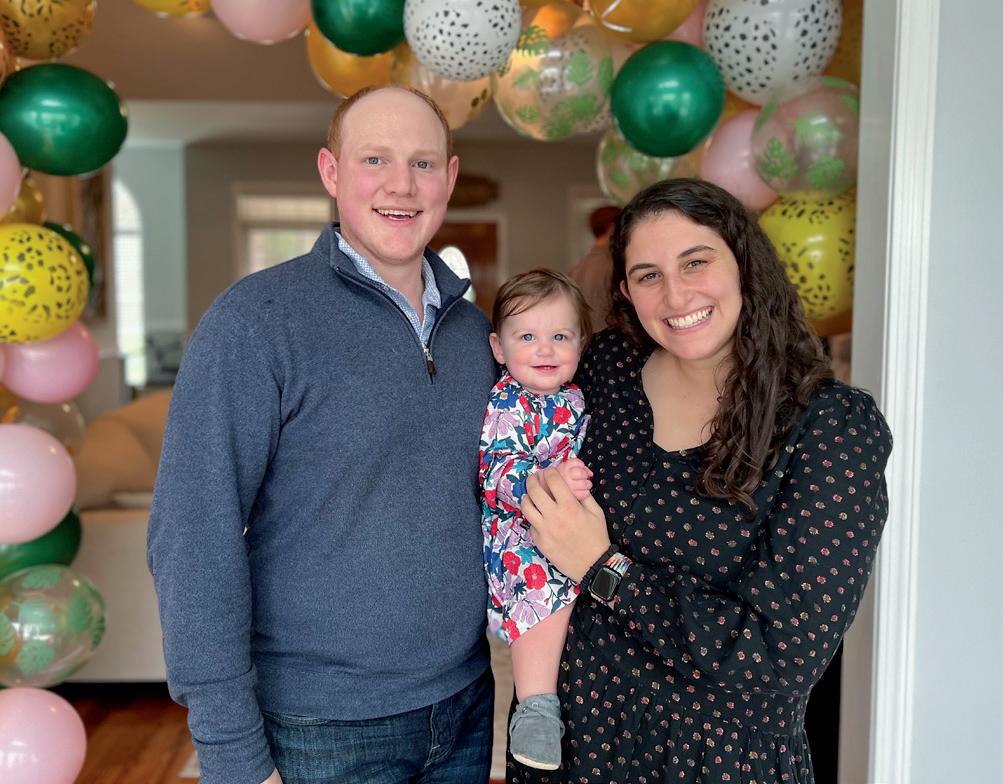
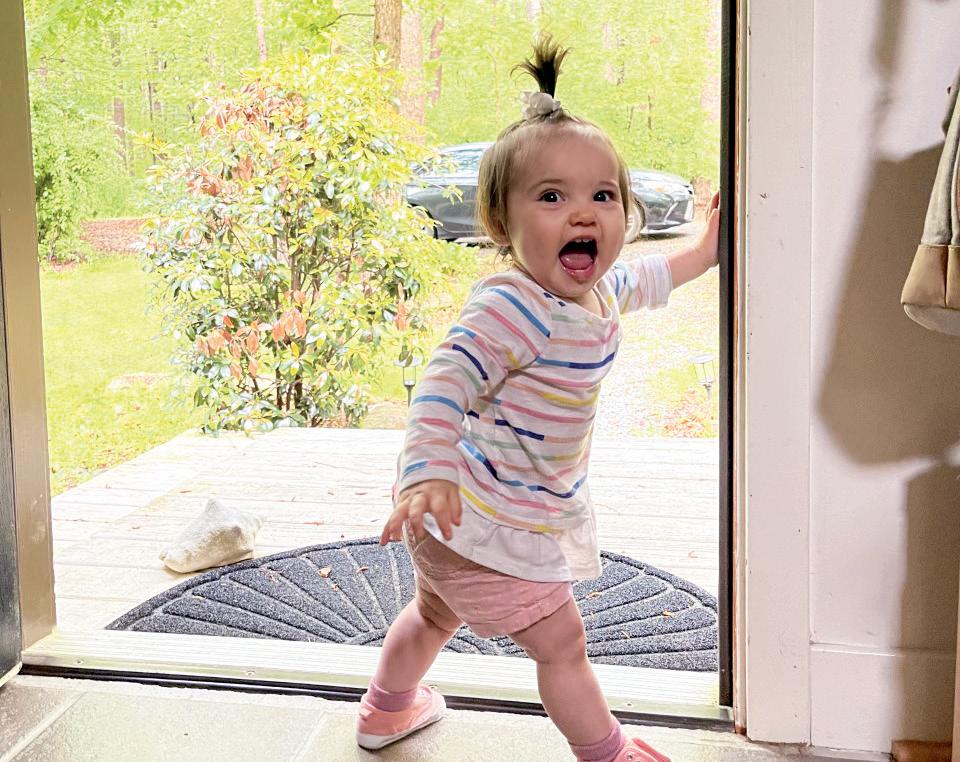
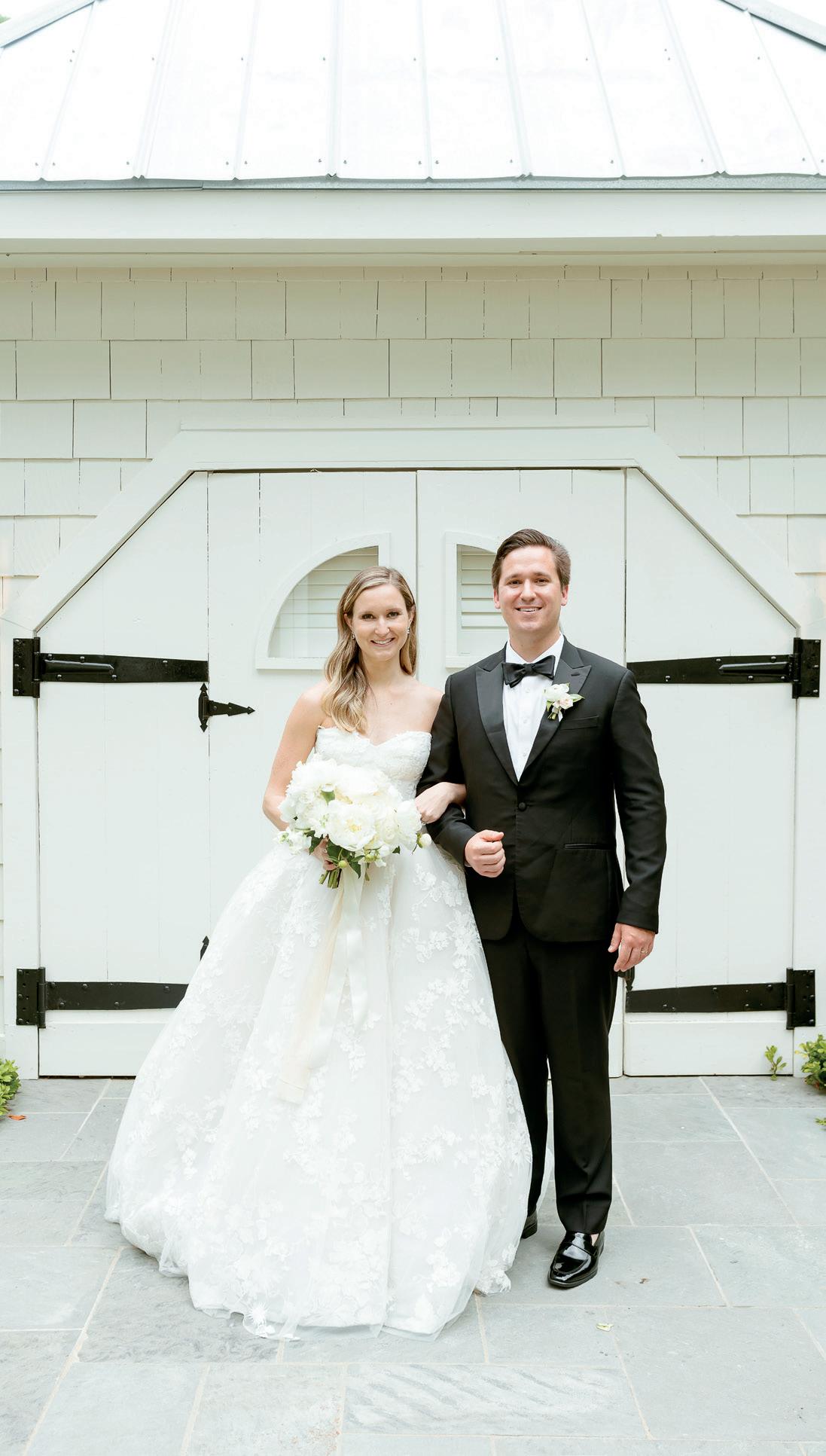
and David Fowler
May 28, 2021
Highlands, North Carolina
Former Durham Academy Middle School faculty member Elizabeth “Ki” Shinnick Caldwell died Feb. 26, 2022. A lifelong educator, Caldwell also taught at Collegiate School in Richmond, Virginia; St. John’s School in Houston, Texas; and Trinity School of Durham and Chapel Hill. She was awarded the W. Bryan Trammel, Jr. Chair in English at St. John’s School and was a beloved teacher whose wit, passion and creativity inspired more than 1,000 students over the course of her career. Caldwell, who was born in Richmond, was a graduate of Mary Baldwin College in Staunton, Virginia, where she studied English and psychology. She earned her master’s degree in education from the University of St. Thomas in Houston and moved to Durham in 1993 with her husband, the Rev. Martin Caldwell, who served as an interim minister at various Durham and Chapel Hill area Episcopal churches. She is survived by her daughter, Whitney Bray Vaughan, and stepdaughters Jennifer Vogel and Rebecca Fowler.
Former Durham Academy trustee W. Charles “Charlie” Witzleben died March 4, 2022. Witzleben was the founder and principal of Witzleben and Associates, a fundraising and public relations firm serving higher education, independent schools, health care, arts, social service and faith-based organizations. The firm served more than 150 clients, helping them reach fundraising and capital campaign goals ranging from $2 million to $1.3 billion. Witzleben’s career in philanthropic work spanned 45 years, including senior development positions at Emory University, Mercer University and Durhambased fundraising consulting firm Ross, Johnston, and Kersting. Witzleben retired in December 2019. He served on and chaired various boards, including The Hill Learning Center, Sarah P. Duke Gardens, Durham Central Park and Mercer University College of Liberal Arts. Witzleben earned a bachelor’s degree from Mercer University and completed graduate work in business at Georgia State University. He is survived by his daughter Hilary Witzleben Taylor ’97 and son-in-law Carson; grandsons Vaughn and Hugh Taylor; son Clark Witzleben ’07 and daughter-in-law Katy; former wife Karen Witzleben; brothers Larry and Fred; as well as nieces and nephews.
Former Upper School teacher Jennie Harris Wallace died on April 11, 2022. Wallace’s love of the arts, literature and language arts began as a student at Raleigh's Broughton High School. She attended Hollins College in Roanoke, Virginia, and pursued an advanced degree at University of Oxford in England. When Wallace returned from England, she began a 27-year teaching career at Durham Academy, sharing her love of language and literature with her students. As a person who immersed herself in music, opera, theater and chorus, Wallace was a firm believer in the power of music. For the past decade, she served as a North Carolina Symphony Society trustee, leading the symphony’s education committee to ensure that thousands of children in North Carolina would have access to music education and supporting talented young musicians. She is survived by her niece, Katherine Wheeler Wallace and husband Mark; their children Kyle, Lili and Jack; and nephew William D. Wallace and son Dylan.
Egbert “Bert” Lynch Haywood, Jr. ’57 died on April 28, 2022. He practiced law with his father and brother at the firm his father founded, Haywood, Denny & Miller, LLP, in Durham. Haywood was also an entrepreneur who engaged in real estate development and owned a Teleport (a ground station designed for communication with satellites) in California. He earned his undergraduate degree from the University of Colorado, serving in the Naval Reserve Officers Training Corps while in college. After graduating, Haywood served as a first lieutenant in the U.S. Marine Corps 1st Marine Division from 1961–1963. He earned a law degree from UNC-Chapel Hill. Haywood also served as a missionary and hospital chaplain, and he was an active Rotarian and member of the Society of Cincinnati. Haywood is survived by his wife, Joanne; her children Soyanne Mansfield, Juan Francisco and Carolina Muzard; his brother, John Davis Haywood ’63 and sister-in-law Mary Fry Haywood; and his nieces and nephews, Mary Lewis Haywood ’98, John Davis Haywood, Jr. ’00, Robert Edmunds Haywood ’00 and Betsey Haywood Dillon, and their spouses and children.
Join us on Friday, Dec. 3, at 6:30 p.m., in Kirby Gym as we welcome a new class to the Durham Academy Athletic Hall of Fame of Fame during halftime of the varsity boys basketball game vs. Charlotte Latin School.
• Tom Beischer ʼ87
• Joe and Ann Carole Moylan (posthumous)
• Cha'Mia Rothwell ʼ16
• Adrianne Soo ʼ09
• Erika Streck Cerwin ʼ98
• Justin Warren ʼ15

Scan to learn more about the honorees.
2022–2023 Alumni Board
Meredith White Howell ’97, President
Kirsten Vollmer ’87
Brian Vick ’90
Bradley Hardy ’98
Molly Shaw ’98
Catherine Clark Everson ’02
Nina Borges ’03
Nick Wisner ’06
Natalie Sutton Alvarez ’07
Rob Kirkland ’07
Derek Rhodes ’11
David Peters ’13
Khari Williams ’14
Joia Freeman ’14
Jason Lapidus ’15
Benny Klein ’20








149 First-Time Donors 188 Parents of Alumni Donors
$419,178 Raised on Giving Day 344 Alumni Donors
$295,538 Raised by Current Parents 204 Faculty and Sta Donors


$45,234 Raised by Grandparents
$40,000 Unlocked 1,095 Donors da.org/givingday


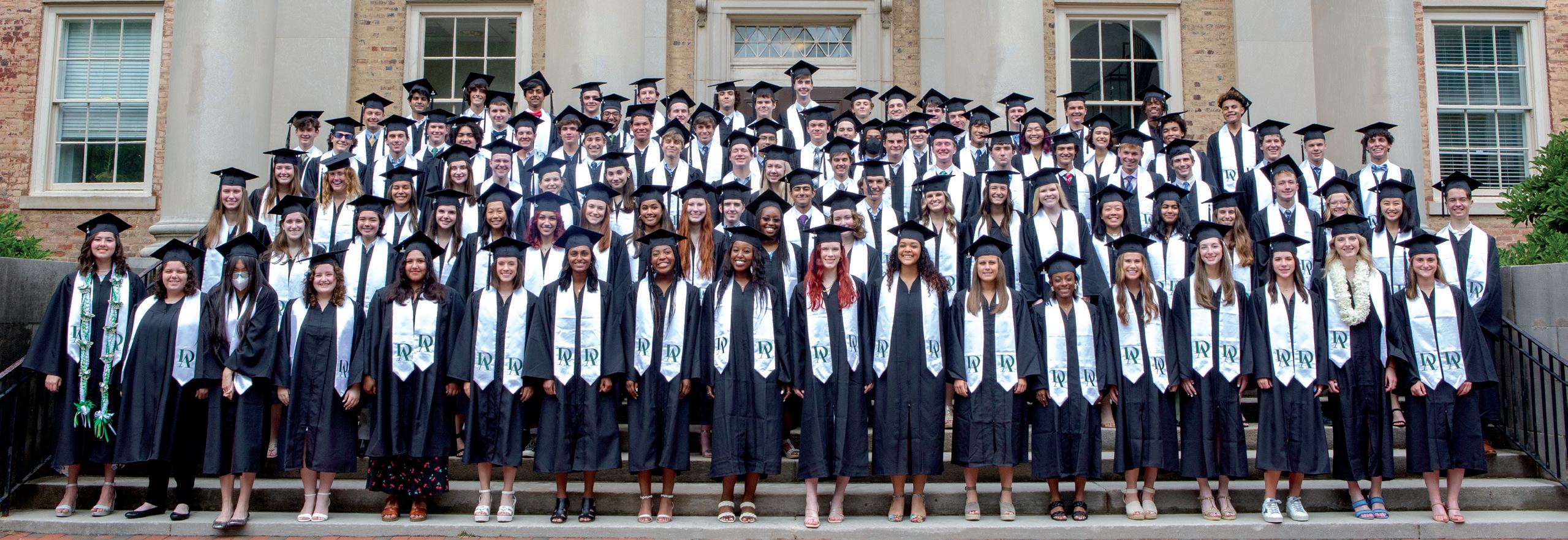
We wish members of the Class of 2022 continued success at the following colleges and universities:
American University
Appalachian State University
Babson College
Baylor University
Boston College
Boston University
Brown University
Bryn Mawr College
Carleton College
Case Western Reserve University
Chapman University
Colgate University
Dartmouth College
Davidson College
Duke University
Elon University
Embry-Riddle Aeronautical University
Emory University
Florida International University
Georgetown University
Georgia Institute of Technology
Gettysburg College
Harvard University
Haverford College
High Point University
Kenyon College
Loyola University Chicago
Middlebury College
New York University
Northeastern University
Ohio Wesleyan University
Pennsylvania State University
Princeton University
Purdue University
Reed College
Skidmore College
Smith College
Swarthmore College
Sweet Briar College
Syracuse University
The Catholic University of America
The New School Parsons
School of Design
The University of Texas at Austin
University of California, Santa Barbara
University of Georgia
University of Miami
University of Michigan
University of North Carolina at Chapel Hill
University of North Carolina at Charlotte
University of North Carolina at Greensboro
University of North Carolina at Wilmington
University of North Florida
University of Notre Dame
University of Pittsburgh
University of Richmond
University of Southern California
University of Tennessee
University of Tokyo
Vanderbilt University
Vassar College
Villanova University
Virginia Polytechnic Institute
Wake Forest University
Washington University in St. Louis
Yale University